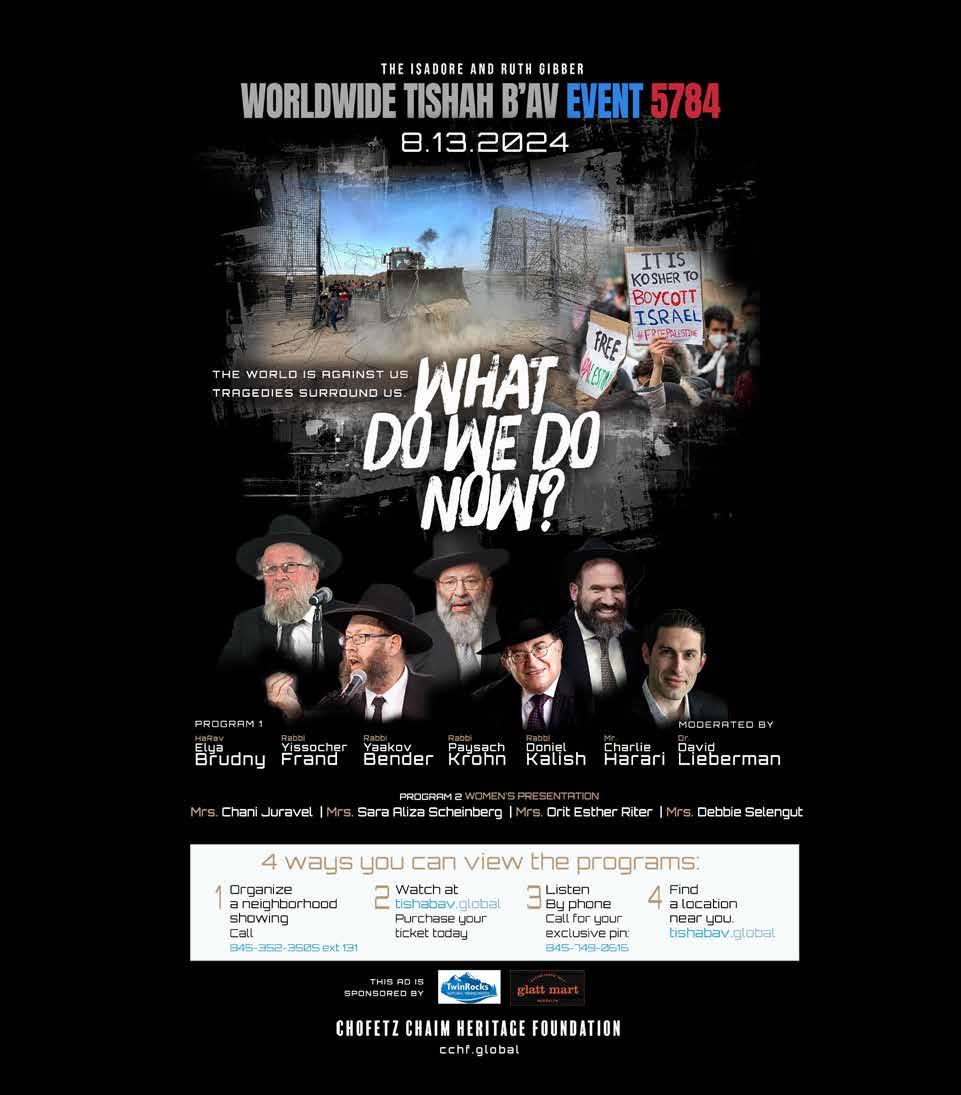


























AIt’s hard to fully comprehend the enormity of the Churban, for an individual to fully grasp the magnitude of the destruction of the Beis Hamikdash and the pain of the Shechina in galus.
On Tisha B’Av, we try. We attempt to think about what we’re missing. We struggle to connect our personal pain with the losses that our nation experienced millennia ago and are still feeling today. But it’s hard. We are so many years away from the Churban, and we’ve been living in galus for so long. As Jews who have been disconnected for generations, can we fully feel the sharpness of the pain or has it been dulled from so many years apart?
We know that every heartache we experience is a part of what the Shechina is experiencing in this galus. And so, on Tisha B’Av, we think about the sorrows that we experience. We think about the struggles that we go through, the pain that we feel, and we connect that hurt to that of our nation’s anguish.
But we know it’s just a part of the pain of the Churban. We know it’s just a particle, a speck, a fragment, a shard of what the Churban truly is.
The only way out of this galus is through achdus, we are told. The Beis Hamikdash was destroyed because of sinas chinam, and so, as an antidote to that transgression, we are urged to love our fellow Jew and to embrace him or her with warmth and understanding. When we love another, when we truly feel they are our brothers and sisters, our hearts open to them and we are able to connect with them on a deeper level.
We are able to feel their joys and their sorrows, their happiness and their hurt. Their pain becomes our pain; their joys become our joys.
On Tisha B’Av, as we gather together as a nation, we can share each other’s pain. We can experience the sorrows that they feel. We can palpably sense their sensitivities and their hurt. And when we connect with each other, we can gather the fragments of pain that we each feel and can use it to try to grasp the pain of the Shechina. When we feel each person’s suffering, we can use it to attempt to comprehend the magnitude of the suffering of the Shechina.
Recently, a relative of mine visited a soldier in the hospital in Jerusalem. The young man was in bed. He was wearing a diaper, and there was a lump missing from the top of his head. On the wall was a photo of a strapping, smiling, good looking man in a uniform – a photo of this twenty-year-old man before he was hit by Hamas shrapnel. Now, he lies in a hospital bed. His mother, sitting beside him, uses her hand to help him move his lips to mumble incoherently, “Todah.”
Her pain, his pain, is really our pain.
If we use this Tisha B’Av to try to feel our nation’s collective pain, we hope that Hashem will bring us the ultimate geulah so we will be zocheh to share in each other’s happiness and joy, our nation’s true joy, may it come soon in our days.
Wishing you a wonderful week, Shoshana

Yitzy Halpern, PUBLISHER publisher@fivetownsjewishhome.com
Yosef Feinerman, MANAGING EDITOR ads@fivetownsjewishhome.com
Shoshana Soroka, EDITOR editor@fivetownsjewishhome.com
Nate Davis
Editorial Assistant
Nechama Wein
Copy Editor
Rachel Bergida Shana Brecher
Lani White
Design & Production
Gabe Solomon Distribution & Logistics
P.O. BOX 266
Lawrence, NY 11559
Phone | 516-734-0858
Fax | 516-734-0857
Classified Deadline: Monday 5:00PM classifieds@fivetownsjewishhome.com text 443-929-4003
PAYMENT VIA CREDIT CARD MUST BE SUBMITTED ALONG WITH CLASSIFIED ADS
The Jewish Home is an independent weekly magazine. Opinions expressed by writers are not necessarily the opinions of the publisher or editor. The Jewish Home is not responsible for typographical errors, or for the kashrus of any product or business advertised within. The Jewish Home contains words of Torah. Please treat accordingly.








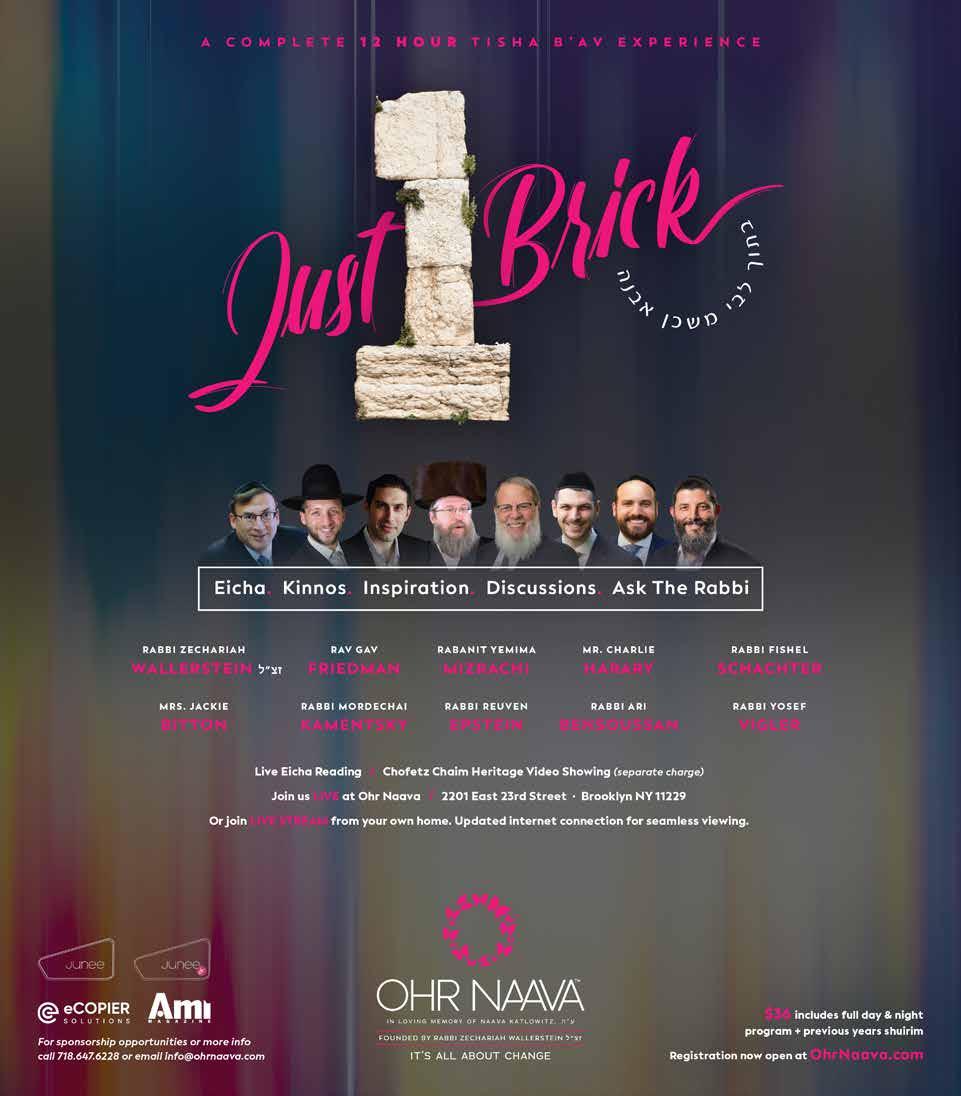

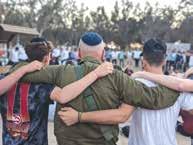
Dear Editor,
Warning: The following is political satire and may cause leftist heads to explode. Viewer discretion is advised.
It’s official – VP Kamala Harris has secured enough delegates to be the Democrat Party’s nominee for president. Which is pretty scary, to be honest. But I digress. So here are five things to know about VP Harris:
1. She knows that AI is spelled with two letters.
2. She loves healthy foods like salads – especially word salads.
3. She and Joe Biden have a combined IQ of 37.
4. Her cackle was rated by the Guinness World Records as “the most terrifying laugh ever produced by mankind.”
5. She’s an expert on the significance of the passage of time and on what can be unburdened by what has been.
I hope this little guide has given you more of an insight into who VP Harris is and what she stands for. Let’s pray she loses against Trump by more points than Joe Biden can count. Amen/Awoman.
Rafi Metz
Dear Editor,
A vote for Trump has now become an existential vote. Harris represents a fringe extreme of the most liberal order. She would be the manifestation of a continued agenda that feels no natural bond to Israel, no contemplation of criminals coming across the border, and little interest in creating a robust economy. Framing this from a halachic and hashkafic point of view, she is part of a destructive movement that began with Obama, continued with Biden, and now stands to pull us into the abyss. It has been argued that America represents one element of Eisav, being a continuation of Rome. However, America
still has a future if Trump, who stands for strong and sound policies, the knowledge of what must happen to Israel’s enemies and stopping the criminals at the border, can restore the good potential of America. Steven Genack
Dear Editor,
It’s always amusing to read Former Vice President of the Rosedale Jewish Center David Pecoraro’s take on the Biden administration and current politics. Amusing, I say, because usually it is just a regurgitation of left-wing talking points that Democrat operatives hand out to their friends in the Democratic press, (i.e., all of mainstream media except for Fox) to spew on the left wing media outlets. So it’s hardly surprising that VP Pecoraro would call Trump/JD Vance “weird” or focus on Trump being older than Kamala Harris because we’ve seen this narrative ad nauseum pretty much everywhere the last two weeks. What is surprising is VP Pecoraro still writing about Biden as if he is the most physically/mentally fit president we’ve ever had, totally with it and sharp as a whip. VP Pecoraro, that three-and-a-half year ruse on the American public ended two weeks ago with the Obama/Pelosi/Schumer coup that ended the Biden re-election campaign. Apparently, you have not received the memo on this. But there’s no need to cover up, obfuscate and lie about the President’s wellbeing anymore. It’s over. It is now time for Democrats to cover up, obfuscate and lie about Kamala Harris’ record and ensure the electorate does not find out who they are voting for. Lastly, if we are going to focus on what’s weird, it would be VP Pecoraro’s obsession with an alleged cover up of Trump’s medical records. He attempts to make hay out
Continued on page 12

Continued from page 10 of this non-issue while completely ignoring the largest scandal and White house coverup in the history of American politics: the non-compos mentis status of our current figurehead President.
Jason Stark
Dear Editor,
After reading the response letter from David Pecoraro to David Feldman, Jason Stark, and Jack Brody, I am asking, no BEGGING, please stop! We are now in the Nine Days, we have all lived through a bad year of witnessing hundreds and hundreds of our fellow Yidden who were murdered, tortured, raped and kidnapped in Israel. We have seen an unprecedented rise in antisemitism in our schools and universities, where Jews do not feel safe walking through campus. Jews are fearful of walking in the streets and riding in the subways. And on the international front, we are seeing nations like Iran mounting attacks on us and sponsoring terrorist groups to do the same, while a bunch of buffoons in the International Court of Justice want to condemn Israel (where are the condemnations for Iran, Hezbollah, and Hamas?). And with all of this, we have this sinat chinam with ad hominem attacks back and forth in the paper?
Unfortunately, as our technology increases, our civility decreases.
May I suggest that Mr. Pecoraro, Mr. Feldman, Mr. Stark and Mr. Brody meet at Gotta Getta Bagel over coffee or a couple of slices at Pizzele, or dinner and drinks at one of the many restaurants in the Five Towns. You can still have diametrically opposed ideas, but I guarantee that when meeting face to face, the atmosphere will be far nicer.
Wishing everyone peace.
Yitzchak Moskowitz
P.S. I grew up in North Woodmere, and my family were members at Temple Hillel for decades. People came from North Woodmere, Valley Stream, and many people from Rosedale. The Rosedale Jewish Center was a big part of the community, and its closure is an unfortunate loss for all.
Dear Editor,
To all those who are voting for V.P. Kamela Harris because of her “changed positions” on Israel, the border, fracking, and the economy, I suggest that you would be better off voting for the tooth fairy if you are so naive. To understand V.P. Kamela’s greatest scandal, you only need to know that she lied for three and a half years as Joe Biden’s Vice President when she stat-
ed that he did not have cognition problems. When the Department of Justice Special Investigator Robert Hur issued his report on documents incorrectly taken and used by President Joe Biden, she attacked the finding that the President could not stand trial as he would evoke sympathy as an elderly man with a poor memory. The Biden Administration is continuing to fight the release of the audio tape calling it executive privilege, despite the fact that everyone could see that “Scranton Joe” had major issues that should have invoked the 25th Amendment at the debate with former President Trump.
As far as Israel is concerned, actions speak louder than words with V.P. Kamela Harris having nothing to say for three days regarding the 12 children killed and countless wounded while playing soccer. That, coupled with her absence from the joint Congressional session that Netanyahu was invited to address, speaks volumes. Any Jew who loves Israel cannot forget her record and should not vote for her.
Jan Henock Woodmere, NY
Dear Editor,
This is in response to Mr. Pecoraro’s letter last week. Him vouching for the health of the clearly, cognitively impaired Joe Biden while referring to Donald Trump as “demented” has me questioning his mental health. His questioning of whether Trump was actually shot in Pennsylvania cements my suspicions that he is suffering from a severe case of Trump Derangement Syndrome.
Irrespective of political leanings, Mr. Pecoraro’s comparison of anyone to Hitler is in poor taste. Comparisons to Hitler are almost always a fail, and the reason why people make such inappropriate comparisons is usually due to one of two reasons: 1) a profound ignorance of history, or 2) a complete lack of sensitivity to the millions of Hitler’s victims.
Mr. Pecoraro referred to other readers of this publication as “small minded,” but I humbly suggest he engage in a bit of self-reflection.
Doniel Behar
Dear Editor,
Democratic Party presidential candidate Vice President Kamala Harris served as part of the Biden Administration, along with previously serving as a California United States Senator (2017-2021), California District Attorney (2011-2017), and San Francisco District Attorney (2004- 2011). Harris has a track record that she would prefer voters forget about. Consider that Harris was appointed Border Czar by Pres-
ident Biden. Under her watch, she only visited the border once while over 8 million migrants crossed into our nation. Harris is also on record calling for eliminating fossil fuel, ending all private health insurance, providing free health care to illegal immigrants, abolishing Immigration and Customs Enforcement (ICE), supporting late term abortions, allowing criminals to vote from jail, expanding the Supreme Court, allowing “men” to compete against biological women in sports, and according to the Congressional Budget Office increasing the national debt by $7.9 trillion dollars. Harris also encouraged people to support a bail fund for those who participated and were arrested in the Minneapolis, Minnesota, riots. While Republican presidential candidate Donald Trump showed up at the recent National Association of Black Journalists Conference in Chicago, Harris was a no-show.
Watch how the liberal media, fellow liberal Democrats and the Harris campaign attempt to rewrite her past history on these issues that voters are interested in. Revisionist political historians may be the greatest threat to our democratic republic with free and honest elections.
Sincerely,
Larry Penner Great Neck, NY
Dear Editor,
While deciding which candidates you will vote for in the upcoming election, you should carefully pay attention to what the candidates don’t say as much as what they DO say. The catchphrase for a long time has been that Trump is a “threat to democracy.” I’m uncertain of what exactly this means considering that we have a three-part government. However, the real threat to democracy has been coming from Congress, and it’s from both Democrats and Republicans. For about the past decade, Congress has been focused on partisanship far more than trying to pass useful laws that benefit the country, and especially, their constituents. If you can’t see that the many “Squad” members have been a threat to democracy for a good while, you’ve been ignorant or apathetic.
The real current threat to Jews, however, can be evaluated by which politicians support Israel fully. I’m not talking about those that say Israel has a right to defend itself yet must show restraint any time there a terrorist attack. We know who these politicians are. Pay attention to those that consistently make moral equivalences between Hamas and Israel or Hezbollah and Israel. Pay attention to those that have been silent about the rising antisemitism in the U.S., the pro-
Hamas rallies on college campuses and streets, and inside the Capitol. Pay attention to the politicians that ignore anyone that destroys public or private property and blocks roads, bridges and airport access to ruin and harm daily activity. This election will be about answering one essential question honestly and unambiguously: Do you identify yourself as an American Jew or as a Jewish American? True lovers of Israel are American Jews. They understand that Israel is an essential necessary part of Jewish religion and identity. They won’t support someone that supports Hamas or anyone that tries to prevent Israel from eradicating evil and any forces trying to destroy Israel in any way. If you’re a Jewish American, you think of Israel as just another country in the world that coincidentally happens to have Jews. It’s pretty much like America, otherwise.
Before you vote, think seriously about the identity question. How you vote will clarify to you and others exactly what your priorities are.
Daniel Feldman
Dear Editor,
Some thoughts regarding the investigation and prosecution of Rabbi Eisemann. The investigation and prosecution was bizarrely disproportionate to the supposed crime. No terrorist, gangster, drug dealer, or murderer got such tenacity. This illegal lawfare, fought with such viciously insane tenacity, over what ultimately turned out to be nothing more than a minor bookkeeping error, reeked of antisemitism. A record-breaking FBI investigation, that, by all appearances, was never was never legally justified, as there was never any probable cause. Countless ethical and legal violations were committed by investigators and prosecutors. And all of this taking place during the very same time that Ocean and Monmouth counties were experiencing disproportionately high levels of drug abuse and overdose deaths, perhaps because the legal authorities were absconding their responsibility on behalf of an unstated agenda that clearly had little to do with the welfare of the citizens.
Rabbi Eisemann was a public servant who devoted his life to helping others, especially the disabled, yet the prosecutors went after him like rabid dogs, even as they neglected to pursue actual criminals who endanger the lives of the people around them.
Sincerely,
Rabbi Eli Reit Lakewood, New Jersey



Last Thursday, the U.S. and Russia, with help from some European countries – particularly Germany – executed a groundbreaking and long-awaited prisoner exchange deal, the biggest of its kind since the Soviet Union’s collapse. The agreement saw the release of twenty-four individuals, most notably Evan Gershkovich, a Wall Street Journal reporter, and Paul Whelan, a former U.S. Marine and American corporate security official, both of whom had been imprisoned in Russia on sham charges.
Gershkovich, 32, had been detained in Yekaterinburg, Russia, since March 2023. After spending around 478 days in jail, he was recently sentenced to sixteen years in prison on charges of espionage. Whelan, 54, was also accused of spying and had been imprisoned in Russia since December 28, 2018.
Alsu Kurmasheva, a journalist for Radio Free Europe/Radio Liberty of U.S. and Russian citizenship, was also released by Russia as part of the deal. Last month, Moscow convicted her for allegedly disseminating misinformation about Russia’s army. Vladimir Kara-Murza, a British-Russian political commentator who won a Pulitzer Prize for speaking out against Moscow, was also freed by Russia. He was imprisoned in April 2022 and was convicted of treason.
Thursday night, Gershkovich, Whelan, and Kurmasheva reached Maryland’s Joint Base Andrews and were welcomed home by President Joe Biden and Vice President Kamala Harris, who were waiting at the air base.
On the other side, eight people were returned to Russia, including the notorious murderer Vadim Krasikov, who had been imprisoned in Germany. In August 2019, Krasikov, an assassin hired
by the Kremlin, was convicted of murdering a forty-year-old Georgian man named Zelimkhan Khangoshvili. In 2021, Krasikov, whom Russian President Vladimir Putin has called a “patriot,” was sentenced by Germany to life in prison.
“Deals like this one come with tough calls,” Biden said of the prisoner exchange. “There’s nothing that matters more to me than protecting Americans at home and abroad.”
Additionally, the deal saw the release of three Russian operatives detained in Slovenia, three individuals who had been charged by U.S. federal officials, and two others released from Poland and Norway.
A number of other United States citizens are still detained in Russia, two of whom the U.S. says were imprisoned on illegitimate charges. Those remaining in Russia include musician Travis Leake, who was arrested for alleged drug possession; U.S. soldier Gordon Black, who was accused of thievery and making murder threats; teacher Marc Fogel, who also allegedly brought drugs into Russia; and Ksenia Khavana, whom Russian authorities accused of treason and arrested in February. Khavana had been arrested while visiting relatives in Russia and was accused of gathering funds to pay the Ukrainian army, although Khavana’s employer has insisted that she was only involved in funding humanitarian efforts.
Following news of the deal, the Fogel family said it was “inconceivable” that he was not part of the agreement and called on the U.S. to see to it that he is freed.
Last week, during Biden’s reelection campaign suspension speech, the president hinted at the prisoner exchange, saying, “We’re also working around the clock to bring home Americans being unjustly detained all around the world.”
During the June debate, former president and current GOP presidential nominee Donald Trump vowed to free Gershkovich once elected. Following Thursday’s exchange, Trump attacked the deal, saying that the U.S. paid Russia in cash.
“Are we releasing murderers, killers, or thugs? Just curious because we never make good deals, at anything, but especially hostage swaps,” posted Trump on Truth Social.
Sudan’s civil war is taking a toll on its residents. Two U.N.-backed monitoring groups have officially declared that famine has hit the Zanzam camp in the embattled country’s Darfur region. The

camp is home to around five hundred thousand refugees.
In the Famine Review Committee’s (FRC) first famine declaration since 2017, the organization found that the refugee camp has been facing famine since June and stated that “many other areas throughout Sudan remain at risk of famine as long as the conflict and limited humanitarian access continue.”

Months ago, the capital city of North Darfur, El Fasher, was seized by the rebelling Rapid Support Forces, a paramilitary group that, in April 2023, went to war with the Sudanese Armed Forces. The civil war has wreaked havoc on Sudan, turning the North African country into “one of the worst humanitarian disasters in recent memory,” according to the United Nations. Over 10 million Sudanese people are currently displaced, while over 25 million are seriously undernourished because of the war.
In May, the World Food Program reported that residents of Darfur have so little to eat that they’ve begun consuming grass and peanut shells to survive. The Integrated Food Security Phase Classification (IPC), under which the FRC operates, has described famine as “an extreme deprivation of food” that causes impoverishment, starvation, death, and very serious levels of malnutrition. When two adults or four children out of every 10,000 people perish daily because of hunger or malnutrition and disease, a famine is declared.
The Zanzam camp in Sudan is suffering from famine, and other areas in the country are also at risk because of “conflict and lack of humanitarian access, both of which can immediately be rectified with the necessary political will,” said the FRC, adding that weather has not contributed to hunger in Sudan, which has rich soil and used to have a surplus of food.
On Thursday, Famine Early Warning Systems Network (FEWS NET) also declared that the Zanzam camp was suffering from famine and that other areas in El Fasher, where another 800,000 people reside, are also at risk for famine. FEWS NET and the FRC have both said that the famine will continue till October, if

not much later. The FRC has encouraged the war’s belligerents to “ensure the full delivery of services to mitigate the likelihood and severity of famine.”
“As the conflict is the predominant factor driving this famine, all means to reduce or resolve the underlying conflict between the parties involved in Sudan should be exhaustively explored,” the organization added.

The government of Bangladesh recently took drastic measures to quell the tens of thousands of rioters who were protesting for Prime Minister Sheik Hasina to step down from her twenty-year reign. In clashes between police and rioters, 91 or more people died, 13 of whom were police officials, and hundreds more have been wounded. The clashes took place on Sunday, which saw more deaths on one day than in any other Bangladeshi protest in recent years, eclipsing July 19, when 67 people died during student riots protesting against government job quotas.
In response to Sunday’s riots, Bangladeshi authorities implemented an indefinite 6 p.m. curfew for the entire country and declared a three-day general holiday beginning on Monday. In the wake of Sunday’s protests, Hasina succumbed to the pressure of the rioters, resigned and fled to India, forcing the country to form an interim government and ending her two-decade reign.
Before Hasina’s exit, however, the government went further, shutting down internet services in response to the riots. Bangladeshi citizens had been protesting against Hasina, who recently secured her fourth consecutive term as prime minister. Human rights groups and opponents of Hasina have said that her government stops protests through the use of excessive amounts of force, an accusation that Hasina rejected.
On Sunday, protesters stationed themselves in certain areas, blocking major highways. Simultaneously, students protested, and civil unrest swept through the country.
“Those who are carrying out violence are not students but terrorists who are out to destabilize the nation,” Hasina declared in a statement following a national security panel meeting. “I appeal to our countrymen to suppress these terrorists with a strong hand.”
A group of protesters vandalized a medical college hospital and set hospital vehicles, such as an ambulance, ablaze.
During riots, thirteen police officers were beaten to death in Sirajganj, a northwestern district. The homes of two lawmakers were set ablaze, and nine other people were murdered in the district. In the capital of Dhaka, eleven people were killed, one of whom was a ruling party leader and two of whom were students. In Pabna, a northeastern district, three or more people were killed, while fifty were wounded. In Munsigang, a district in central Bangladesh, two construction workers were killed and thirty others were injured. In Feni and Lakshmipur, eight were killed; four were killed in Magura, five in Rangpur, and six in Narsingdi.
Amid the violent protests, the Indian foreign ministry warned its citizens against traveling to Bangladesh for the time being.
The Bangladeshi government ordered the shutdown of high-speed internet services, making Facebook, WhatsApp, and other services unavailable. It ordered the shutdown of all 4G services as well.
In the interim, student leaders appointed Muhammad Yunus as prime minister to head the interim government. Yunus headed to Bangladesh from Paris this week to finalize the position and to appoint remaining members of his government.
“It is critical that trust in government be restored quickly,” Yunus, 84, told the Financial Times on Wednesday, adding that he was not seeking an elected role or appointment beyond the interim period.
Yunus is a well-known critic and political opponent of Hasina. He called her resignation the country’s “second liberation day.” She had once called him a “bloodsucker.” An economist and banker by profession, Yunus was awarded the Nobel Peace Prize in 2006 for pioneering the use of microcredit to help impoverished people, particularly women. The Nobel Peace Prize committee credited Yunus and his Grameen Bank “for their efforts to create economic and social development from below.”
As a result of protests last month, 150 or more people were killed, while thousands more were injured in the chaos started by students who were rioting against government job quotas. After the


Supreme Court got rid of the majority of the quotas, students stopped protesting. However, last week, people began rioting again because many people were killed last month while the police tried to stop the protests.

Following the murders of three girls who were at a children’s dance last week in northwest England, anti-immigration riots swept through Britain. On Sunday, Keir Starmer, the prime minister of England, called the protests “far-right thuggery” and vowed that the rioters would be punished for their violent acts.
Although police officials have said that the murderer who killed the three girls was born in England and would not be considered a terrorist, some anti-immigration groups have claimed that the murderer was, in fact, a radical Muslim immigrant. On Saturday, several cities saw protests, including Liverpool, Manchester, and Bristol. Many shops and businesses were vandalized and ransacked by protesters, and a number of police officials were attacked and wounded, leading to many arrests.
The following day, hundreds of anti-immigrant rioters assembled in front of a hotel for asylum seekers near the northern city of Rotherham. The demonstrators hurled bricks at officers, breaking hotel windows and burning down a big barrel near the hotel. In Rotherham, 10 police officials were wounded while trying to quell the group of 700 protesters. Some demonstrators wore masks, hurled wooden planks and blasted fire extinguishers at police. Some officers may now have broken or fractured bones; one was knocked unconscious.
Starmer condemned the riots, stating that the protests were acts of violence.
“Be in no doubt, those that have participated in this violence will face the full force of the law,” Starmer declared, adding that citizens were in “absolute fear” because of the “marauding gangs” terrorizing Rotherham.
According to the National Police Chiefs’ Council, officials detained 147 protesters since Saturday evening, with arrests likely to continue.
“The mindless actions of those today have achieved nothing other than sheer destruction and leaving members of the public and the wider community in fear,” South Yorkshire Police’s Assistant Chief Constable Lindsey Butterfield.
On Sunday, several towns were hit with riots, including Lancaster, Bolton, and Aldershot. In Middlesbrough, fourteen people were detained following a march through the town that caused “mindless violence” and led officials to warn the public against going to the town center. According to the interior minister, many mosques will be given extra protection. Additionally, local police warned the public against being in the vicinity of a hotel in Tamworth, where “a large group of individuals are in the area and have been throwing projectiles, smashing windows, starting fires and targeting police. One officer has been injured.”
Britain last saw similar protests in 2011 when a Black man was killed in London by a police officer, prompting thousands of people to protest.

On Monday, the Hanoi People’s Court of Vietnam convicted Vietnamese billionaire businessman Trinh Van Quyet of fraud and sentenced him to 21 years in jail. The 48-year-old business magnate who owned and chaired the FLC Group was found guilty of inflating his company’s value and, by doing so, defrauding stockholders of around $144 million.
Quyet was arrested in 2022. His sentencing came following a two-week court case that involved 49 of his alleged accomplices. His company’s general contractor subsidiary, FLC Faros, was privately owned until 2016, before which Quyet purportedly inflated the company’s value by reporting fictitious capital contributions. In all, 30,000 investors collectively owned around 391 million shares of his company’s stock.
Quyet’s co-defendants were all convicted, including his two sisters, Trinh Thi Minh Hue and Trinh Thi Thuy Nga,

both of whom were similarly found guilty of defrauding the public. Hue was sentenced to fourteen years, while Nga was sentenced to eight. Trac Dac Sinh, the Ho Chi Minh Stock Exchange’s former chairman, Le Hai Tra, the company’s deputy CEO, and Tram Tuan Vu, the company’s former deputy CEO, were each found guilty of abuse of authority for allowing Quyet to get away with defrauding the public. Sinh was sentenced to 6.5 years, Tra to 5, and Vu to 5.5.
Community Party General Secretary and Vietnam’s most powerful politician Nguyen Phu Trong, who passed away in July, was known for the campaign he launched against corruption. He passed away at 80 years old, just three days before the start of Quyet’s trial. Trong started the Blazing Furnace campaign in 2013, believing that corruption posed a great threat to his party. In 2018, the anti-corruption campaign started targeting private businesses and companies.
Earlier this year, Truong My Lan, a top real estate businesswoman, was found guilty of defrauding around $44 billion and was sentenced to death.

At least five U.S. personnel were injured in an attack against a military base in Iraq on Monday.
Two Katyusha rockets were fired at al Asad airbase in western Iraq. One of the wounded Americans was seriously injured.
The Middle East is on high alert after the assassination of Hamas leader Ismail Haniyeh in Tehran last week. The senior military commander of Hezbollah, Fuad Shukr, was also killed in a strike on Beirut last week.
Iran has said the U.S. bears responsibility in the assassination of Haniyeh because of its support for Israel.
In a call on Monday, U.S. Secretary of Defense Lloyd Austin and Israel’s Defense Minister Yoav Gallant agreed that

the attack marked “a dangerous escalation” and “demonstrated Iran’s destabilizing role in the region,” according to a Pentagon readout.
Last week, the U.S. carried out a strike in Iraq against individuals U.S. officials said were militants getting ready to launch drones and posed a threat to U.S. and coalition forces.
For now, the world is holding its breath to see how Iran will respond in the wake of the Haniyeh assassination. The Pentagon has said it will deploy additional fighter jets and Navy warships to the Middle East, as Washington seeks to bolster defenses following threats from Iran and its allies Hamas and Hezbollah.
A rare ally of both the U.S. and Iran, Iraq hosts 2,500 U.S. troops and has Iran-backed militias linked to its security forces. It has witnessed escalating tit-fortat attacks since the Israel-Hamas war erupted in October.
Iraq wants troops from the U.S.-led military coalition to begin withdrawing in September and to formally end the coalition’s work by September 2025, with some U.S. forces likely to remain in a newly negotiated advisory capacity.

The government of Somalia has confirmed that al Qaeda-linked terrorists were behind Friday’s beach restaurant attack, in which 37 people were killed and 212 were injured, eleven of whom are in critical condition. The attack was carried out on a well-frequented beach restaurant in Mogadishu, the capital of Somalia, by the al-Shabaab Islamic militant group, according to the African country’s government.
Of the terrorists, one blew himself up, three were killed by Somalian officials, and one was arrested alive, according to police spokesperson Abdifatah Aden. Friday’s attack was the deadliest Somalia has seen since October 2022, when a twin car bombing claimed by al-Shabbab caused 100 deaths and 300 injuries. AlShabaab has yet to claim Friday’s attack.
One soldier was murdered during the
terrorist attack, according to Aden.
“I was in the restaurant sipping coffee and having a good chat with friends when I saw a big man running. In a second, there was something like lightning and a huge blast,” a survivor recounted. “We were covered with smoke. Inside and outside the restaurant many people were lying on the floor while others were bleeding and crying.”
A day later, the beach was left with sandals and shoes abandoned by panicked people who ran away during the attack.
Somali President Hassan Sheikh Mohamud and Prime Minister Hamza Abdi Barre held a meeting with security agencies following the terrorist attack and drafted plans to prevent such an incident from ever happening again.
“The government is determined to eliminate the terrorists. The terrorists want to terrify the civilians. Let the civilians report the terrorists hiding among them,” the president’s office posted on X, indirectly referring to al-Shabaab.
Much of Somalia was governed by alShabaab until 2022, when the country’s government made progress in repelling the terrorist group. With that being said, al-Shabaab still has the power to carry out powerful attacks, targeting the government, military, and others.

On Monday, Cambodia broke ground on a controversial, China-funded canal to link the capital Phnom Penh to the sea. The $1.7 billion, 180-kilometer (111 miles) Funan Techo canal is planned to connect the country’s capital with Kep province on Cambodia’s south coast, giving it access to the Gulf of Thailand.
The country hopes the canal will lower the cost of shipping goods to the country’s sole deep-sea port, Sihanoukville, and reduce reliance on Vietnamese ports.
The project highlights the outsized role that China plays in Cambodian politics and economy. Some are concerned about the environmental costs of the canal, especially on the flow of the


Mekong River, which feeds millions of people across six countries through its fish and the agriculture that it sustains.
The canal has made Vietnam concerned, as it worries about the effect on its Mekong Delta rice-growing and about Cambodia moving out of its orbit, noted Nguyen Khac Giang, an analyst at Singapore’s ISEAS-Yusof Ishak Institute.
“There is a concern that most of the Cambodian exports might be diverted from the current route, crossing the Vietnamese border to Vietnamese ports and moving away from that to Cambodian ports,” he said.
Cambodian Prime Minister Hun Manet took over the role from his father, Hun Sen, last year. Hun Sen led Cambodia for 38 years; his birthday was on Monday. The government declared that day a holiday so Cambodians could participate in the opening of the canal as a “celebration in a joyful, crowded and proud manner.”
Thousands of people wearing t-shirts with photographs of the father and son began gathering at the canal site that was covered in Cambodian flags. Billboards promoting the economic benefits of the canal dominated the countryside.
The canal will promote “national prestige, the territorial integrity and the development of Cambodia,” Manet said, adding that the country had built bigger and more expensive infrastructure projects before. But this “historic” canal was different and had nationwide support, he said.
“We will build this canal, no matter the cost,” he said.
The canal will be built jointly by China and Cambodia, with Cambodia have the 51% majority share.
remote-controlled bomb that was planted around two months ago in the room where he would be staying while in Iran for the inauguration of new Iranian president Masoud Pezeshkian.
The Times quoted one anonymous U.S. and seven Islamic officials, two of whom are from the Islamic Revolutionary Guard Corps. U.S. and Middle Eastern officials also confirmed that Israel was responsible for Haniyeh’s assassination, as was suspected.
The killing was a “tremendous embarrassment” for the IRGC, according to three Iranian officials, as the Revolutionary Guard is responsible for the guesthouse that Haniyeh and his acquaintances stayed at. Tehran has pledged to respond to Israel with force.
Although Haniyeh was killed, the building he was staying in wasn’t seriously damaged. Some windows were shattered and a part of the compound’s wall caved in. A neighboring room, in which Palestinian Islamic Jihad leader Ziad Nakhaleh had been staying, wasn’t seriously damaged, according to two Iranian officials. The assassination was successful thanks to “precise planning,” said The Times.
It is improbable that Haniyeh was killed by an Israeli missile strike, as it likely wouldn’t have circumvented Iran’s air defenses and it would have caused far more damage. Iranian officials are currently investigating the incident to determine how the bomb was successfully planted in the Hamas leader’s room.
“Israeli intelligence officials briefed the United States and other Western governments on the details of the operation in the immediate aftermath,” said five Middle Eastern officials, as quoted by The Times.

Although early reports suggested that a precise Israeli missile was what killed Hamas political leader Ismail Haniyeh last Wednesday, new reports by The New York Times are indicating that Haniyeh was actually killed by a complex,
Haniyeh was found dead by guesthouse medical officials at around 2 a.m. local time. He and his bodyguard were immediately declared dead. Khalil AlHayya, a senior Hamas official, was present at the time of the discovery, according to officials. Officials then informed Gen. Ismail Ghaani, the IRGC’s Quds Force commander, who awakened and told Iranian Supreme Leader Ayatollah Ali Khamenei about the news.
Shortly after the October 7 massacre, Israel vowed to eliminate Haniyeh and other top officials of Hamas, the terrorist group that perpetrated the attacks, in which 1,200 people were killed and 251 others were taken captive.
Last week, the IDF confirmed that Muhammad Deif, the military leader of Hamas, was killed by an Israeli air strike a month before Haniyeh’s assassination. A few hours before Haniyeh’s death, Israel also eliminated Fuad Shukr, Hezbollah’s

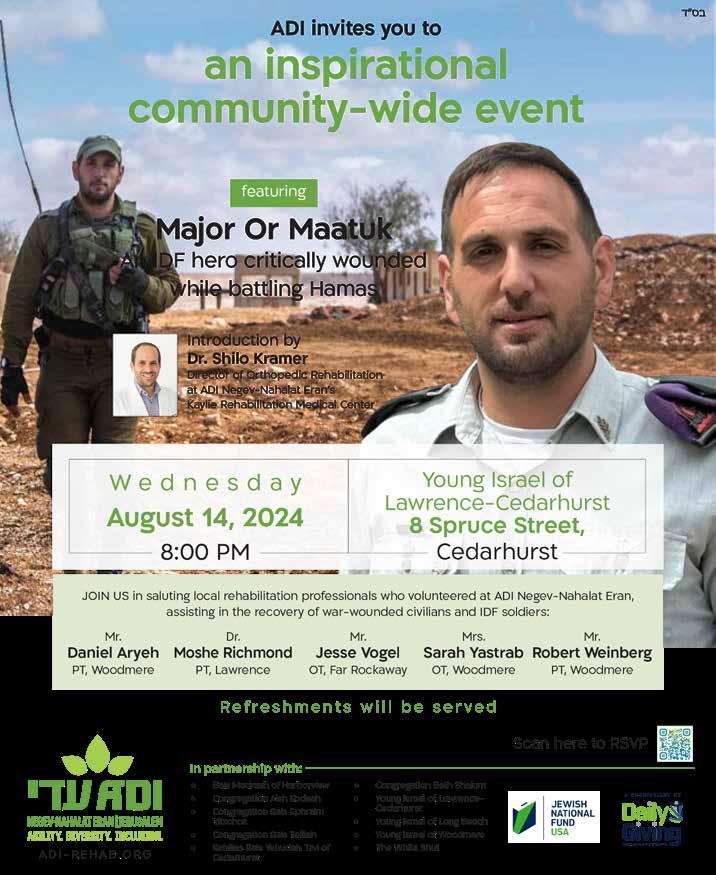
highest-ranking commander, in response to the Hezbollah attack that murdered twelve Druze children last Saturday in the Golan Heights.
The SFI Group and MAPS Israel last Wednesday published a new study that
indicates that Israeli PTSD over the next five years could have an upwards cost of 197 billion shekels, or $53.2 billion, on the economy. The study was conducted to evaluate how much the economy would be negatively impacted by PTSD cases caused by the October 7 massacre and the war that followed.
For one person, a lifetime of PTSD could cost 1.86 million shekels or $485,000, if not more. The study also compared the five-year economic cost of
would handle 30% of the cost, and the state, which would bear 30% of the cost because of public service cost increases and tax revenue decreases. There would also be a 40% cost thanks to a decrease in national labor productivity because of PTSD, according to the study.
MAPS Israel has been researching a new form of therapy – a mix of psychotherapy and MDMA psychedelic drug-use – meant to mitigate PTSD symptoms. For every 1 shekel invested in such a program, the research organization says, there would, nationally, be a 12.5 to 14.9 shekel return on investment.

“For the first time in Israel, we have an economic study that provides a comprehensive picture of the economic implications of PTSD and demonstrates the importance of data-based economic measurement,” said the CEO and founder of SFI Group, Yaron Neudorfer. “This approach allows for precision in allocating public resources and encourages the development of national solutions for needs that are emerging (and will continue to emerge) during this time of emergency.”
The founder of MAPS Israel’s HealingOct7 project Eyal Gura said, “We hope that the economic study and its results will reach the decision-makers responsible for the state budget and that the issue of PTSD will receive the appropriate attention both on a personal mental level and on a national economic level as it involves saving lives in every sense of the word.”
PTSD ($53.2 billion) with the Defense Ministry’s estimated five-year budget ($59 billion).
The economic costs of PTSD would be divided into three categories: National Insurance benefits cost, which would bear 18% of the cost; employment and productivity’s direct impact, which would bear 74%; and mental disorders and addictions’ impact, with 8%. PTSD economic costs would also be split into three groups: individuals and families, which
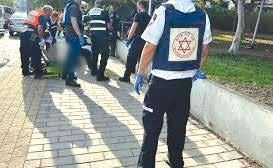
On Sunday morning, a Palestinian terrorist from the West Bank struck three places in the Israeli city of Holon, killing two Israelis and wounding two others in a knife attack. The terrorist was shot by a
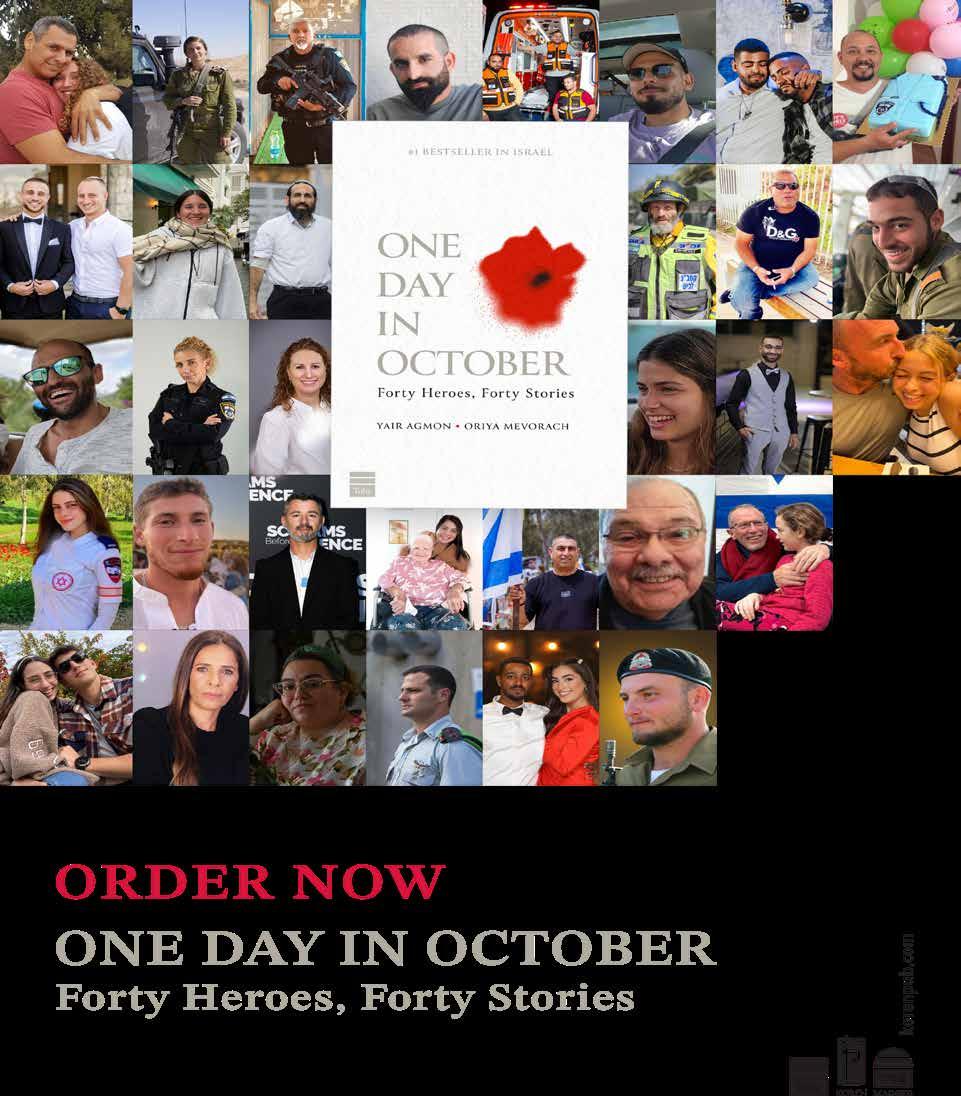


local police officer and was later declared dead at Shamir Medical Center.
“This was a complex and difficult terror attack. The casualties were at three separate locations, approximately 500 meters from each other,” said medics from the Magen David Adom ambulance service.
One of the victims was a 66-year-old woman named Rina Daniv, who was pronounced dead at the scene. Her 68-yearold husband, Shimon, was also stabbed and sustained serious injuries. The Daniv couple resided in Holon and had been walking in the Moshe Dayan Street park, as they did daily, when they were attacked at the entrance of the park.
Three others – a moderately injured 26-year-old, a seriously injured 68-yearold man, and a critically wounded man in his seventies – were taken to the local Wolfson Medical Center. The man in his seventies was declared dead at the hospital, according to the medical center’s officials.
After the terrorist stabbed Rina and Shimon Daniv, he walked to a local bus stop near a gas station and stabbed the 70-year-old man. He then went on to stab Yakov Libertov, 26, at a Dan Shomron Street bus parking lot.
According to Ronit Sasson, the sister of Shimon Daniv, her brother is in stable condition.
Libertov, while in the hospital, told reporters that he saw the terrorist while walking his dog in a nearby park. The Palestinian man, who Libertov said had “an angry expression,” was walking slowly and didn’t seem to be armed, and Libertov did not anticipate getting attacked. Suddenly, however, the knifeman, who said nothing during the attack, ran at Libertov and stabbed him in the shoulder. The victim was able to fight the terrorist and flee with his dog but sustained moderate to serious wounds in his shoulder and stomach. Libertov then went to a local bus depot, where drivers helped him contact police.
The terrorist was named as Amar Odeh, 34. He resided in Salfit, a city in the West Bank, and had no entry permit to Israel or a security-related crime record.
The officer, who ended up shooting the knifeman dead, originally saw the terrorist, who he thought was a mugger, while in his police car. The policeman then exited the car and ran after the Palestinian man.
“He wasn’t running so fast,” said the police officer. “I told him to stop, and then he rounded on me with the knife in his hand.
“As soon as I noticed the knife I pulled
out the pistol and said to stop,” the officer added. “He approached me, and I kept telling him to stop. He shouted something in Arabic while hiding behind a garbage bin and then I ran towards him, and then I shot him.”
Since October 7, when 1,200 people were murdered and 251 others were kidnapped by Hamas, there have been several terrorist attacks in Israel and the West Bank, resulting in the deaths of 25 Israelis and five Israeli security officials.

A United Nations investigation has found that nine employees from its main agency for Palestinian humanitarian relief, UNWRA, “may have” been involved in the October 7 attack and no longer work at the agency.
There are 13,000 UNRWA staff members in Gaza.
The investigation was launched in January after Israel accused some UNRWA employees of participating in the attack in which 1,200 people in Israel were murdered and 251 others were taken hostage.
Some of those accused of being complicit in the attack were fired in January, when Israel accused them of being involved. Others were fired in the spring when new assertions came to light.
The UN’s Office of Internal Oversight Services (OIOS) investigated a total of 19 employees who were accused by Israel of participation in the attack.
“The evidence obtained by OIOS indicated that the UNRWA staff members may have been involved in the armed attacks of 7 October 2023,” OIOS said in a statement. In nine other cases, OIOS said that the evidence was “insufficient” for the employees to be fired, but that “appropriate measures will be taken in due course.” In the final case, “no evidence was obtained by OIOS to support the allegations of the staff member’s involvement.”
In a statement on X, a spokesperson for the Israel Defense Forces (IDF), Nadav Shoshani, said, “9 of your employees


might have participated in the largest massacre of Jews since the Holocaust.
“Your ‘relief’ agency has officially stooped to a new level of low, and it is time that the world sees your true face.”
UNRWA was founded by the UN a year after the state of Israel was founded. The agency provides a wide range of aid and services to Palestinian refugees and their descendants.
In a statement on Monday, UNRWA Commissioner-General Philippe Lazza-
rini said that his agency’s “priority is to continue lifesaving and critical services for Palestine Refugees in Gaza and across the region, especially in the face of the ongoing war, the instability and risk of regional escalation.”
“UNRWA is committed to continue upholding the fundamental principles and values of the United Nations, including the humanitarian principle of neutrality, and to ensuring that all its staff abide by the Agency’s policy on outside and political activities.”
The head of the IDF’s Israel Defense Forces’ Military Intelligence Directorate, Maj. Gen. Aharon Haliva, met with senior U.S. officials in January to share Israel’s concerns about UNRWA employees’ involvement in the attack.
“We gave them specific names and which organizations they are affiliated with, whether Hamas or PIJ or others, and what exactly they did on October 7. We showed them that we had solid intelli-
gence from difference sources,” an Israeli official said.
Israel in February released some details about 12 employees whom it accused, including their names, photos and alleged roles with Hamas. The additional details also included screengrabs of what Israel said were two UNWRA employees – a social worker and math teacher – in Israel on October 7.
The allegations led to several of UNRWA’s most important donor countries to withdraw funding from the agency. Most of those countries have reinstated their funding. The United States – historically, UNRWA’s largest donor – has not.
On Monday, Israel returned the bodies of more than 80 Palestinians killed in the Gaza war.
Yamen Abu Suleiman, the director of the Palestinian Civil Emergency Service in Khan Younis in southern Gaza, declared, “The occupation provided us with no information about the names, or ages, or anything. This is a war crime, a crime against humanity.”
The 84 bodies will be screened and examined in an attempt to determine the causes of death and in an attempt to identify them. They will later be buried in a mass grave at a cemetery near Nasser Hospital in Khan Younis.
Israel returns the bodies of Palestinians after it is determined that they are not the bodies of Israeli hostages who have been held by Hamas for over 300 days.
The Israeli Hostages Families Forum questioned why Israeli Prime Minister Benjamin Netanyahu would allow the handover of Palestinian bodies without a ceasefire deal with Hamas.
“Why are bodies being returned outside the framework of a comprehensive deal? Such an agreement could bring back living hostages for rehabilitation and the deceased for proper burial,” they said in a statement.
On Tuesday, Kamala Harris chose Minnesota Gov. Tim Walz as her vice presidential running mate. Walz, 60, made a name for himself in

the veepstakes as he gained major traction online with his folksy mannerisms and viral comments calling Trump and Vance “weird.”
Walz was elected to Congress in 2006. Before that, he served in the Army National Guard and was a high school social studies teacher and football coach.

A Harris-Walz campaign will highlight his fight for expanded child tax credits, junk-fee ban, paid-leave policies, gun safety legislation and codifying Roe v. wade protection. As governor, he’s implemented a bevy of progressive policies, including paid family leave, universal school breakfast and lunch, legalization of recreational marijuana use, state codification of abortion rights, and gun control measures like universal background checks and red flag laws.
Walz will give Harris a boost in key Midwest states. Born in West Point, Ne-
braska, a community of about 3,500 people northwest of Omaha, Walz joined the Army National Guard and became a teacher in Nebraska.
He and his wife moved to Mankato in southern Minnesota in the 1990s, where he taught social studies and coached football. He served 24 years in the Army National Guard before retiring from a field artillery battalion in 2005 as a command sergeant major, one of the military’s highest enlisted ranks.
He served in Congress for six terms. Walz became governor of Minnesota in 2018.
Walz called Republican nominee Donald Trump and running mate JD Vance “just weird” in an MSNBC interview last month, and the Democratic Governors Association — which Walz chairs — amplified the point in a post on X. Walz later reiterated the characterization on CNN, citing Trump’s repeated mentions of the fictional serial killer Hannibal Lecter from the film “Silence of the Lambs” in stump speeches.
The word quickly morphed into a theme for Harris and other Democrats, who have been calling Trump voters “weird” in this really weird election.


Google acted illegally to maintain a monopoly in online search, a federal judge ruled on Monday, a landmark decision that strikes at the power of tech giants in the modern internet era and that may fundamentally alter the way they do business.
Judge Amit P. Mehta of U.S. District Court for the District of Columbia said in a 277-page ruling that Google had abused a monopoly over the search business. The Justice Department and states had sued Google, accusing it of illegally cementing its dominance, in part, by paying other companies, such as Apple and Samsung, billions of dollars a year to have Google automatically handle search queries on their smartphones and web browsers.
“Google is a monopolist, and it has acted as one to maintain its monopoly,” Mehta said in his ruling.
The ruling is a harsh verdict on the rise of giant technology companies that have used their roots in the internet to influence the way we shop, consume information and search online — and indicates a potential limit of Big Tech’s power. It is likely to influence other government antitrust lawsuits against Google, Apple, Amazon and Meta, the owner of Facebook, Instagram and WhatsApp. The last significant antitrust ruling against a tech company targeted Microsoft over two decades ago.
The decision is a major blow to Google, which had fiercely defended itself against the allegations. Internet search is a core driver of the company’s profits, and the ruling could have major ramifications for its future success, especially as Google spends heavily to compete in the race over artificial intelligence.
Monday’s ruling did not include remedies for Google’s behavior. Mehta will now decide that, potentially forcing the company to change the way it runs or to sell off part of its business.
Mehta’s ruling capped a years-long case that resulted in a 10-week trial last year. The Justice Department and states sued in 2020 over Google’s dominance in
online search, which generates billions in profits annually. The Justice Department said Google’s search engine conducted nearly 90% of web searches, a number the company disputed.
The company spends billions of dollars annually to be the automatic search engine on browsers such as Apple’s Safari and Mozilla’s Firefox. Google paid Apple about $18 billion for being the default in 2021, The New York Times has reported.
Kent Walker, Google’s president of global affairs, said the company would appeal the ruling. (© The New York Times)

Jacob Chansley, known as the “QAnon Shaman” for his elaborate garb on January 6, 2021, will get back the spear he carried inside the building as well as his horned, coyote-tailed headdress, said a judge on Monday.
The Justice Department in recent weeks had been at odds with Chansley on who should possess the items. The federal government had seized them around his arrest, but Chansley has served much of his criminal sentence for the felony charge related to the January 6 events. Prosecutors had tried to convince Judge Royce Lamberth, of the DC District Court, they needed to keep the items as evidence in case Chansley tries to challenge his conviction again.
“Even if the government may need to reprove Mr. Chansley’s guilt, the government has not explained why it would need his property,” Lamberth wrote. “As there is voluminous video and photo evidence of Mr. Chansley’s conduct, his property is of little utility for an investigation or prosecution.”
Chansley pleaded guilty to a felony obstruction charge and was sentenced to 41 months in prison in 2021. He has finished serving his prison time but has two years left of court-supervised release. Pictures of Chansley went viral when the Arizonan during the riot flexed his muscles on the Senate dais where thenVice President Mike Pence had been minutes before.

The headdress, as well as his bare chest and face paint, have been mimicked by many others.
In addition to the costume, Chansley had used a bullhorn to lead parts of the crowd. Though he was non-violent, Lamberth said the six-foot pole Chansley carried with an American flag attached and a spear on the top was a “serious weapon.”

Just two days after the U.S. reached a plea deal with Khalid Sheikh Mohammed, the suspected mastermind behind the 9/11 attacks, Defense Secretary Lloyd Austin struck the agreement down, noting that a move of such magnitude “should rest with” him. Austin also withdrew Susan Escallier, the convening authority for Guantanamo Bay’s military courts, from the case.
Austin revoked the agreement struck last week with Mohammed and two other 9/11 plotters, Walid Bin ‘Attash and Hawsawi. In exchange for pleading guilty, the three terrorists would have been jailed instead of put to death. Now, the death penalty can still be considered.
For over two years, prosecutors have mulled over the idea of proposing a plea deal instead of going to trial, which would be lengthy and exceedingly complex because some evidence was acquired through the use of what some say was torture. Talks began in March 2022, and last Wednesday, authorities announced the deal, which would have seen the three terrorists pleading guilty to all charges, including the murder of 2,976 people in violation of the law of war, conspiracy, attacking civilians, attacking civilian objects, intentionally causing serious bodily injury, destruction of property in violation of the law of war, and terrorism and material support of terrorism.
In 2008, when the terrorists were charged, the U.S. said that it hoped to give Mohammed the death penalty. The three terrorists’ trial was, however, repeatedly postponed because the U.S. was trying to ensure the validity of evidence
obtained by the CIA through interrogating Mohammed. Originally, the case was scheduled to start on January 11, 2021, but was postponed due to COVID and other issues.
News of the plea deal sparked intense, bipartisan criticism. Sen. Richard Blumenthal, a Democrat from Connecticut who previously represented families of those killed on 9/11, disapproved of the deal, saying that “when we fight terrorists, and we have them in custody, we need to hold them accountable with the kinds of penalties that really do justice to the victims.”
“I think there are interests here that may not have been represented as fairly and aggressively as they should have been,” Blumenthal added.
“While we acknowledge the decision to avoid the death penalty, our primary concern remains access to these individuals for information,” the president of the 9/11 Justice organization, Brett Eagleson, said. “These plea deals should not perpetuate a system of closed-door agreements, where crucial information is hidden without giving the families of the victims the chance to learn the full truth.”
South Carolina Republican Sen. Lindsey Graham said that the deal “sends a horribly bad signal at a very dangerous time.”
“The world is on fire, terrorism is rampant, and we give a plea deal to the mastermind of 9/11? That just encourages more attacks,” Graham said.

Michael Bloomberg’s organization Bloomberg Philanthropies is giving a $600 million gift to the endowments of four historically Black medical schools.
“This gift will empower new generations of Black doctors to create a healthier and more equitable future for our country,” Bloomberg said in a statement.
The gifts are among the largest private donations to any historically Black college or university, with $175
million each going to Howard University College of Medicine, Meharry Medical College, and Morehouse School of Medicine. Charles Drew University of Medicine & Science will receive $75 million. Xavier University of Louisiana, which is opening a new medical school, will also receive a $5 million grant.
The donations will more than double the size of three of the medical schools’ endowments, Bloomberg Philanthropies said.
In July, Bloomberg pledged $1 billion to Johns Hopkins University, ensuring that the school does not need to charge tuition to most medical students. The four historically Black medical schools are still deciding with Bloomberg Philanthropies how the latest gifts to their endowments will be used, said Garnesha Ezediaro, who leads Bloomberg Philanthropies’ Greenwood Initiative.
The initiative, named after the community that was destroyed during the race massacre in Tulsa, Oklahoma, more than 100 years ago, was initially part of Bloomberg’s campaign as a Democrat candidate for president in 2020. After he withdrew from the race, he asked his philanthropy to pursue efforts to reduce the racial wealth gap and so far, it has committed $896 million, including this latest gift to the medical schools, Ezediaro said.
In 2020, Bloomberg granted the same medicals schools a total of $100 million that mostly went to reducing the debt load of enrolled students, who schools said were in serious danger of not continuing because of the financial burdens compounded by the pandemic.

On Monday, Tropical Storm Debby slammed into Florida’s Gulf Coast as a hurricane and killed at least six people. On Tuesday, the storm was heading towards Georgia and the Carolinas, bring-
ing with it between 10 to 20 inches of rain through Friday and causing catastrophic flooding.
The storm was carrying 45 mph winds as it moved slowly just south of Savannah, Georgia, early on Tuesday morning.
Debby made landfall as a Category 1 hurricane in the Big Bend region of Florida’s Gulf Coast on Monday morning, dumping eight to 16 inches of rain in parts of central Florida.
Nearly 120,000 were without power in Florida as of Tuesday morning. Hundreds of flights to and from the state were canceled.
Heavy winds flipped cars in South Carolina, as some suspected a tornado swept through Moncks Corner.
Debby is expected to slow down and move east and off Georgia’s shore on Tuesday before turning north and drifting inland over South Carolina near Charleston on Thursday.
Savannah Mayor Van Johnson said the city could expect a “once in a thousand year” rain event.
“This will literally create islands in the city,” Johnson said.

Anxiety over a slowdown in the U.S. economy intensified Monday, with a retreat in markets that began last week snowballing into a global rout.
The turmoil was the latest example of how distinct economic forces can ricochet across markets, forcing down company stock prices and erasing billions of dollars in value. In this case, a rapidly rising yen over the past week had disrupted the flow of global capital, prompting a pullback from some popular investments.
But the sell-off quickly expanded into a more widespread panic that the Federal Reserve may have waited too long to start cutting interest rates, threatening the strength of the U.S. economy.
Those fears were amplified by a U.S. employment report released Friday that showed significantly slower hiring by employers, with the unemployment rate rising to its highest level in nearly three years. From the moment stock markets first opened for trading in Asia, and then
through trading hours in Europe and the United States on Monday, prices plummeted.
On Wall Street, the S&P 500 fell 3%, its sharpest daily decline since September 2022.
While some investors saw the selloff as a signal that the economy was at risk of recession, others maintained that the move was more the result of a pullback from overextended bets, especially on tech stocks and artificial intelligence. Despite its recent decline, the S&P 500 is still up nearly 9% for the year, a healthy return.
“Markets are a little bit out of control,” said Andrew Brenner, head of international fixed income at National Alliance Securities. “This is just total panic. It’s not real but it is painful, and it could be with us for a few weeks.”
Few corners of the financial market were spared from the turmoil as investors cashed out and sought refuge from a broad-based slump. Oil futures, gold and cryptocurrencies were also swept up in the turmoil. A number of big technology stocks — which have sway over the market because of their size — tumbled, and the tech-heavy Nasdaq Composite index fell about 3.4%. In Europe, the pan-European Stoxx index fell 2.2%.
The selling was especially pronounced in Japan, where worries about the state of the economy there were compounded by concerns about the effects of a rapidly strengthening yen. The Nikkei 225 index dropped 12.4% Monday, the benchmark index’s biggest one-day point decline, larger than the plunge during the Black Monday crash in October 1987. (© The New York Times)

In August 1985, Scott King won a free park ticket after visiting Disneyland during its 30th anniversary. As part of the celebration, every 30th guest received a prize.

“When I got there, they awarded me with a ticket and an ‘I am a winner’ badge, and I said, ‘What about the Cadillac?’ and they laughed and said, ‘Not today, buddy,’” King recalled.
King stuck the ticket into a scrapbook and promptly forgot about it.
“I forgot all about it. I really didn’t pay much attention to it over the years,” King said.
Thirty-nine years later, King’s daughter, Sabrina, decided to go to Disneyland
but lamented that tickets were so expensive.
“She was telling me about how expensive it was now and everything and I said, ‘You know, I have a ticket. Let me see if I can grab it,’” King recalled.
Deep inside King’s garage was the golden ticket still sitting in one of his old scrapbooks. Back then, tickets to the “Happiest Place on Earth” were just $16.50. Now, tickets start around $100.
Fortunately, Disneyland honored the ticket.
“I really couldn’t sleep that much because I have not been to Disneyland since I was six. So, it’s been over 12 years now,” Sabrina said.
The magical trip marked the teen’s second visit to the park since 2009, just two weeks before she sets off to college this fall.
There’s something magical about that place…

Looking for an apartment, a diamond or an exemption from the army? Head to the Olympics.
Many countries are proud of their athletes, rewarding them for their prowess. But some nations show their pride in unusual ways.
Take, for example, South Korea. Any Olympic medalist from South Korea is granted exemption from 18 months of compulsory military service, which all able-bodied males must undertake by the age of 28.
In Poland, athletes who win the gold at the Olympics in individual events receive a cash prize of 250,000 zlotys ($63,000), a two-room apartment, a diamond, a painting and a holiday voucher. Indonesia is even more creative. Apriyani Rahayu and Greysia Polii, who won badminton women’s doubles gold at Tokyo three years ago, were reportedly pledged rewards ranging from new houses from a property developer to meatball restaurants from a social media influencer.
Apriyani was also promised five cows, a plot of land, and a house by the district head of her hometown in Southeast Sulawesi. Another report said state-owned enterprise PT Pegadaian promised to give the pair three kilograms of gold. Oh, and tourism minister Sandiaga Uno said they could enjoy free holidays in the country’s five premier tourism destinations.
In 2016, during the Games in Rio, Jordan’s Ahmad Abu Ghaush won the country’s first-ever gold medal and was given 100,000 dinars ($140,000). He also received many other rewards and gifts from local companies including a car and a luxury watch, while King Abdullah II awarded him the First Class Order of Distinction.
Filipino weightlifter Hidilyn Diaz was rewarded for winning the country’s first ever gold medal at the Tokyo Olympics by being gifted two properties and a promotion to staff sergeant in the Armed Forces of the Philippines. Other medalists had received houses and land.
According to officials, Iraq’s football players were each given more than nine million dinars ($7,200) and a plot of land for qualifying for the Olympics.
Iraqi weightlifter Ali Ammar Yasser received a car and a plot of land after qualifying for the Games and has been promised a million dollars if he brings back the bronze medal or better.
Athletes competing for Malaysia who nab the gold receive one year’s worth of free food orders pledged by delivery and transport company Grab. They will also receive a Chery SUV car as well as a luxury apartment from property developer Top Residency.
India’s Neeraj Chopra won javelin gold in Tokyo and was promised unlimited free air travel for a year by airline IndiGo and a new seven-seater SUV by a businessman.
After Singapore’s Joseph Schooling made history at the Rio Games in 2016 by beating the great Michael Phelps to 100m butterfly gold, ride-hailing service Grab offered free transport for him and his family for a year, which he shared with a blind masseur and a para-swimmer. Singapore Airlines chipped in with a million air miles, while the government gives one

million Singapore dollars ($750,000) for any gold medal.
The Hong Kong government gave Paris gold medal-winning fencers Vivian Kong and Cheung Ka-long lifetime travel tickets for the city’s MTR subway system and promised the same to all other medalists. The Hong Kong Jockey Club also gives individual gold medalists HK$6 million ($770,000).
Gymnasium chain Pure is offering lifetime memberships to all 35 Hong Kong athletes competing in Paris and the territory’s Cathay Pacific airline said it would give all medal winners free business class travel for a year.
In other words, although you may give up your life pursuing an Olympic gold, you may end up with some cows, land, and free tickets to the subway. We’re starting to train right now.
Have you ever walked on your hands? Have you ever pulled three planes? Well, how about doing these things at the same time?
Sounds crazy, but Matteo Pavone mastered the art of pulling three small planes while walking on his hands, break-
ing a Guinness World Record, although we can be sure he didn’t have much competition.

The Italian broke the record for the most light aircrafts pulled by walking on hands with his successful attempt in Castelnuovo Don Bosco, Asti, Italy.
Pavone said he turned to more unusual athletic pursuits after a series of injuries forced him to quit rugby.
“The worst of them was a bad back injury,” he told Guinness World Records. “The doctors said I could never play sports again, but they were wrong.” His training for the record attempt included yoga, cardio and strength training. And Pavone said he’s not done.
“I’m proud of this record,” he said, “but I’m also not entirely satisfied about the final result. I’m sure I can pull four aircrafts or even more, so I’ll try to do that as soon as I can.”
Matteo, you’re cleared for takeoff.


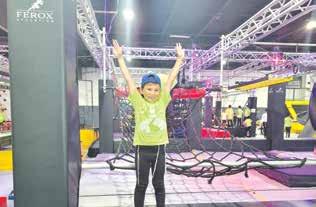

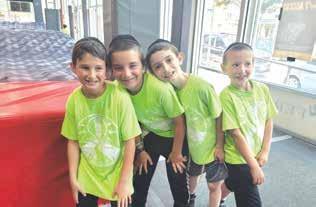



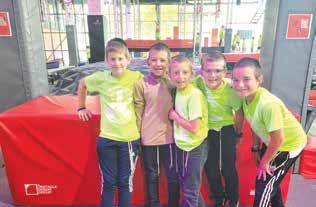

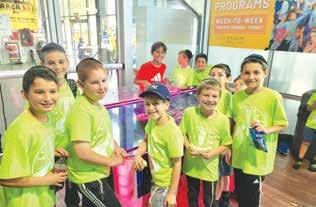


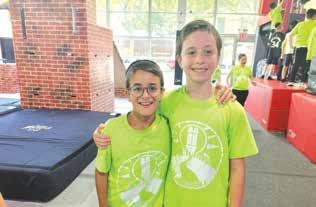


It was another incredible week at Avnet Country Day School. With the second session in full swing, the adventures continued to amaze and delight campers of all ages. The youngest Tipot demonstrated their climbing and jumping skills at Launch. They also enjoyed a silly science show that kept them laughing and awed by cool science experiments. Capping off the week was Superhero Day, which saw the campers transform into their favorite characters and meet real-life superheroes who are first responders on a fire truck.
Ma’ayanot girls were all about the action when they flipped and twirled in gymnastics and navigated a ninja course at Launch. In Chinuch, they were transported to Eretz Yisrael while pinpointing key cities on a map. Not to be outdone, the Ma’ayanot boys also visited Launch
and Active Kidz where they soared to new heights. They gave it their all in their Net and Softball Leagues. The Ma’ayanot division also experienced a late night gameshow at camp for B3 and G3 campers.
Agamim girls had an epic week starting with their very own Olympics. Sportsmanship, spirit and creativity were on full display in many categories as four teams competed for the gold, and everyone was a winner in achdut. Sportsmanship was also key for the G’vaot and Harim boys who are competing towards their fast approaching sports league playoffs. Trips were an absolute treat for all of the older campers. Campers in B4B5 and G4-G5 had an awesome day at Adventureland. The oldest campers in B6-B8 and G6-G8 had the sweetest time when Avnet also introduced its first-ev-


er overnight stay at Hershey Park. While the campers enjoyed the rides and chocolate, the Avnet staff delighted in hearing the compliments heaped on them by both hotel staff and Hershey Park workers. They made everyone truly proud!
To enjoy more of the Avnet experience, visit @avnethalb on Instagram.
By Monet Binder, Esq.
How is your health linked with estate planning? Your health plays a significant role in shaping your preparations for the future in general, and how you structure your estate plan in particular.
Longevity and Retirement Savings. Your physical health can have a direct impact on your lifespan, which in turn affects how long your retirement savings need to last. Often, good physical health is associated with longer lifespans which require a more extensive plan. Healthcare Decisions. Consider the potential need for long-term care. Alzheimer’s or dementia could lead to long-
term care issues that you may or may not choose. Your estate plan can help to financially prepare for these possibilities, protect what you own, and allow you to state clearly how you want to be cared for, if you cannot make decisions for yourself. Now is the time to document these things and prepare for the future while you’re still well.
Healthcare proxies and powers of attorney are crucial documents designating people you choose to make medical and financial decisions on your behalf if you’re unable to. Without these documents, a judge decides who will act on your behalf. A total stranger could end up the one making medical and financial decisions for you, which could also drain your estate.
Disability and Its Impact. Poor health can sometimes lead to disability, affecting your ability to manage your own affairs. Including disability provisions in your estate plan ensures that your assets are managed according to your wishes, even if you’re not able to oversee them personally. A trust planning can be particularly useful here, as it allows your chosen person to manage your affairs without the need for court intervention. Again, without a plan in place, a judge will make decisions for you, and those decisions may not be what you want.
Consult a professional who has your best interests in mind, not someone who only focuses on after death documents. Estate planning is also about what happens while you’re still living. Learn the
best way to protect yourself and your family while you’re still living and after you’re gone, and keep everyone out of court and conflict. Call today at 718-5147575 or 732-333-1854.
Monet Binder, esq., has a practice in Lakewood, Queens, and Brooklyn areas, dedicated to protecting families, their legacies and values. All halachic documents are approved by the Bais Havaad Halacha Center in Lakewood, under the direction of Rabbi Dovid Grossman and the guidance of Harav Shmuel Kaminetsky, shlita, as well as other leading halachic authorities.



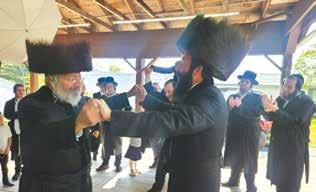

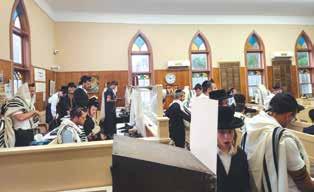



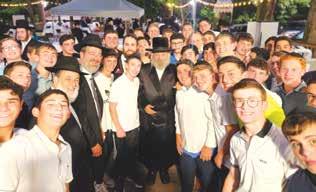






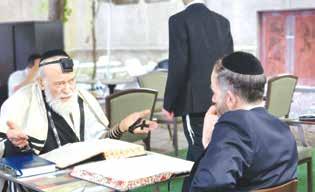

By Yosef Sosnow
They couldn’t believe their eyes! They couldn’t even believe their ears! Was it really possible that this bachur standing before them had once been just like them?! Had this bachur really been an Israeli kid from a non-religious home, wearing jeans and a necklace?! And now?! Now he was being tested on Shas by HaGaon HaRav Shraga Shteinman, shlita, Rosh Yeshivas Orchos Torah!!
Yes, recently in Eretz Yisrael, Acheinu, the kiruv arm of Dirshu, held a unique event graced by Rav Shraga Shteinman as well as the Nasi of Dirshu, Rav Dovid Hofstedter.
First, a bit of background. Acheinu is involved in many areas of kiruv rechokim. In that capacity, they have yeshivos, yeshivos for bachurim with very little background in learning and yeshivos for bachurim who will eventually be mainstreamed into some of the most distinguished yeshiva gedolos in Eretz Yisrael. Where, however, do these bachurim come from? How do these boys from irreligious backgrounds come to be accepted into such stellar yeshivos? The answer is Midrashiyot. Acheinu is affiliated with many Midrashiyot all over the country. Midrashiyot are drop-in centers where local youth can come to hear a shiur, learn Torah or schmooze with a mashpia who will teach them a bit about Yiddishkeit Most of the teens who come know very little about authentic Yiddishkeit, but the Midrashiya is such a warm, welcoming place that they come and are drawn in. The boys are taught basics of Torah and some of them really take to Torah learning. When a bachur has potential, the Acheinu pe’ilim do all they can to try teaching him more and more, eventually encouraging him to attend one of their affiliated yeshivos.
From the Streets to Learning Eighteen Hours a Day!
Earlier this month, a unique event happened at an Acheinu Midrashiya. Rav Shraga Shteinman and Rav Dovid Hofstedter visited the Medrashiya and addressed the bachurim. Perhaps even equally inspiring, however, is what transpired right afterwards. The head of the Medrashiya stood and spoke to the talmidim.
“My dear boys,” he said, “I want to introduce you to a bachur sitting here named Shlomo Yair. Today, this bachur looks like a yeshiva bachur who spent his entire life in the yeshiva but in truth, just a few years ago, he was exactly like you! One day, he wandered from the street into the Medrashiya and asked what Torah is. He had no idea. Slowly we taught him Torah. He had a quick grasp and enjoyed learning. We encouraged him to go to yeshiva, but his mother would not let. She said, ‘With his intellect, he can become a doctor or lawyer! Why should I send him to a yeshiva?’ It was very difficult but ultimately, we succeeded, and he went to a yeshiva. Do you know that today, this bachur, this Shloimy, a bachur just like you, is a baki in the entire Shas, the entire Talmud Bavli by heart! Now he is also learning Yerushalmi. He learns approximately eighteen hours every day!”
Rav Shteinman and Rav Hofstedter were then asked to test Shloimy on Shas. They didn’t make it easy. They asked complex questions, but Shloimy was up to the task. The bachurim in the Medrashiya couldn’t believe it! Rav Shraga Shteinman, a gadol hador and Rav Dovid Hofstedter, a tremendous talmid chacham and author of in-depth sefarim, could not catch him. Every question they threw at him he answered!
In truth, when they completed the farher, they were also totally flabbergasted. How could a bachur who just a few years earlier had been roaming the streets now be a baki in Shas?!
How? That is the power of Torah!
In fact, Rav Shraga Shteinman alluded to this in his remarks to the teens in the Medrashiya. He said, “It is so special and so gratifying to see you, young people, leaving the streets and coming to learn Torah. They can be having so much ‘fun’ and ‘pleasure’ doing other things, momentary pleasure, but instead you are all focused on attaining eternal pleasure. Life is totally different for one who learns Torah. The Torah changes a person,” Rav Shteinman said. “Before learning Torah we recite a tefillah, begging Hashem to illuminate our eyes with His Torah and asking Him to save us from making any mistakes. We then ask him that our friends should also not make

any mistakes. When one learns Torah, he becomes so much more sensitive to others as well. It is not only about me, it is about my friends too. My friends should also not make mistakes. Torah sensitizes us to care about others, to wish only good on others. It is Toras chaim! It is a living Torah! It teaches us how to live, how to be caring and considerate, how to care about Hashem and how to care about our fellow Jews.”
Restoring Neshamos to Their Original Luster
Rav Dovid Hofstedter began his poignant address by saying what a great honor it is to “come here with Rav Shraga Shteinman. Coming here with Rav Shteinman reminds me of the role that his father, Rav Aharon Leib Shteinman, zt”l, together with Rav Michel Yehuda Lefkowitz, zt”l, played in Acheinu decades ago.”
Rav Dovid then continued, “I want you all to realize your potential! I remember years ago, a group of boys that started out just like you, in one of our Medrashiyot, went to learn in yeshiva and completed Masechta Sukkah. I came with them to be tested by Rav Aharon Leib Shteinman. Rav Shteinman spent about a half hour asking them questions. He was so enamored that he went overtime causing the group of avreichim that came to his house for a shiur in Mishnah Berurah to wait fifteen minutes until he finished testing them!
“I once asked Rav Michel Yehuda Lefkowitz, the Nasi of Acheinu, how it could be that these bachurim who just two years ago were on the streets of Israel engaged in nothingness, are today being tested on
entire masechtos. I asked him how such a transformation could happen – is it a nes? Rav Michel Yehuda didn’t seem to understand my question. ‘What is the chiddush?’ he asked? So, I repeated my question and he answered, ‘Did you know the grandfather of these bachurim?’ I said no. ‘Did you know the grandfather of his grandfather?’ Again, I said no. He explained, ‘You have to know what their roots are! Their neshamos come from greatness. They have such powerful kochos from the neshamos that they inherited from their ancestors. It just needs to be ignited and it takes off on its own.’”
From the Acheinu Yeshiva to the Elite Yeshivos in Eretz Yisrael
It was that very koach that was witnessed several days earlier when the leadership of Acheinu, led by Rav Hofstedter, visited the Acheinu Yeshiva Kedosha in Petach Tikva. The Acheinu Yeshiva works with the most gifted talmidim for a few years until they are so capable that they can gain entry to some of the elite yeshivos across Eretz Yisrael. Bachurim from the Acheinu yeshiva are in yeshivos like Chevron, Beis Mattisyohu, Tifrach, Grodno-Be’er Yaakov and others. The yeshiva held a large gathering called Shaarei HaYeshiva where the talmidim’s accomplishments were celebrated with their parents and the yeshiva’s hanhala. When observing the bachurim, the words of Rav Michel Yehuda resonated. It was clear that they were coming with the power of their holy neshamos bequeathed to them by their ancestors. Indeed, that is the story and purpose of Acheinu. To return all these pristine neshamos to their original luster.

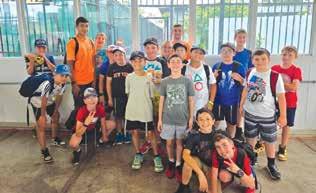
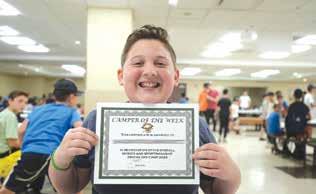
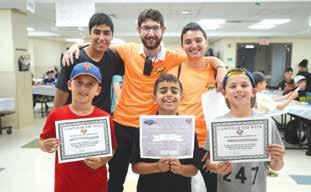







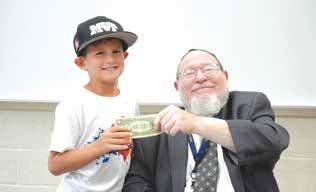



















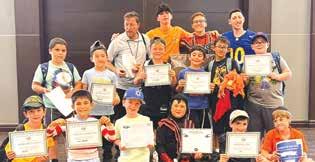


In a remarkable show of support for Israel’s soldiers, Koren Jerusalem is in the final stages of a unique project: producing and distributing pocket-sized editions of the Chumash to those fighting in Gaza, defending the northern border as well as Judea and Samaria. This initiative has been driven by the company’s deep connection to Israel and Zionism, with 25 percent of its staff serving in the reserves for over nine months.
Yehoshua Miller, Koren Jerusalem’s Executive VP and a reservist in the Givati Brigade who himself has spent much of the last year in Gaza, explains the significance of this project: “We understand the profound need for spiritual support during these challenging times. These pocket-sized Chumashim are designed to be durable and portable, making them ideal for soldiers who are constantly on the move and often in harsh conditions. They allow our soldiers to feel a sense of normalcy when they sit to listen to the Torah reading or spend a few moments learning the parasha even under the wildest circumstances.”
The Koren Tanakh, first published more than sixty years ago was, for many years, received by all IDF recruits at their swearing-in ceremonies, highlighting Koren’s dedication to nurturing the spiritual lives of Israel’s defenders as well as their physical connection to the land and state of Israel, themselves operating from the heart of Jerusalem since the 1950’s. By distributing these pocket-sized Chumashim, Koren continues to meet the needs of both religious and non-religious soldiers, offering them a source of strength and comfort.
Matthew Miller, the publisher at Koren Jerusalem, emphasizes the enduring value of these sacred texts: “We have always believed in the power of the Tanakh to provide solace and inspiration. This initiative aims to offer our soldiers a tangible connection to their faith and heritage, no matter where they are.”
In addition to the Chumashim, Koren Jerusalem has produced and distributed tens of thousands of siddurim and Tehillim books, all specially designed for soldiers. This effort has been consistent since the start of the war, ensuring that those on the front lines have access to the timeless wisdom and comfort found in these sacred texts.
Caryn Meltz, the production manager at Koren Jerusalem, has played a crucial role in the logistics of this project. “My son-in-law has been in and out of reserve duty, while my daughter is completing her regular army service in the Kirya,” Caryn shares. “Knowing that we are actively supporting our soldiers with these Chumashim gives me immense pride and peace of mind.”
The project is nearing its conclusion, with the fifth book of Devarim currently going to press. Printing in stages has aided the logistical distribution of the books, a process facilitated by the army rabbinate and through word of mouth. Weeks before the next book of Chumash is meant to be read, Koren receives numerous requests from soldiers to receive both small and large quantities of Chumashim. Koren has received short video clips from soldiers in the middle of Gaza holding up their Chumashim with great pride.
The decision to print in stages was

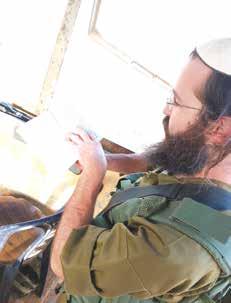
also made with the hope that soldiers would no longer need a Chumash in the field by the time the next book was ready, allowing them to return home to their families and communities. Unfortunately, the ongoing conflict has prolonged their deployment.
Many soldiers have expressed how meaningful it is to have a Chumash with them. “It’s not just a book; it’s a source of strength, a reminder of what they are fighting for, and a connection to their roots and faith,” says one soldier.
Koren’s initiative is more than just a distribution of religious texts. It is a powerful statement of solidarity and support for those who defend the Jewish homeland. As the war continues, Koren Jeru-
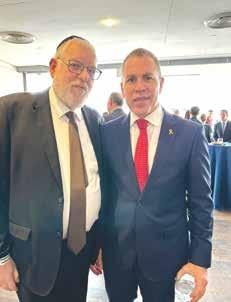

salem remains committed to its mission, driven by a profound sense of duty and a deep connection to the land and people of Israel.
The impact of this project is already being felt on the front lines. Soldiers carrying the Chumashim report feeling a renewed sense of purpose and comfort. “In the midst of chaos, it reminds me of my identity and the values I am defending,” another soldier shares.
In a time of unprecedented challenges, this project stands as a beacon of hope and faith. By providing soldiers with the spiritual sustenance they need, Koren Jerusalem reaffirms its unwavering commitment to the people and the State of Israel.



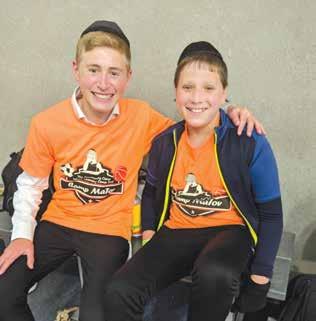
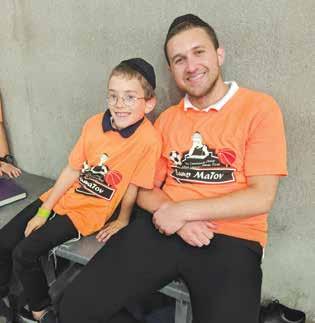

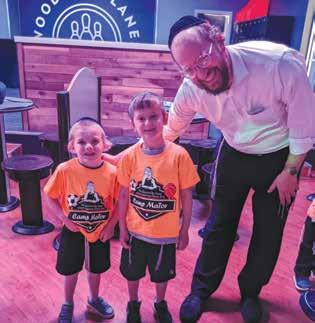



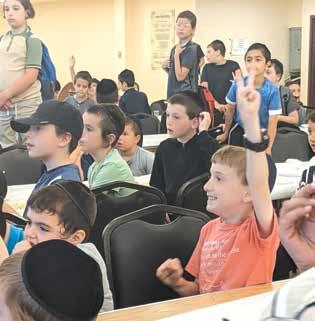
In a packed theater in Holon, Israel, hundreds of teens and staff attended a concert by Ishay Ribo, the beloved Israeli pop singer. The energy was high — people danced, jumped up and down and sang along with conviction, many carrying Israeli flags — and the mood was poignant.
The uplifting event was part of Mach Hach BaAretz, Bnei Akiva’s summer tour of Israel for teens completing the tenth grade. The concert kicked off Shabbat Mach Hach, the Shabbat that brings all 11 Mach Hach buses together for an unforgettable weekend. Shabbat Mach Hach is special every year as the great unifying moment of the program, but this year it was especially powerful — there were soldiers in the crowd, and many of them were Mach Hach staff or alumni. The concert itself was a sneak peak of what’s yet to come this September, as Bnei Akiva brings Ishay Ribo back for round two of his unifying Elul concert at Madison Square Garden (tickets & sponsorships available at bneiakiva.org/ishayribo).
Every year, Mach Hach adds new components to the itinerary to keep the program current. This year, there was no shortage of unforgettable opportunities for the teens, says Rabbi Dan Katz, Director of Mach Hach BaAretz.
“Shabbat Mach Hach is always powerful with 500+ teens and staff joining together, feeling part of a larger program, a greater movement. This is the time that participants feel the power of this program like no other, but this year was even more special because we heard from staff members who shared their per-
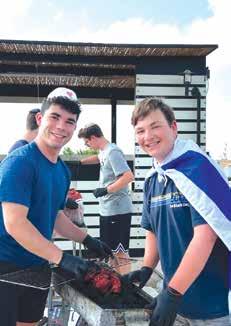
sonal experiences from Miluim-reserves, many fighting in Gaza,” he said. “It was an eye opening experience for campers to hear their stories and truly observe what it means to sacrifice yourself for your nation and land.”
After the horrors of October 7th, and with the ongoing war, Mach Hach took on special significance. Touring the Jewish homeland, the connection and devotion participants felt to Israel was stronger than ever.
One of the highlights of this year’s program was when teens had the opportunity to actively show their support to Israeli soldiers. Each bus went to a different army base where the teens organized barbecues for chayalim. They prepared and served food for the soldiers and in some cases, soldiers’ families, and they also sat and spoke with them, made carnivals for
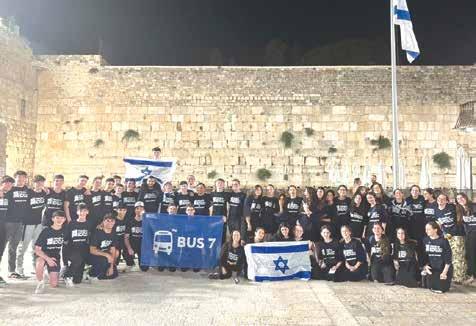
the children, and enjoyed other activities together.
Participants also spent time with families directly impacted by terror, with half hearing from Rav Doron Perez about the loss of his son on October 7 and the other half hearing from Rachel Goldberg-Polin, who shared her family’s story and about her son, Hersh Goldberg-Polin.
Like any other year, however, the teens were also there to enjoy the land.
The opening ceremony got underway in the Old City at the Kotel. In the weeks that followed, campers forged strong bonds and fast friendships. The buses made stops in Jerusalem, Tiveria, and Eilat, taking participants on a summer experience they’ll never forget.
As in other years, campers were able to tailor their experiences to their personal interests by choosing a specialty track
Rabbi Dr. Hillel Fox, director of spiritual services at North Shore University Hospital, has received the Healthcare Chaplain of the Year Award at the recent international Rabbinical Council of America Conference.
Along with his pastoral duties, Rabbi Fox serves as co-chair of the Northwell Health Multifaith Spiritual Care BERG (Business Employee Resource Group) launched earlier this year; he is also the founder and past co-chair of the Jewish Bridges BERG. In addition, he was a founder and co-chair of the North Shore University Hospital BERG Ambassadors. BERGs were established at Northwell,
New York State’s largest private employer, to enhance engagement, innovation, talent development and to promote an inclusive culture ensuring the delivery of culturally sensitive quality patient care.
“I am so honored to receive this recognition from the Rabbinical Council of America that acknowledges the vital work performed daily by the members of our Chaplaincy team here at Northwell,” said Rabbi Fox. “Our mission is to meet with our patients and their families, as well as our staff, during the most critical and sensitive times of their lives and to offer them compassionate care and spiritual support.”
While Rabbi Fox serves the greater hospital community in several capacities, he’s first and foremost accessible to patients and their families. Prior to receiving this award, Rabbi Fox was invited to meet with the President of Israel, Isaac Herzog, who offered the following statement of recognition:
“As the President of the state of Israel and on behalf of Medinat Yisrael, I want to congratulate Rabbi Dr. Hillel Fox for being honored by the Rabbinical Council of America as the Chaplain of the Year.”
Rabbi Fox, a father of seven, resides in Woodmere, Long Island, with his wife, Chana.
to focus on during Adventure Week. They had the opportunity to get a feel for the IDF with the Army track, give back to others with chesed opportunities, hone their sports skills with the sports track, experience Israel’s cultural highlights with Culturefest, and enjoy the great outdoors with Yam l’Yam.
Not just a tour of Israel, Mach Hach BaAretz is an authentic Israel experience committed to Bnei Akiva’s ideals of committing oneself to Am Yisrael, Eretz Yisrael and Torat Yisrael. In line with that authenticity, this year, “living Israel” meant embracing both heartbreak and hope. Campers were immersed in the fun of exploration and following their passions, while also making Israel theirs through forming meaningful connections and giving back to those who need support more than ever.

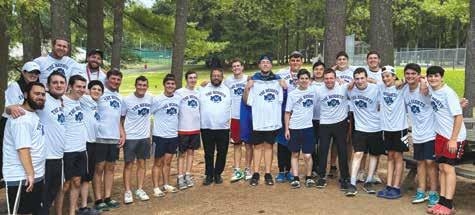
Of the many camps that MTA talmidim attend, the most popular option seems to be Camp Dora Golding. Every year, MTA takes a very full group picture with current and former talmidim, and this year some prospective talmidim as well! It is always a fun visit, as Rabbi Konigsberg, principal at MTA, is also the assistant head counselor at Dora Golding, so he brings his unique ruach to the time spent there. This year, in addition to the summer swag t-shirts that MTA is presenting,
Chickie’s was given out to all of the MTA boys as well! It was a meal enjoyed by all, especially with the Nine Days on the horizon at the time of the visit. Everyone appreciated the swag and sandwich, especially enjoying it with their MTA friends.
The camp visits have almost concluded for the summer, and as August is now well underway, excitement is building for the beginning of an amazing new school year!
“There is one thing the Navi tells us destroyed the Beis Hamikdash – sinas chinam,” shares Rebbetzin Aviva Feiner. “And Chazal say that there’s one thing that is kli machazik bracha, and that is shalom. If we want to bring the geulah, that is what we need to focus on.”
In the spirit of unity and in bringing women from all parts of the community together, the Building Bridges of Unity event was born.
Rebbetzin Feiner recalls how she received a phone call from a woman in Baltimore before Purim, asking her to share a message with women to bring the geulah and to help join Jewish women together. The topic of that event wasn’t about shalom or about achdus; it was about a different topic entirely. But the idea of an event focusing on achdus and shalom in the community was planted in Rebbetzin Feiner’s mind.
What greater time to focus on this crucial subject than during the Three Weeks? And what better day to plan an event for the women and girls in the community on this topic than on the Sunday before Tisha B’Av?
In planning the event, Rebbetzin Feiner envisioned encompassing all female members in community, and in that spirit, she reached out to her sisterin-law, Rabbanit Shani Taragin, to also speak at the event.
Both Rebbetzin Feiner and Rabbanit Taragin will be speaking at the Building Bridges of Unity program. Rebbetzin Dina Schoonmaker and Mrs. Hadas Loewenstern will be delivering messages on unity and shalom via short video presentations. Rebbetzin Slovie Jungreis Wolff will be giving introductory remarks.
The event will be held in Beth Sholom in Lawrence, NY.
Rebbetzin Feiner points out how apropos the venue is considering the topic.
“Shalom will build the Beis Hamikdash,” Rebbetzin Feiner adds. “We can effect change here. We can get along with our brothers and our sisters. That’s where we can start.
“It’s a big job but shalom brings bracha, and we can start right here.”
Building Bridges of Unity will be held on Sunday, August 11, at 7:30 p.m. in Beth Sholom, 390 Broadway, Lawrence, NY.

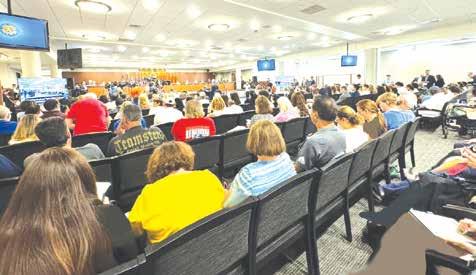
By Moshe Hill
After a six-hour long contentious hearing in Mineola, the Nassau County Legislature passed the “Mask Transparency Act,” which was introduced by Legislator Mazi Pilip, which makes wearing a mask in public spaces for the purposes of hiding your identity a misdemeanor. A packed chamber was the grounds for open debate between legislators, a rowdy viewing crowd, and at least one arrest.
As the meeting began, the Legislature saw a small group of protesters, with a dozen pro-Palestinian demonstrators and a few pro-Israel counter-protesters. That was nothing compared to what was happening inside, where the atmosphere was tense and highly charged, with legislators and attendees often shouting, reflecting the polarized views on the proposed legislation.
The bill’s supporters argued that it was a necessary measure to curb rising incidents of violence and hate speech at protests. Congressman Anthony D’Esposito, a vocal advocate for the bill, opened the discussion by highlighting the dangers posed by masked individuals at protests. He cited recent events, including flag burnings at Union Station and violence on educational campuses, as evidence of the increasing threat. “This county has seen a startling rise in anti-Israel, anti-America protests,” D’Esposito stated, adding that “these protesters are bad actors who burn the American flag while proudly brandishing Hamas and Hezbollah banners while hiding behind masks.”
He stressed that the bill was not in-
tended to target individuals wearing masks for health or religious reasons, nor the elderly or sick, but rather those who use masks to avoid accountability for criminal activities. “It is vital for these bad actors to remove the masks and get seen in the light,” he emphasized.
State Senator Patricia Canzoneri Fitzpatrick, representing the 9th Senate District, echoed these sentiments, asserting, “This does not apply to individuals wearing a mask for their health. This is for protests whose sole intent is to promote hate speech and harassment.” She underscored the bill’s focus on intent, calling for clarity and urgency in passing the legislation. “This is about intent to do harm. Let’s not play games.”
Senator Jack Martins supported the measure by drawing a parallel with car license plates, suggesting that just as vehicles must be identifiable, so should individuals at protests. He emphasized, “This is about accountability. This is about enforcing the law that we have sworn to do.”
Senator Steve Rhoads framed the bill as a response to the state’s repeal of a 175-year-old mask law, noting, “This is an attempt to ensure that peaceful protest remains peaceful.” He invoked the “Never Again” ethos, a rallying cry against antisemitic violence, to underscore the moral imperative of the legislation.
Opponents of the Mask Transparency Act voiced concerns about potential unintended consequences, particularly for marginalized communities. They warned that the bill could disproportionately impact black and brown individuals, potentially leading to racial profiling. “I firmly believe the unintended consequences

will outweigh the intentions,” one critic argued, adding that the legislation could exacerbate existing inequalities.
There were also legal concerns about the bill’s constitutionality and the lack of clear guidelines for law enforcement.
Legislator Delia DeRiggi-Whitton expressed doubts about the bill’s effectiveness and legality, stating, “We agree with the intent, but it’s a poorly written bill.”
Legislator Arnold W. Drucker criticized the bill for being too broad and emotionally driven. “Remove the emotion from this. We propose changes,” he said, revealing that an alternative bill had been filed that morning but was not considered by the majority.
The debate also featured moments of partisan tension. Legislator John R. Ferretti Jr. defended the bill’s bipartisan nature. “This is a bipartisan bill. Members of the minority helped with this,” he said. However, Seth Koslow countered, claiming, “This is not a bipartisan bill. We all agree that we have to do something, but we don’t agree as a legislature.”
Presiding Officer Howard Koppel acknowledged the possibility of future amendments, suggesting that the bill could evolve over time. “We’re not ignoring the Democrat bill. There’s no reason we can’t revisit this and make amendments,” he noted.
Public testimonies were equally passionate. Abraham Hamram, a Jewish rights activist and attorney, shared his personal experiences of ethnic cleansing and displacement, emphasizing the need for the bill. “These people cannot remain masked up while terrorizing people in the United States,” he declared.
Jewish advocates for the bill cheered
loudly when proponents of their position got up to speak, which spurred those against the measure to begin shouting as well. After several warnings from police inside the chamber, one woman in the crowd was so disruptive that police were forced to remove her.
Nassau County Police Commissioner Pat Ryder testified on how the new law would be implemented. He highlighted the practical challenges faced by law enforcement when dealing with masked protesters. He noted, “We cannot act when people get violent in a crowd because when we enter a crowd to arrest someone who throws rocks and wears a mask, it escalates things.”
Despite the heated debate and differing opinions, the common ground among many participants was the desire to protect the community from hate and violence. As Mazi Pilip, the sponsor of the bill, stated, “This legislation was written for one single purpose: to keep our residents safe.”
The meeting stretched into the evening, as a second round of public comments came around, and several mask-wearing individuals testified on how important it is to still be scared of Covid-19. There were multiple calls from this to actually pass a mask mandate, forcing everyone to wear masks at all time and to redeclare a Covid health emergency.
After over six hours of debate and hearings, the Legislature voted along party lines in favor of the resolution. All 12 Republicans voted in favor, and all 7 Democrats abstained. The bill is headed to County Executive Bruce Blakeman’s desk, where he is expected to sign it.

This summer, Camp Kaylie hosted its first ever “Thank You Hashem” day. TYH day began with an inspiring chinuch activity where campers were asked what they thank Hashem for each and every day. Every specialty connected to the Thank hashem theme. From TYH cupcake making to sports, it was all geared towards thanking hashem for what we have. All campers received a
“Thank You Hashem/Kaylie” shirt which created excitement throughout the day leading up to the TYH marathon! Participants arrived by the starting line to an amazing DJ Frabrengin who pumped everyone up for the marathon. As the starttime approached, each camper received a unique racing bib with their personal number. The head staff were out in full force to cheer on the campers. Their en-
For Chavie and Joe Benarroch, hosting people for Shabbos meals is more than just sharing good food and friendship; it’s lifesaving.
They tell a story of a woman who was living in a basement in the Five Towns. She was single and wasn’t invited out for Shabbos meals. Shabbos, for her, meant eating out of a tuna can all alone.
“For people who are single, Shabbos and yom tov can be the hardest times. There is nothing to distract them, and they are all alone,” Chavie says.
She recalls being divorced and spending Shabbos by herself.
“It would take monumental strength to make kiddush for myself, to wash and take a piece of bread and bench.”
At one point, Chavie decided to invite other single people over for Shabbos meals. The camaraderie helped pull her out of her loneliness. Shabbos became a time to give to others and to connect with others.
In fact, hosting Shabbos meals brought Joe to her home, and that’s what ultimately led to them getting married.
The two, even while dating, would host singles for Shabbos meals. Chavie’s home became a place where people knew

thusiasm was infectious, and their cheers provided a much-needed boost to the tireless runners. Whether they were offering encouragement at the starting line or celebrating with finishers, the division heads exemplified leadership and support, embodying the spirit of the marathon.
The “Thank You Hashem” marathon wasn’t just about crossing the finish line;
it was about coming together as a community, supporting one another, and joining together as we thank Hashem and recognize it all comes from Him. The event highlighted the importance of teamwork and the joy that comes from participating in something greater than oneself.
they would be welcome. They knew there was always a place for them at the table, replete with Chavie’s signature warmth and smile.
After a while, people suggested that they host single events.
“The first event we held was in 2016. We hired a mentalist. It was a lot of fun. And we realized that people really liked our event. It was high-class; it was ‘next level.’ And so, we decided to host more events for singles,” Chavie says.
In that spirit, they called their initiative “Next Level Frum Singles.”
“Within the last five years, I can comfortably say that at least 2,000 people have come to our house either for Shabbos or for events,” Joe adds.
Chavie clarifies, “We aren’t hosting events because we are counting how many shidduchim we are making. That’s not the point. The point is to make people feel welcome and less alone. We don’t care about the numbers. We are doing it purely for the chessed.”
They share that people may meet someone to date at their events – but Chavie and Joe may not even know about it.
“They bump into us months later and
tell us, ‘Oh, I met someone at your event, and we were dating for six months,’” Joe says. “Or they’ll tell us that they met a friend who they now go on trips with or have helped with getting a job. I always say, they may not meet ‘the one’ at our event, but they’ll definitely meet people who they can connect with.”
Going to these events may give people the desire to start dating again or give them the confidence to go to other single events and meet other people.
“We want to make sure that everyone who comes to our events feels respected. We understand what they’re going through; we were there at one point, and we understand what life is like at that stage. That’s why we run our events so professionally. We’re generous with our food. We want people to know that we respect who they are,” Chavie says.
“I found meaning in my suffering,” she adds. “And I want to give to others and help them in their situation.”
Chavie and Joe are passionate about helping people. They urge other people in the community to invite single people to their Shabbos tables.
“People say, ‘Oh, I don’t know anyone.’ That’s impossible. You know some-
one. Look for people in your shul. Even if they don’t look like they ‘need’ a meal, approach them and invite them to your home,” Chavie suggests.
She adds one caveat: “Don’t make it a ‘project.’ Don’t ask them if they ‘need’ a meal. You would never ask that to a married friend. Invite them respectfully, before Shabbos, so they know they are wanted.”
The next upcoming Next Level Frum Singles event will be held on Shabbos Nachamu in the Five Towns.
“The people who come to our events are frum, mature, serious – they are truly ‘next level,’” Chavie says.
The weekend will start on Friday afternoon and will extend into Sunday morning, with a breakfast. Rabbi Dr. Daniel Schonbuch will be one of the speakers.
“No one does it like we do,” Chavie adds.
Joe says, “That’s why everyone feels comfortable with us. We’re there just to make sure everyone feels welcome.”
To register for the Shabbos Nachamu Next Level Frum Singles event, email frumsingles7@gmail.com or call 516366-4050.

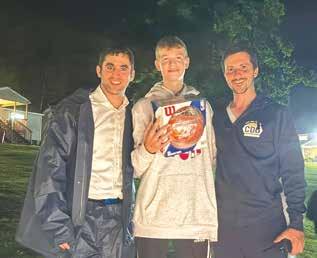
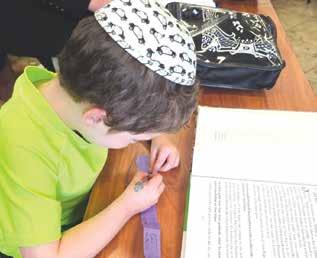
IBy Avromi Mostofsky
have been involved with Camp Dora Golding my entire life, and my family has been part of CDG for half of its existence. This past Shabbos, my son made a siyum on Mishnayos Sukkah. At only five years old, he was the youngest mesayem in the room, yet as he sat among nearly two hundred other boys, he blended right in.
Shabbos was always a highlight for me as a camper. The zemiros in camp were always electric. Somehow, as kids get older, it sometimes can seem “uncool” to sing. Everyone knows that if the oldest boys are involved, the youngest see this and get excited, too. Recognizing that the Malchus division (the oldest campers) really do enjoy zemiros but just needed a little push, the camp created an exciting new incentive. Each boy who attended and participated in zemiros this summer was entered into a raffle. At each seudah, the boys were handed specially designed tickets, which they saved for the final night of camp. They turned the tickets in for a raffle ticket. The Malchus Supreme (traveling program) boys could win a Shaq-signed basketball, while the others could win a Mike Piazza signed PSA-9-rated baseball. The raffles had the desired effect. The boys were up front at each meal, screaming as they competed against the younger divisions for who could sing louder. The little kids were so excited that it got them even louder. As usual, CDG showed the campers that they are willing to do what it takes to make camp as exciting as possible.
This summer is historic as the camp will celebrate its centennial next year. Sometimes I marvel at the changes since my first summer in 1998. There was no AC in the dining room or bunks, the shul was small and always too hot, and the dust from golf carts was unbearable. Our metal bunk beds constantly shook and made noise. It sounds challenging, yet I remember those years fondly. We didn’t mind drinking sink water, singing zemiros for hours, playing football on a hill, using subpar hockey equipment, or dealing with other “issues” of the day. To us, this was camp life.
My brother became a bar mitzvah in 1998, and we celebrated in Israel, arriving two weeks late to my first summer in camp. Other than that year, I always got “first dibs” on the beds in the bunk, thanks to my other brother, who was a counselor at the time. He would call my parents to tell them my bunk, and as soon as I got off the bus, I ran to secure my spot. After supper, we’d have orientation from Alex Gold, who would share some of his now-famous lines such as “don’t write on the wall; if I want to know Shloimie was here in 1999, I can look on my computer,” “don’t skip rocks in the lake; I saw someone do that once, and it went all the way to the other side and hit someone in the face” (we always doubted the veracity of this story), and “the smoke detector batteries are for just that, not to be taken out and used in your gaming thingy.”
After curfew, Alex made rounds, visiting each bunk and introducing himself to the new campers. Although it’s been quite some time, I never forget the large
jar of pickles he brought with him. More amazing than the pickles was how well he knew each boy. As soon as someone said his name, Alex instantly responded with his Yeshiva name, shul, siblings’ names, and city. We often joked about this, but it showed how deeply he cared. Each boy mattered as if they were the only registrant of the summer.
Today, the camp is unrecognizable. Every building is insulated and air-conditioned. The roads are paved. The shul is enormous, and there’s a state-of-theart theater, gym, and go-kart track. The courts and fields have also been improved, including two football fields, a new baseball diamond, pickleball courts, and more.
Watching my son eating his nosh among the many others who finished Mishnayos was the greatest moment of my twenty six years involved with CDG. By now, many have heard of Rabbi Sauber’s learning program; it’s not every (or any) camp that auctions off thousands of dollars in prizes for the learning program. While the learning program budget is generous, most of the funding comes from alumni.
The partnership of Yissachar and Zevulun is well known. Yissachar learned all day, and Zevulun, who were businessmen, supported their learning. It was considered as if Zevulun themselves accomplished the learning of Yissachar. To put this in context, it would take an individual over two-thirds of a year, learning 24/7, to match what the boys who were “Max Miles” learned. This learning was voluntary and does not even include
the hours learned by boys who were not “Max.”
For a simple sponsorship, our alumni are literally buying months of learning, something even the greatest among us rarely achieve. And those who do partner consider it a true partnership. We take pride in the campers’ accomplishments. It meant even more to me to learn in the camp Beis Medresh with my son as he completed his first Mishnayos. The feeling in the air was electric. My wife said seeing the mass exodus of over four hundred campers and staff members at the end of the third hour of learning was powerful.
Saturday night was the annual Max Miles auction, with over four hundred campers in attendance. It is always a special event, and this year was no exception. All the rebbeim sat at the front, celebrating with their talmidim.
The final night of the trip was the highly anticipated auction. The building shook from all the noise as a Tom Brady signed helmet, Gronkowski jersey, Soto jersey, Mickey Mantle baseball, and other tremendous prizes were announced. After my son was successfully tested on his knowledge of Sukkah by a camp rebbe, I thanked Rabbi Sauber, the learning director, for his program and what it did for my son. His response will stay with me forever: “When you take care of Hashem’s children, Hashem takes care of your children.”
The learning program is a passion of mine, but as a lifelong camp enthusiast, I know how difficult trip change day can be. Both campers and staff

find it challenging. As a camper, the day feels like it drags on forever. Your friends may have gone home, and now you’re “stuck” behind, with no activities, cleaning your bunkhouse all morning. If you’re moving bunks, you need to readjust all over again. To make matters worse, after sitting through orientation the first day of camp, you’re now forced to do so again with the new kids.
As the Maintenance Director for a few years, trip change was one of the hardest days for us. The maintenance crew worked non-stop, cleaning bunks, collecting garbage, trying to finish before the new boys arrived to greet them with a perfectly clean campus. This is no small task and is quite stressful. Yet this year, none of this held true.
The assistant head counselor, Rabbi Danny Konigsberg (himself an alumnus), had a brilliant yet simple idea. One of the days campers used to love was “pay day.” If you’ve ever been to camp, you may have had this as well. Various jobs are
assigned dollar values, and you can get paid for doing them. In addition to cleaning tasks, it includes things like sending a letter home. (So if your child goes to CDG and you just received your first letter, you can thank Rabbi K!) The day ends with bunks bidding on prizes with the money they’ve earned.
Pay day made cleaning their bunks fun and was extremely effective. The current maintenance director and his staff not only cleaned every bunk in record time but also mopped all the floors before the new campers arrived. The shul’s sefarim were all in their proper places, and the grounds were beautiful. While the results were great, it was not the only reason he made pay day on trip change.
As it’s the Nine Days, there is no swimming. Finding alternatives to help campers cool off while complying with halacha is not always easy. One of the favorite payday jobs is “washing cars.”
Many bunks signed up to wash the gators and cars, having a blast while getting soaked. The campers who normally sat
How can we make the Nine Days a meaningful yet exciting experience in Camp Revach? With our Chessed Marathon, of course! We traveled across town as a community chessed machine on the lookout for every opportunity possible to help others. Here is an idea of just some of the exciting things we did: We washed Hatzalah ambulances so they would be ready in case of any emergency. Our campers also delivered doughnuts to the police station to show our hakaras hatov to them for helping to protect us. We even raised money for Hatzalah
with our cookie sale! If you were in Gourmet Glatt, you might have even seen us on our scavenger hunt where we bought items that we stocked ourselves in a local food pantry. If that wasn’t enough, we then ventured to Dollar Tree where we were assigned to a fellow bunkmate. We then thought about that girl’s interests and had to buy something that she would specifically appreciate. Who knew that doing chessed could both be so fulfilling and be so much fun? With Hashem’s help, we will have next year’s Chessed Marathon in Yerushalayim!

around bored waiting for the new arrivals were entertained the entire day. Some gators even looked clean, and the campers took pride in that! It truly was a great way to cool off.
When the new campers had orientation, the first trip campers went to the theater, where Rabbi Konigsberg, decked out in a top hat, led an amazing auction. The bidding was fierce, and the prizes sold out in minutes.
Once again, the team at CDG proved that innovation is possible even after nearly 100 years. Next year, the learning program will have unheard-of prizes, and the camp programming will be unrivaled. After all, what else would you expect from the oldest Orthodox Jewish camp in America?



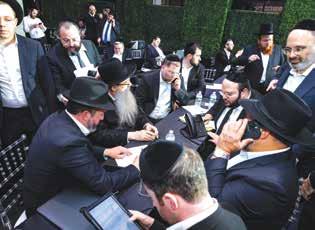
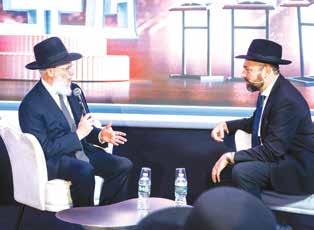
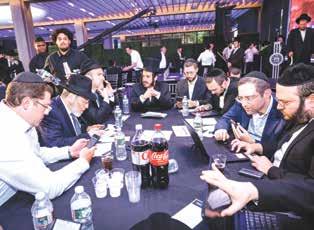


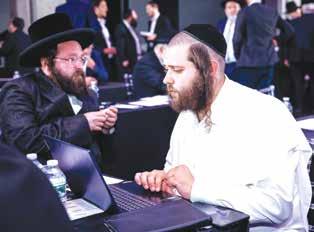
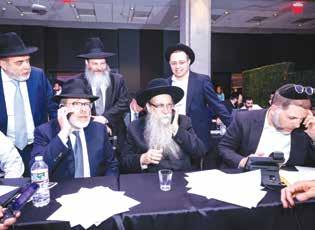

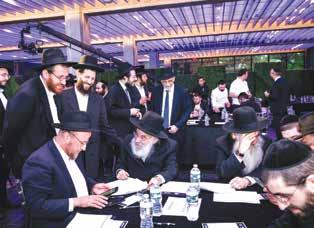



On Sunday, the BACH Jewish Center’s Youth Department hosted a special Sunday Fun Day Magic Show. The event was part of the BACH’s weekly series of youth events during the summer.

As Hillel Day Camp wraps up Week 6, we reflect on the incredible experiences and achievements that have made this week so memorable for our campers and staff. This week’s theme of “Achdut and Togetherness” resonated deeply with everyone at camp.
As we entered the Three Weeks, we focused on unity and solidarity, saying Tehillim for the people of Israel and the soldiers of the IDF. This theme was beautifully woven into every aspect of our week, enriching our activities and interactions with a sense of community and shared purpose.
Our Chinuch sessions emphasized the importance of togetherness, reinforcing the values that bind us as a community. The Grit N’ Wit group activities challenged our campers to work together – demonstrating resilience and cooperation in a fun and engaging way. The beautiful Rikudia dance group brought our theme to life through movement and rhythm, showcasing the harmony that can be achieved when we come together.
A highlight of the week was our wonderful staff night. While both celebrating and thanking our staff, the event brought
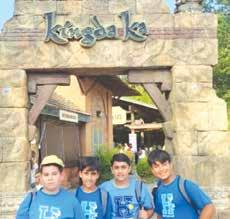
together different groups of staff members in a unifying evening of camaraderie and celebration. It was a night filled with laughter, bonding, and a shared commitment to making Hillel Day Camp the best it can be.
As we move into next week, let’s carry the spirit of achdut and togetherness with us, strengthening our bonds and enriching our camp community. Wishing everyone a restful and enjoyable weekend, a Shabbat shalom, and an easy and meaningful fast. L’shana haba’ah b’Yerushalayim!
Follow the action throughout the week on Instagram @hillel_day_camp

When you step onto the grounds at Hillel Day Camp, there’s a lot to see. You’ll see kids enjoying sports on the fields, swimming in the beautiful pools, and practicing archery or doing Zumba.
With more than 1,000 children calling Hillel their fun place to be this summer, it’s a “mini city” that boasts countless smiles, songs, and laughter over the summer months. This week, we spoke with different staff members at Hillel Day Camp to hear more about the amazing activities and energy that permeate each day.
By TJH STAFF

Tell us about Hillel Day Camp. How many years have you been around?
Evan Leibowitz, HDC Director, NYC DOE Elementary Teacher, and camp parent: Hillel Day Camp was established as HAFTR’s Summer Day Camp almost 50 years ago! Named for the schools that merged to become HAFTR, The Hillel School and HILI (Hebrew Institute of Long Island), many members of our larger Five Towns and South Shore community have spent their summers at Hillel Day Camp. Our legacy runs so deep, we now have children and grandchildren of some of our original campers creating their own memories at Hillel Day Camp.
In what ways do you see the values of HAFTR being reflected at Hillel Day Camp?
Rabbi Asher Klein , HAFTR Mashgiach Ruchani and camp staff:

At Hillel Day Camp, we deeply share the values that HAFTR believes in and share those to our campers on a daily
basis. We value the love of Yiddishkeit, Eretz Yisroel, chesed, Torah learning, and a sense of community. We have continued our Mishna Hawks program and will have completed two siyumim this summer. We ensure the development of our campers’ and students’ talents and interests as evidenced by Hillel’s adaptive schedules and specialized tracks. When someone hears about Hillel Day Camp, what do you want to come to mind?
Ilona Diamond , HDC Program Director and HAFTR High School Coordinator of Student Programs: Variety! With the months of planning that go into our programming, from trips and special events, to specialties, and leagues, I hope that when people talk about Hillel Day Camp, they talk about the joy their children come home feeling after a day of camp because of the variety of activities that speak to all of our campers. Whether they are more sporty, or children who like to participate in different specialties like art, survival, stem, dance, 7 flags and more, Hillel Day Camp offers it all.

Are there special Hillel songs or mottos?
Ilona Diamond : We have a camp song written by
a former staff member to the tune of Mordechai Shapiro’s “One in a Million.” The campers can be heard singing it every Friday at Oneg. Additionally, personally, my motto when it comes to working on planning the programming each summer at Hillel Day Camp is that “Good enough isn’t” – meaning that we strive to be better each summer, push the envelope, and try new things.
How many divisions do you have? How many campers enjoy Hillel Day Camp each summer?
Shana Pollack, HDC Assistant Director, NYC DOE guidance counselor, and camp parent:
At Hillel Day Camp we have four amazing divisions. Our youngest division is from toddlers to kindergarten, our middle division is from first to third grade, our senior division is from fourth to 7th grade, and, of course, our CIT division. Throughout the campus we have over 1,000 campers enjoying camp daily. It is our belief that it is important to provide as much individualized attention as possible since there are so many moving pieces during a typical day in Hillel. We have a 1:4 staff ratio in camp and 1:5 in each group. Each of our divisions has an experienced adult division head that is a professional educator during the year.

We provide adult morahs (counselors) with our groups up to second grade, and this year, we have morahs with the third grade boys, too!
A camp’s staff can really set the tone. Tell us about your awesome staff.
Shana Pollack: We take immense pride in our cohesive and dynamic staff, who are the heart of our vibrant community. Our hiring process is meticulously designed to ensure we bring together individuals whose personalities align with our camp’s values and culture. We go beyond resumes, seeking out those who exhibit a passion for teamwork, creativity, enthusiasm, and a love for our campers. This thoughtful approach allows us to create teams that not only work well together but thrive on mutual support and shared goals. To further foster this camaraderie, we design a variety of fun social events specifically for our staff to strengthen their bonds, build lasting friendships, and ensure that every member feels valued and connected. The result is a happy, cohesive team dedicated to providing the best possible experience for our campers.
How do you keep the camp rocking during lunchtime?
Meira Yagodayev, HDC Division Head, HAFTR teacher, and camp parent: During lunchtime, we play our favorite songs from the HDC Spotify playlist, and before benching we have a dance party competition. The biggest hit that gets us moving and grooving around the lunchroom is “Thank You Hashem Remix.” Winners of lunch dance-offs win slushies!
Adam Brick , HDC Head Counselor, HANC High School Dean, and camp par ent:
We love dance parties and everyone looks forward to our weekly award cere mony on Fridays. I actually have a com petition with Meira to see whose lunch period is more fun!
As you walk around campus, what do you hear most from campers?
Dawn Horowitz , HDC Division Head, HALB Lev Chana teacher, and camp parent: I hear sounds of excitement from the campers as they head to different activities, sports leagues, foam parties, carnivals, and particularly, the new specialties that we have added this summer, like Messy STEM, breakdancing, and our unique specialty at Hillel Day Camp, 7 Flags. I see their excitement, and I have my own excitement as I see Hillel’s uniqueness that there is something for all campers to enjoy. We have adaptive schedules and programs that gear schedules to the groups and the children within the groups.
Let’s talk about some of the great trips this summer.
Adam Brick: Club Getaway, Ring Homestead, Legoland Resort, Adventure Park LI, Six Flags, Urban Air, and TopGolf are just some of the many amazing trips we’ve been on this summer. It’s always great to hear the campers tell us after a trip how they went on the roller coaster they used to be scared of, got to the top of the rock climbing wall for the first time, got their best score in bowling, or learned how to roller skate.
I hear Hillel has an incredible CIT Program? Tell us about it!
Shimmie Dreyfuss, HDC CIT Director, NYC DOE school psychologist, Licensed Mental Health Counselor, and camp parent: The Hillel Day Camp CIT program is a unique and exciting experience for our participants. What makes our
program special is that CITs spend half the day with the younger kids in their bunks, learning from the counselors and getting hands-on experience. The other half of the day, they get to be campers themselves, enjoying all the fun activities camp has to offer. Our CITs are provided the opportunities to take on leadership roles by running special days and events, which help them build confidence and skills. Plus, every week, I run talks with the CITs about different leadership topics, giving them tips and advice to become better leaders.
At Hillel Day Camp, we believe in balancing learning with fun. Our CIT program helps young people grow, learn, and have a blast at the same time. It’s a great way to prepare for future roles as counselors while making the most of the summer.
Summer is about swimming! Tell us about your swimming program.
Sima Fish (not a pun), HDC Aquatics Director, Ezra Academy Principal:
The Hillel Day Camp aquatics program has been cultivated over the years to help campers develop superior swim skills. With three beautiful heated pools constructed for maximum value, 25 members of the swim staff, including American Red Cross and Nassau County lifeguards, Water Safety Instructors, and pool assistants, the aquatics team is always working to create a safe swim environment where children can learn and refine their strokes in the American Red Cross Learn-to-Swim level program, be introduced to new water safety concepts, and become more proficient in all



of these areas. In addition to an instructional swim period every day, campers also enjoy a recreational swim period where they can just enjoy the water, giving them the opportunity to practice or play as they wish. Campers also have games and competitions at the pools including races, water polo, sharks and dolphins, surface diving tournaments and much more once a week on “Fun Friday.” The atmosphere at the pools focuses on kids learning to love the water in a safe environment.
What about your other activities and specialties? What are the campers’ favorites?
Daniel Orenstein, HDC Sports Director, NYC DOE adaptive physical education teacher, and camp parent:
Camp is filled with amazing activities and specialties. We have sports leagues, survival, baking, broadcasting, technology, nature, pakua, art, string art, and jewelry making. Hillel Day Camp also partners with our amazing local businesses such as Lollibop, Warren Levy, Make It, & FIT to give campers the opportunity to enjoy their specialties off the Hillel campus. We also have sports clinics where coaches teach fundamentals of softball, soccer, and basketball. However, my favorite annual activity at Hillel Day Camp is color war! This allows campers to work collaboratively with their peers and motivates them to be their best selves.
Do you have special “days” in camp?
Gari Ann Harris, HDC Special Events Coordinator, LBPS teacher, and camp parent: Hillel Day Camp’s calendar is filled with special days! We began the summer with Red, White, and Blue Day featuring a camp-wide scavenger hunt. We had our Builder’s Bonan
dressed like construction workers and participated in a variety of building activities. On Jersey Day, campers dressed in their favorite sports team’s gear and were surprised by a visit from NY Mets players, Mark Vientos and DJ Stewart. We celebrated Purim in July with fun costumes and a special carnival with lots of fun inflatables! On the 17th of Tammuz, our oldest divisions went to the Israel Chesed Center to pack a variety of supplies for the chayalim and their families. Upcoming special days include PJ Day, Israel Day, and Crazy Sock Day.
I heard there are visits sometimes from VIPs. Can you let us know who has been visiting Hillel Day Camp this summer?
Evan Leibowitz: We had our annual Mets Day with special visitors star 3rd baseman Mark Vientos and outfielder DJ Stewart. Our campers enjoyed hanging out with the players and got autographs, pictures, and had questions and answer sessions. We’re looking forward to our annual Shabbos Nachamu Concert featuring up and coming singing sensation Dovid Pearlman. We can’t wait to rock it out!
What is something that you are really proud of for this summer?
Simcha Frischman , HDC Assistant Sports Director, DRS educator, and camp parent:
Sports leagues are truly an amazing outlet for our second through seventh graders to increase and show off their skills and camaraderie with their teammates. There’s such great sportsmanship in each of the many league sports being played. For our younger campers, it’s amazing to see how far they’ve come in learning their foundational skills in different sports.

Hillel Day Camp sounds like a great place to be! What would you say makes Hillel Day Camp unique?
Adam Brick: Hillel Day Camp really is a special place. Attending Hillel is an opportunity to practice new skills, learn new things, and make friendships that will last a lifetime.
Evan Leibowitz: Although I can praise the fact that we take a year’s worth of activities and events and pack it into eight short weeks full of learning and excitement, to really get a “feel” for the uniqueness of Hillel, after Shabbos, I urge you to watch some of our weekly videos on our YouTube page or our Instagram page @Hillel_Day _Camp. They are full of smiling campers and staff, kids learning how to swim, participating in sports and special activities, and enjoying off and on campus entertainment.
U 1,200 people arriving daily in our Mini City called Hillel Day Camp
U 35 buses taking kids to and from Hillel Day Camp
U 50 bunks of campers
U 25 American Red Cross + Nassau Certified Lifeguards teaching our campers how to swim
U 1:4 staffing ratio

U 1 in a Million –Hillel Day Camp!
U 1 mascot named Quackers



by Rabbi Yechiel Spero
Kinnah 9: Eichah tifarti
This Kinnah speaks of brachos (blessings) and kelalos (curses), with the last line of each stanza containing a quote from Parshas Bechukosai, where Hashem speaks about the blessings and curses. He promises that if we follow His mitzvos and behave properly, we will be blessed with many amazing rewards: wealth, peace, protection, and best of all, His Shechinah among us. At the same time, He warns us that if we don’t follow His ways and keep the mitzvos, then we will face curses and punishments. This Kinnah speaks about the curses that came upon us because we did aveiros
Even though we may face difficult times as a result of not keeping the mitzvos, we must understand that Hashem never stops loving us. That love is hidden inside the punishment.
The following true story can help us
understand how Hashem’s love works, even when things seem scary or difficult.
Toward the end of the summer, the Levy family went to a men’s beach near their home in Eretz Yisrael for a mini-vacation. The kids paired up as buddies to look out for each other while swimming, and they all had a blast.
At 7:00, Mr. Levy called everyone back. The children gathered up their tubes, towels, and goggles, and placed everything in their swimming bags. But then Mr. Levy noticed that Nachi, his seven-year-old son, was missing.
Shalom, Nachi’s buddy, then explained that at 6:30, Nachi had said he was tired and was heading back to the beach. Since they were close to the shore, Shalom had watched him walk back most of the way, and then jumped back into the water for the last half hour.
Now, the question was: Where was Nachi?
The Levys and the lifeguard searched the beach frantically. By 8:00, the Levys were in full panic mode, as it would soon be dark. The lifeguard called the author-

ities and soon the beach was filled with rescue crews, Hatzalah members, and helicopters, all using powerful searchlights. The boys cried as their father called their mother to come. Word spread throughout the city to daven for a lost child.
The search continued through the night. As the sun began to rise, the Levys were losing hope. What were the chances that a seven-year-old could survive the whole night in the water?
But just then, they heard happy sounds over the radio. “Hayeled nimtza. V’hu ba’chaim! The child has been found. And he’s alive!”
The Levys cried tears of joy and relief. Nachi was alive. He had spent the whole night in the water, holding onto his tube.
He was rushed to the hospital to check that all was okay. Baruch Hashem, he was fine. Holding him close, his parents asked him, “How did you manage the whole night? How did you hold onto the tube without letting go? Didn’t you feel like giving up?”
He answered, “I did feel like giving up. I was ready to let go of the tube. But then I saw the searchlight from the helicopter. Once I knew that you were looking for me, I made sure to hang on until I was found.”
This story teaches us something very important. Sometimes, we may feel lost and without hope, like we’re drifting alone in the dark. But if we realize that Hashem is on the lookout for us because He loves us, we will find the strength to hang on.

A Lesson Look for the “searchlight” of Hashem’s love and know that it’s always there, even when it’s hard to see. Just like Nachi saw the searchlight and knew his parents were looking for him, you can trust that Hashem is always looking for you, ready to bring you back into His loving Arms. Reprinted from A Most Meaningful Tishah B’Av by Rabbi Yechiel Spero with permission from the copyright holder, ArtScroll Mesorah Publications.
This past Shabbos was a great simcha at BJX. Susan was a Jew, almost entirely lost to her roots. Her great-grandparents were exceedingly frum and Torahdik and were devastated when their only daughter, Susan’s maternal grandmother, went off the derech and married a Italian Catholic. They sat shiva and never recuperated. However, remarkably, the Italian Catholic husband encouraged his wife to light candles and keep Kosher. She would light Shabbos candles every Friday in a house surrounded by pictures of the pope! She whispered to Susan as a baby that Susan will re -
turn the family heritage to Yiddishkeit. More than 45 years later that wish has become fulfilled. Susan was totally secular. After October 7, she joined a liberal Conservative temple with a female rabbi. But her neshama wanted more. She found BJX in Brooklyn, NY, and started keeping Shabbos and taking upon herself mitzvos. This past Shabbos, she finally received her Jewish name during Krias HaTorah at BJX and officially became known as Shoshana. Mazal tov! Soon Susan will be heading off to learn in Eretz Yisroel. We are exceedingly proud of her growth and commitment to continue learning.



I would rather have a German division in front of me than a French one behind me.
- General George S. Patton

Going to war without France is like going deer hunting without your accordion. - Norman Schwartzkopf
We can stand here like the French, or we can do something about it. - Marge Simpson
Boy, those French. They have a different word for everything. - Steve Martin
How can anyone govern a nation that has 240 different kinds of cheese? - Charles de Gaulle
Everything is on such a clear financial basis in France. It is the simplest country to live in. No one makes things complicated by becoming your friend for any obscure reason. If you want people to like you, you have only to spend a little money. - Ernest Hemingway
Yankel and his wife are about to take a dream vacation to Paris when they stop at the dentist on the way to the airport.
“I want a tooth pulled, and I don’t want Novocain because I’m in a big hurry,” his wife says. “Just extract the tooth
The French are a smallish, monkey-looking bunch and not dressed any better, on average, than the citizens of Baltimore. True, you can sit outside in Paris and drink little cups of coffee, but why this is more stylish than sitting inside and drinking large glasses of whiskey I don’t know. - P.J. O’Rourke
In Paris, they simply stared when I spoke to them in French; I never did succeed in making those [people] understand their language. - Mark Twain
The only time France wants us to go to war is when the German Army is sitting in Paris sipping coffee. - Regis Philbin
I hate France. It’s like the whole country’s on a diet. - Gordon Korman
Let’s face it, the French Army couldn’t beat a girls hockey team. - Bill Bryson

as quickly as possible, and we’ll be on our way.”
The dentist is quite impressed. “You’re certainly a courageous woman,” he observes. “Which tooth is it?”
The woman turns to her husband and says, “Yankel, show him your tooth, dear.”
1. How many times has Paris hosted the Olympics, including the 2024 Games?
a. 3
b. 7
c. 10
d. 22
e.
2. Approximately how many annual visitors are there to The Louvre Museum in Paris?
a. 365,000
b. 1.2 million
c. 4 million
d. 18 million

d. Germany
e. Netherlands

What happened in the French Revolution?
a. Napoleon was overthrown
b. The French monarchy was overthrown
c. France broke away from the Roman Empire
d. French fries were created
6. Which of the following is true about the Eiffel Tower?
a. It is 120 stories high
b. It has a restaurant at its peak
a. Franc
b. Franck
c. Euro
d. Dollar
9. Which of the following artists was not born in France?
a. Henri Matisse
b. Claude Monet
c. Vincent Van Gogh
d. Leonardo da Vinci
Answers:
3. What is the national motto of France?
a. Pain, bérets et barrett (Bread, berets and barrett])
b. Liberté, égalitié, fraternité (Liberty, equality and fraternity)
c. Liberté et prospérité pour tous (Freedom and prosperity for all)
d. Petites portions mais bonnes (Small portions but good)
4. Which of the following countries does not border France?
a. Luxembourg
b. Switzerland
c. Spain
c. It was built for the World Fair in 1889 and was supposed to be taken down after 20 years
d. It was destroyed during World War I and rebuilt with an exact replica
7. What is the name of the oldest bridge in Paris, built in 1604?
a. Pont Neuf
b. Viaduc de Millau


Wisdom Key:
Pont d’Avignon
d. Passerelle Simonede-Beauvoir
8. What is the French monetary currency?
7-9 correct: You win a three night’s stay at TJH’s French Riviera villa. (I’m there now for the Olympics, so you will have to wait until sometime in the fall or whenever; we will work out the details later.)
3-6 correct: You are good but missing something—kind of like French fries without ketchup.
0-2 correct: You are as bright as a French beret.
The nine days of mourning for Jerusalem’s fall and the destruction of the Temples are upon us. This Shabbos, which always precedes Tisha B’Av itself, takes its name, Parshas Chazon, from the haftorah of the prophet Yeshayahu read in the synagogue. The words of the prophet condemn the social ills of his times and society – governmental corruption, economic unfairness, and a lack of legal and social justice. But these are the problems that have plagued all human societies from time immemorial. And they are omnipresent in our current world and national society today as well.
So, at first glance, one could conclude that the prophet is making impossible demands, since human behavior and social interactions can never eliminate these issues fully. And we are all well aware that the Torah never demands the impossible from its human subjects. So what is the point of the prophet’s criticism and harsh judgments? What is it that he really demands from us fallible mortal creatures?

By Rabbi Berel Wein

I feel that he demands of us that we at least realize and recognize the shortcomings in our society. We may not be able to correct them all completely, but we should know that they exist. We should never allow apathy the ability to over -
become complicit in our own eventual destruction.
The Chofetz Chaim is reputed to have said that what motivated him to write his monumental work about the evils of slander and evil speech was that he no -
He demands of us that we at least realize and recognize the shortcomings in our society.
whelm our better instincts and arrest our never-ending quest for an improved social structure.
The prophet demands that we remain relentless in trying to improve the social conditions of the world we live in even if we know at the outset that complete success is beyond our human capabilities. By accepting our societal deficiencies without a murmur of regret or complaint, we
ticed that people who had engaged in such speech no longer exuded a sigh of regret over their words. Evil speech had become societally acceptable, and there was no sense of shame or embarrassment present about engaging in that type of behavior.
Shame is a great weapon for good, and when it disappears from society, when brazen self-interest and greed is somehow legitimized, then the prophet
warns us of impending doom. Politicians disgraced by their previous behavior openly vie again for public office as though having served one’s time in jail or being forced to resign from public office wipes their slate clean permanently.
A society that knows no shame, whose leaders never recognize the moral turpitude of their past behavior, dooms itself to the ills of favoritism, corruption, and unfairness that will plague its existence. The prophet demands of us that even if we are unable to correct all ills and right all wrongs, we should at least be ashamed that such ills and wrongs exist within our society.
That recognition and sense of shame that accompanies it serves as the basis for possible necessary improvement in social attitudes and societal behavior. Then the prophet’s optimistic prediction, “Zion shall be redeemed through justice and those who return to it will also find redemption through righteousness,” will be fully fulfilled.
Shabbat shalom.


By Rav Moshe Weinberger
Adapted for publication by Binyomin Wolf

Rav Yaakov Yitzchak of Peshischa, known as the Yid Hakadosh, zy”a, studied a few psukim from Sefer Devarim every day and encouraged his chassidim to do the same in order to increase their fear of Heaven. He called Sefer Devarim the best mussar sefer. The Maharal, Reb Tzadok Hakohein and others explain the deep essence of Sefer Devarim, but on a simple level, we must understand the unique nature of the sefer and why Shabbos Chazon, the Shabbos before Tisha B’Av, always occurs on Parshas Devarim.
There is a pasuk in Shmuel (2:1:18) which refers to a mysterious book called “Sefer Hayashar,” “the Book of the Upright.” The Gemara (Avoda Zara 25a) offers a number of opinions regarding the identity of this book:
Rabbi Chiya bar Abba says in the name of Rabbi Yochanan, “This refers to the book of Avraham, Yitzchak, and Yaakov [Sefer Bereishis] who were called upright...” Rabbi Elazar says, “This refers to the Repetition of the Torah [Sefer Devarim]. Why is it called the Book of the Upright? Be -
cause the pasuk (Devarim 6:18) says, ‘And you shall do what is upright and good in the eyes of Hashem.’” Rabbi Shmuel bar Nachmeini says, “This refers to the book of Shoftim. Why was it called the Book of the Upright? Because the pasuk (Shoftim 21:25) says, ‘In those days there was no king in Israel; each person did what was upright in his own eyes.’”
The Maharsha, commenting on this Gemara, points out that it is understandable why Bereishis would be called the Book of the Upright since its central theme is the lives of our upright forefathers. It is also understandable why Shoftim would be called the Book of the Upright because the people at that time were the antithesis of that which is upright. Why, he asks, would Sefer Devarim be called the Book of the Upright based only on one pasuk that uses the word “upright”? Indeed, the word also appears in Sefer Shemos. The Iyun Yaakov, a commentary on the Ein Yaakov, answers that Devarim, not Shemos, is called the Book of the Upright because the word “upright” appears four times in Sefer Devarim and
only once in Shemos, but this explanation is not satisfying. The Navi must have used the title “The Book of the Upright” to describe the book’s essence and not based on a tally of how many times the word “upright” is used in each book.
The Maharsha offers a beautiful explanation. By and large, all of the individual mitzvos are given in the other four books of the Torah. They are given as a list of details; a string of “thou shalts” and “though shalt nots.” The purpose of Sefer Devarim is to wrap all of those details into a unified whole called a “Jew,” a spiritual identity which is greater than the sum of its parts. The purpose of Sefer Devarim is to teach a person how to go above and beyond each of the individual details of Jewish life to become someone who does “what is good and upright in the eyes of Hashem.” Such a Jew connects the dots of each of the mitzvos into one single transcendent reality. He lives not just to fulfill each of his obligations but to make his Father in Heaven proud.
The Gemara (Taanis 15a) says, “Not everyone will merit light and not everyone will merit joy. The tzaddikim merit
light, and the upright merit joy.” Rashi points out that the upright are on a higher level than the tzaddikim. The commentaries ask how Rashi could explain that the upright are greater than tzaddikim. Aren’t tzaddikim also upright? It must be that while tzaddikim keep all of the individual mitzvos, the upright weave all of those details together and go beyond the letter of the law. An upright person sanctifies himself by avoiding even certain things which are permissible because he listens to the voice of Hashem within himself. Hashem’s will is not the sum of everything which is technically permissible or forbidden. An upright Jew asks himself what Hashem wants.
In the Talmud, Rabbi Yehuda normally does not derive anything from the juxtaposition of seemingly unrelated pesukim based on the principle that the pesukim of the Torah are not written in chronological order. But the Gemara (Yevamos 4a) says that Rabbi Yehuda does derive teachings based on the juxtaposition of pesukim in one book: Sefer Devarim. Why? Because a pasuk in Tehillim (111:8) says, “Steadfast [semuchim, juxtaposed]
forever, made in truth and uprightness,” and Sefer Devarim is called the Book of the Upright. Because the pasuk uses the word for “juxtaposed” with the word “upright,” Rabbi Yehuda infers that one can learn from juxtaposed pesukim in the book known as “upright.” Because Sefer Devarim is the Book of the Upright, in which everything about Yiddishkeit is connected, Rabbi Yehuda can derive laws from even seemingly unrelated pesukim which are found side-by-side. In other words, because of Sefer Devarim’s identity as a book which connects all of the seemingly disparate details of halacha, one can derive laws from even the seemingly insignificant order of the pesukim.
The lack of uprightness was the central theme of Yeshaya Hanavi’s rebuke of the Jewish people in the haftorah of Shabbos Chazon (Yeshaya 1:2, 4). He wrote, “Children I have raised and exalted, yet they have rebelled against Me... Woe to a sinful nation, a people heavy with sin, children of evildoers, corrupt children. They have abandoned Hashem, they have angered the Holy One of Israel, they have turned backwards.” One might think that these harsh pesukim must refer to the worst nonobservant Jews who are heretics and idol worshipers.
But it is clear from the pesukim later in the perek that the Navi is speaking to very “frum” Jews! The Navi says (Id. at 12, 14-15), “When you come to appear before Me [in the Beis Hamikdash on Pesach, Shavuos and Sukkos], who requested this of you, to trample My courts? ... Your New Moons and your appointed seasons My soul hates, they are a burden to me. I am weary of enduring them... Even when you
all of the details while forgetting about the heart of Yiddishkeit. They were not upright. They did not study the ultimate mussar sefer, the book of Devarim. They kept only “checklist Yiddishkeit,” without ever asking, “What does Hashem want? What will make Him happy?” They made no effort to fulfill “And you shall do what is upright and good in the eyes of Hashem.” They managed to keep the mitzvos
They attempted to keep all of the details while forgetting about the heart of Yiddishkeit.
pray at length, I do not hear; your hands are full of blood.” The Navi is speaking to Jews who were careful to come to the Beis Hamikdash three times a year. This shows that they were also careful with all of the laws of purity and impurity. They also kept Shabbos and Rosh Chodesh. And not only did they daven, but they “pray at length!” Yet Hashem despises their service.
Why did Hashem reject their service? Because they attempted to keep

but turned away from G-d. Hashem told them through the Navi, “This is not what I asked of you! This is not what I wanted!” Hashem told them (Id. at 16-17), “Wash, cleanse yourselves... learn to do good, seek justice.” The way to rectify their sin was not to become frummer but to become more upright.
How do we see this today? My parents were at a hotel in the Catskills which was full of many frum Jews, both chassidish and litvish. As the guests were leaving the
hotel, they were packing up provisions from the hotel’s catering department for the road. They did not limit themselves to a few cookies for the road, however. Many people loaded up shopping bags full of food to bring back home. They saw one older man accidentally drop a shopping bag he was carrying from the hotel kitchen. Six or seven bags of hot dog buns fell out of the bag. This man may have davened a beautiful Shacharis and gone to the mikvah that morning, but here he was stealing from the hotel. Where is the uprightness?
We must look beyond checking off all of our religious obligations from our Yiddishkeit checklist and ask ourselves, “What does Hashem want from me right now? What would make Him proud?”
May we merit to live upright lives, and may this Tisha B’Av be transformed from a day of mourning into a day of celebration as we greet Moshiach with the arrival of the final redemption.
Rav Moshe Weinberger, shlita, is the founding Morah d’Asrah of Congregation Aish Kodesh in Woodmere, NY, and serves as leader of the new mechina Emek HaMelech.
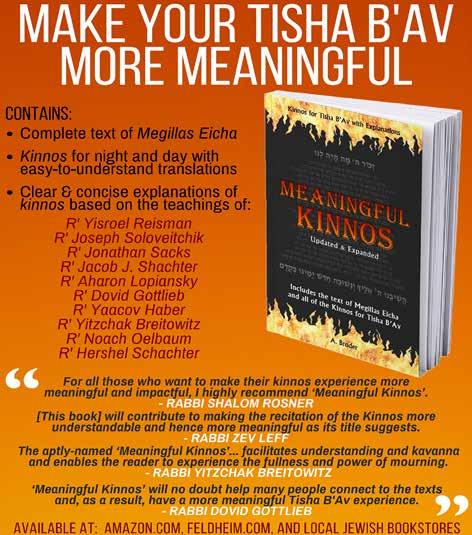
Roy Pearson, who had been out of work for about three years, was appointed to be an administrative law judge. He had gained weight, and he realized he needed to have his suit pants let out. He brought in a pair of pants to be altered, and he planned on wearing them three days later. But a couple of days later, he was told that they weren’t ready. And the day after that, they were nowhere to be found.
Pearson claims that Soo Chung, the proprietor, promised to keep looking for them. But when he returned to the store a week later, Chung tried to give him what she said were the missing trousers. But Pearson said they were not the pants he had left to be altered. Not only was the pattern different, but the pants proffered as his also had, of all things, cuffs. Only once in his adult life, he said, had he worn cuffed pants, and never, he suggested, would he have so altered his treasured Hickey Freeman suit.
Pearson wrote to the Chungs, demanding $1,150 to buy a new suit. When the Chungs did not respond, Pearson swung into action, filing a $67 million lawsuit (the demand was later decreased to $54 million) that would eventually make him the talk of the town and provide fodder for comedians. The case was eventually dismissed. His appeals case likewise went nowhere. To make matters worse for Pearson, he was again unemployed. He sued the District of Columbia for wrongful termination after the district declined to reappoint him to his prior position as an administrative law judge. That case was dismissed as well.
Now, let’s suppose that the customer who was given the wrong pants did not sue the dry cleaners but instead took them home. May he use those pants, which he knows are not his? Further, if the true owner comes to him to claim his pants, may he withhold them until his own pants are found?
By Rabbi Avrohom Sebrow

A similar case was brought to the author of Terumas HaDeshen. He ruled that someone may not use a garment which was mistakenly given to him by a launderer. Further, he certainly may not withhold the garment until his own
in inclement weather: A person comes to shul with a raincoat, only to discover on his departure that there is a similar coat to his own left on the rack. Facing the prospect of walking home in the rain, his judgment may be easily clouded. It
Facing the prospect of walking home in the rain, his judgment may be easily clouded.
garment is located. What right does he have to hold someone else’s garment for his own selfish reasons?
The Terumas HaDeshen bases his decision on a Gemara in Bava Basra. The Gemara says (46a) that if a utensil was accidentally switched at a house of mourning or a wedding, you may not use the remaining utensil without permission.
A similar situation is very common
is very clear from the Gemara that you may not use an item without the owner’s permission just because he took yours.
The Gemara offers no exception to this rule. However, modern poskim have noted some leniencies. If the coat left behind has the owner’s name in it (or is any way recognizable), and the individual who wishes to use the coat knows that the owner would surely let him use his coat and other similar items
without explicit permission, then it is permitted to do so.
Further, the Pischei Choshen offers another leniency in a situation where enough time has elapsed that the person who took the wrong coat surely realized his mistake. In that case, it can be assumed that he would consciously permit the stranded shul-goer permission to use his coat. Indeed, he can rely on this assumed permission without actually hearing it.
Rav Moshe Feinstein, zt”l, advised that every shul should post a sign informing all that if someone takes the wrong coat, then they grant the other person permission to use their coat. This would solve the above dilemma. What should a person do if he posted signs about the wrong coat he took, and the owner never came to claim it? Rav Asher Weiss, shlita, says that a person can simply write down the value and then keep it or sell it. If the owner comes at some point, he will have to provide restitution. This is true for any lost item where the owner is not particular that the original item be returned. The owner only cares about the value. Indeed, Rav Asher Weiss suggests that most lost items fit into this category. A rare sefer that cannot be replaced would be a notable exception. Tefillin may also be an exception. A particularly notable G-d fearing scribe may have written the parshiyos and the owner may not be able to procure an similar replacement. However, most commonly lost items such as toys and coats can easily be replaced.
Rabbi Avrohom Sebrow is a rebbe at Yeshiva Ateres Shimon in Far Rockaway. In addition, Rabbi Sebrow leads a daf yomi chaburah at Eitz Chayim of Dogwood Park in West Hempstead, NY. He can be contacted at ASebrow@gmail.com.

By Rabbi Yair Hoffman
It is the custom within Klal Yisroel to light a yahrtzeit candle on the day that a relative had passed away. This article will discuss the reasons for it, but first, a tefillah:
The lighting has no accompanying blessing, and I am sure that many people find themselves looking for something appropriate, some way to express themselves in a prayer when lighting the candle. This is not only true on a yahrtzeit but whenever yom tov comes as well and Yizkor is said.
The author of the Peleh Yoetz, Rabbi Eliezer Papo (1785–1828), did, in fact, compose such a prayer. Rav Papo was the rabbi of the city of Selestria in Bulgaria. Bulgaria was a part of the Ottoman Empire at the time. The tefillah of the Peleh Yoetz is translated below:
Behold I am lighting this lamp for the rest and uplifting of the soul of my father (or deceased), my teacher _______ the son of _______.
May it be Your will before You, Hashem our G-d and the G-d of our forefathers, that all my good deeds whether in thought, speech or action be done for a merit and a resting and an elevation of the souls of your nation Israel. It should be especially for the soul of my mother/father/ deceased _____. May it be Your will that their souls be bound in the bond of life.
Please note that much of the information below is found in Rav Aharon Levine’s wonderful sefer called “Kol Bo L’Yartzeit” (Vol. I Chap. 1).
• It is a fulfillment of the mitzvah of V’ahavta l’reiacha kamocha. Rav Yitzchok Isaac Sherr, zt”L, Leket Sichos Mussar (p 329), cites three sources for the application of this mitzvah to parents. The Zohar (Raya Mehemnusa Devarim page 281a) writes that we are obligated to love our parents as we do ourselves, for their
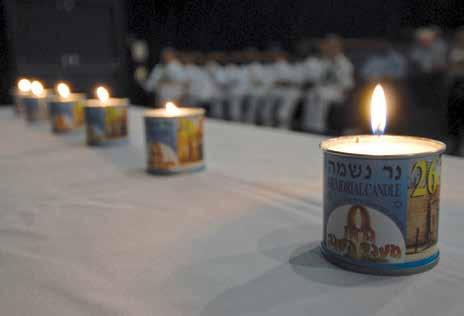
love is equated to the love of Hashem. The Sefer Chareidim 9:37 writes that loving them is part of the mitzvah of honoring them. The Chayei Odom 67:1 also writes that we are obligated in loving them. The matter is of some debate, however, as the Maharal in his Chidushei Agados 31a seems to be of the opinion that there is no greater obligation to love parents more so than other Jews.
• It is a fulfillment of kibbud av v’aim. The Gemara Kiddushin 31b explains that the rabbis taught, “You honor him in his lifetime and you honor him after death.”
Both Dayan Weiss (Minchas Yitzchok Vol. III #136:9) and the Tzitz Eliezer (Vol XII 59:3) are of the opinion that kibbud av v’aim after death is also biblical.
• It is an obligation of hakaras hatov – recognizing the good that one had received from another. This is particularly true that we should recognize all that parents have done for us on a day that we have the ability to give merit to their neshama and assist in them receiving greater reward.
• It brings a kapparah, an atonement
for the neshamos. The Arizal in his Shaar HaKavanos writes that the neshama’s record is reviewed on the day of the yahrtzeit. Thus, when the children do maasim tovim, learn Torah, say kaddish and do other mitzvos, this atones for anything the neshama might have done.
• It brings an elevation for the neshama. Even if the neshama was free of sin, there are different aspects of performances of mitzvos that are taken into account when the neshama reaches the upper realms. Observance of the yahrtzeit assists in elevating the neshama (See Panim Yafos on Behaaloscha “Kach es haleviim”).
• It is a fulfillment of hashavas aveidah. The Gemara in Sanhedrin explains that saving one’s life is a fulfillment of returning a lost object. Certainly, this would be so in regard to restoring the soul to a loftier level.
• It avoids violating lo saamod al dam rayacha. The Torah tells us not to stand idly by one’s brother’s blood. If we just ignore an opportunity to place a parent on a higher spiritual level, this is tantamount
to standing idly by another’s blood.
• It is the fulfillment of the obligation to perform chessed. The greatest chessed is the one that is done to someone that cannot return the favor. Those that are the shochnei afar cannot repay anyone. Observing a yahrtzeit is thus one of the greatest chassadim.
• It counteracts the raya mazlei of the neshama. When a neshama ultimately passes away, there is a raya mazlei aspect to him. Although we say Ain mazal l’Yisroel , at times there are elements that affect the mazal too, according to some Rishonim. Observing the yahrtzeit through the act of free choice of his descendants counters that force.
• It is proper to be pained on that day. This is the day that we have lost a parent. It is wrong not to feel pain on that day.
• It commemorates the day of one’s loss. Only when we truly know the pain of losing something do we truly appreciate the value of what we have. We can appreciate the gifts that Hashem has given us when we commemorate and understand the loss.
• It affords one to empathize with the pain of the parent. Empathy is a very human characteristic that Hashem wants us to develop. On the day of the yahrtzeit, we are empathizing with them.
• It strengthens our belief in techiyas hameisim. One of the pillars of Torah-true Judaism is the eventual restoring of the dead. Also, if we ponder the gift of the yearly seasons, we see how things that wither away eventually come back. This helps us in our belief in techiyas hameisim. The same is true with a yahrtzeit – it helps entrench within us the fundamentals of our emunah.
This article should be viewed as a halachic discussion and not practical advice. The author can be reached at yairhoffman2@gmail.com.
By Professor Adina Broder
There are many important messages in the kinnos of Tisha B’Av that can help us understand why the tragedies of the 9 th of Av happened, as well as what we need to do to earn redemption. Kinnah 31 encompasses both messages. This kinnah contrasts our exodus from Mitzrayim with our exile from Yerushalayim. Through various examples we show that upon leaving Mitzrayim, we were joyous and connected to Hashem; when we left Yerushalayim after the Beis Hamikdash was destroyed, we were despondent and distant from Hashem. By comparing these two momentous events, our grief is magnified because it highlights how our great potential ended so tragically.
This kinnah alternates the ending of each verse, with either b’tzeisi miMitzrayim (when I went out of Egypt) or b’tzeisi miYerushalayim (when I went out of Jerusalem). It is worth noting that the word used in reference to both events is b’tzeisi , “when I went out” (in the singular form). Just as each of us is obligated to envision ourselves as having left Mitzrayim, there is a similar requirement with regard to our banishment from Yerushalayim. Each Jew in every generation must act and feel as if he himself experienced the destruction of the Beis Hamikdash.
One reason the kinnah compares our exodus from Mitzrayim on Pesach with our exile from Yerushalayim on Tisha B’av is because both incidents involved the Jews’ migration from one place to another. But there is another strong connection between these two holidays. The night of Tisha B’Av always falls out on the same day of the week as the night of the first Pesach seder. What is the significance of that?
One explanation is that Pesach is the antidote to Tisha B’Av, since Tisha B’Av epitomizes galus, while Pesach represents geulah. What does this mean in practical terms? The Ben Ish Chai suggests that we can learn how to reverse the sorrow of Tisha B’Av by looking at the Pesach seder – specifically the two
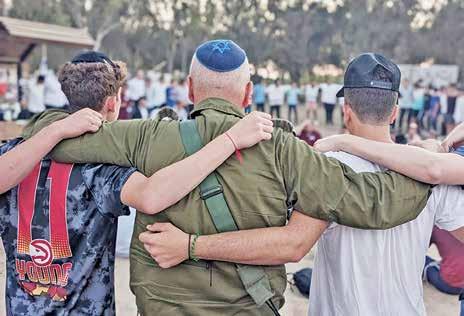
dippings. He says that these dippings commemorate two dippings that are mentioned in the Torah. The first dipping at the seder, of karpas into saltwater, reminds us of when the 10 Shevatim dipped Yosef’s coat in blood after they had sold him into slavery. In fact, Rashi uses the word “karpas ” when describing
This dipping signifies unity in the following way: Bnei Yisrael were specifically told to use a bundle of hyssop – an agudat eizov – to put the blood on the doorpost. But why? Did it really matter what implement they used? According to the Ben Ish Chai, yes, it did. The agudah – bundle – was a critical aspect because
The wrongdoing of sinas chinam, represented by the first dipping, can be cured through unity, which is symbolized by the second dipping.
the coat of Yosef. The karpas dipping represents the aveira of sinas chinam because it was unwarranted hatred that caused the brothers to mistreat Yosef.
The second dipping at the seder is marror into charoset. This commemorates Bnei Yisrael following Hashem’s command to dip a bundle of hyssop into blood and to smear it their doorposts.
it symbolized that the Jews needed to be an agudah achat, a unified group.
The Ben Ish Chai explains that we have two dippings on Pesach because the second dipping is an antidote to the first. The wrongdoing of sinas chinam, represented by the first dipping, can be cured through unity, which is symbolized by the second dipping.
We can apply this message to Tisha B’Av. As we know, the second Beis Hamikdash was destroyed because of sinas chinam. The way we can repair this sin and merit the rebuilding of the Beis Hamikdash is through Jewish unity.
We saw this type of achdut among Jews after the horrific attacks on October 7. In an instant, Jews came together for one purpose. Israelis from all over the world flew home to defend their country. As the reserve forces of the IDF were mobilized, volunteers took over the necessary jobs in the workforce. We saw charedi Jews cheering on IDF soldiers. Outside of Israel, we all empathized with those who were suffering. We held special Tehillim sessions, organized shipments of supplies to the soldiers and went on missions to Eretz Yisrael to help in any way that we could. One tweet summed up our sense of unity when it said: “To our enemies, I just want you to know, whatever you thought you were trying to accomplish, all you’ve done is make the Jewish people love each other more than they ever have in their entire lives.”
Of course, it shouldn’t take a tragedy to bring us all together. This type of solidarity is something klal Yisrael needs to display all at times. It is what is necessary for the rebuilding of the Beis HaMikdash, which can stand only when the hearts of the Jewish people are unified.
For more inspiration during the 9 Days, please go to outorah.org/series/6965 to hear my upcoming 2024 audio series: Mourning with Meaning, from the OU Women’s Initiative.
Professor Adina Broder, MS, JD, is the author of Meaningful Kinnos, Meaningful Viduy and Viduy Booklet for Kids. She is a professor at Touro Graduate School of Education and a Judaic Studies teacher at the Hebrew Academy of Nassau County. Prof. Broder is a frequent presenter for the OU Women’s Initiative, where she has an upcoming series for the Nine Days.
By Ra BBi Dani El Glatst Ein

It was the first Yom Kippur after the War in Feldafing, a DP (Displaced Persons) camp. The camp residents consisted of a gathering of many of the broken shells who had survived the terrible catastrophe and were groping to put together the shattered pieces of their lives.
The survivors were informed that General Eisenhower, the Supreme Commander of the Allied Forces and later the thirty-fourth president of the United States, would be visiting. They were instructed to select a representative to greet Eisenhower and to deliver a speech in his presence. The delegate was tasked with conveying to him the feelings and sentiments of the camp’s occupants, to vent the storm of emotions that was pent up in their souls.
A dispute arose as to who should be selected as the camp spokesman. The Torah-observant Jews who were present argued that there could be no better representative than the saintly Klausenberger Rebbe. Although he had lost his wife and eleven children in the horrors of the Holocaust, he occupied himself by going from one broken neshama to the next, offering words of solace and comfort, breathing life into the embers that had survived. It was he who ignited the sparks of yahadus in the survivors, and their conviction was that only he could represent them. The Rebbe had assumed the role of father to all the orphans in the camp, and they felt that there was no one else who could transmit their feelings more faithfully.
But another faction in the camp was comprised of more “progressive” and “enlightened” thinkers who had forsaken Torah and mitzvos. They wanted anyone but the Rebbe to be their representative. They had long forgotten about that brand of Yiddishkeit, and they felt he would be an embarrassment. They preferred a candidate whom they could describe as a Man of Today — not
a man of the past.
An argument broke out in the camp, but ultimately the religious element prevailed, and the Klausenberger Rebbe was chosen as spokesperson. However, three stipulations were insisted upon by the opposition.
First, the Rebbe would be permitted to speak only if he would not mention Hashem’s Name. Second, he was told that he could not give any mussar, rebuke. Third, his comments would have to be brief, since they wanted another representative to deliver a speech after the Rebbe.
The residents had just finished Krias HaTorah when General Eisenhower arrived at Feldafing. A stage had been erected, and, upon his arrival, Eisenhower was seated at the table on the platform.
The Klausenberger Rebbe made his way to the podium to greet Eisenhower and deliver his address. As he walked forward, he took a tallis, wrapped himself in it, and recited the bracha: Blessed are You, Hashem, our G-d, King of the universe, Who has sanctified us with His commandments and has commanded us to wrap ourselves in tzitzis. Thus, he managed to mention the Name of Hashem.
He greeted the general and thanked him profusely. He said that the Jewish people would forever be grateful to him for the part he had played in saving the lives of the remnant of a nation who were persecuted and hounded, despite being totally innocent of any crime. And then the Rebbe turned to the people and began to encourage them.
“My dear brothers and sisters, we must never forget that we are the am Hashem. We must never forget that we have a purpose; we have a tachlis in this world to proclaim the greatness of Hashem, to be mekadesh Shem Shamayim all over the world, wherever we go. And if HaKadosh Baruch Hu saw fit to save our lives and we survived, then we have to realize, we have to understand that it was for a purpose. We have a mission to fulfill in this world.”
As he spoke, he was tugging at the heartstrings of all those broken neshamos. The assembled people began to weep. Many who were present had not cried since they had been in the concentration camps; their wellsprings of tears had long since gone dry. The thousands of people who were listening to the Rebbe were sobbing, and rivers of tears flowed through the crowd.
Eisenhower was shaken to the core. He was visibly and profoundly moved. All the others who had composed speeches declined to share their prepared remarks, stating that they had nothing left to add.
General Eisenhower turned to the Klausenberger Rebbe, “Holy Rabbi, tell me, what is it that I can do for you? What can I do for your people?” The Rebbe gazed into Eisenhower’s eyes, as if peering into his soul. All were waiting. What would the Rebbe request?
“Today is Yom Kippur,” he said. “There are four days left until Succos. Please, General, can you procure Arba Minim for us? Can you send us lulavim, esrogim, hadassim, and aravos? That’s all we ask; that’s what we need.” Eisenhower could not believe his ears. That very day he dispatched a plane to Italy, instructing his men to bring the requested Arba Minim
To relay such a message, to transmit the feelings of Klal Yisrael, their suffering, and the triumph of their survival to General Eisenhower, we needed someone at least as great as the Klausenberger Rebbe. How great must we be to convey the message to future generations? To properly convey the agony of destruction and the glory of our continuous survival? How great we must be in order for us to accomplish the monumental task of giving over such a message?
In a Gallup poll taken some ten years ago, American Jews were asked, “What do you believe most defines the meaning of being Jewish?” Amazingly, the answer that topped the list, at 73 percent, was “remembering the Holocaust.”
On the one hand, this response is heartening. This
means that the American Jewish community instinctively recognizes the importance of remembering the Holocaust. However, upon further analysis, this is a statistic that should be most depressing. A mere 19 percent of American Jews defined being Jewish as “observing Jewish Law.”
This puts into sharp focus that the concept of remembering the Holocaust is profoundly misunderstood. There is a fundamental lack of awareness of what we need to memorialize and what lessons we must emphasize and focus on transmitting to the next generation.
Because while 73 percent of American Jews polled value memorializing the Holocaust, rachmana litzlan, that is approximately the same percentage as the intermarriage rate is in the United States today.
We should know that the Nazis were well aware of the spiritual holocaust that would occur in the United States. My grandfather would relate that the Nazis would beat him and proclaim that the Jewish people have no future. They would say, “We will wipe out the Jews of Europe. The Arabs will destroy the Jews of Palestine. And the Jews of America? Ha! The Jews of America will take care of themselves.”
To deliver the message in the proper way, we require true Torah greatness to know what to emphasize and how to articulate it. I feel completely unworthy of this task — hineni he’ani m’ma’as nirash v’nifchad.
To borrow an analogy that the Chofetz Chaim uses, I present this essay like a dwarf who stands on the shoulders of a giant. I am not sharing my own thoughts and perspectives, but the experiences and perspectives of a giant of spirit, a majestic personality, a great tzaddik, someone who was very close and dear to me, my beloved grandfather, HaRav Mordechai Leib Glatstein, zt”l
My grandfather, HaRav Mordechai Leib Glatstein, became a rav in Pittsburgh, Pennsylvania, in 1951, where he remained for over 65 years. He was a survivor of the Warsaw Ghetto and the infamous camps, Radom, Auschwitz, and Dachau. In 1945, when the American and Russian armies were approaching, the Germans were faced with a choice. They could either focus their efforts and resources on the war front and try to win the war, or they could dedicate all of their focus and energy to exterminate whatever Jews remained in Europe.
They chose the latter.
They rounded up the Jews who still survived in the camps, my grandfather included, and they packed them like animals into cattle cars without food or drink. They sent the train to the Tyrol Mountains and ordered the prisoners to dig their own graves.
I chanced upon a book that describes the conditions on those cattle cars. More importantly, the book, A Brush With Death: An Artist in the Death Camps, written by Morris Wyszogrod,1 contains a historical treasure of which my family was unaware. I quote it here: The next thing I knew, I was inside one of the cattle cars. Our group from the airfield tried to stay together, and most of us ended up in the same car, brothers sharing a common destiny. Mordechai and Henoch Glatstein, David Grynberg, Adam and Peretz Goldman, Mayer Lachman, George Topas, Chiel Rinde. Other Jews were shoved inside along with us. There were more than one hundred men stuffed into our car.
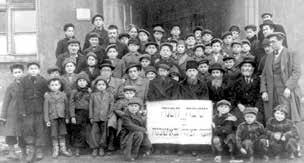
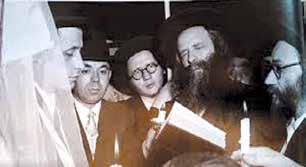
It was so crowded that no one could sit. Once we were in the car, we felt a sense of relief because we were not being beaten and screamed at anymore, and we felt protected. The doors were shut immediately after the car was full. Those near the windows, which were covered with barbed wire, could look out but were warned not to do so. It took about three hours before the train started moving. The atmosphere was tense.
They would say, “We will wipe out the Jews of Europe. The Arabs will destroy the Jews of Palestine. And the Jews of America? Ha! The Jews of America will take care of themselves.”

Ukrainians standing on top of the cars continued to scream and to shoot sporadically but we did not know whom they were aiming at. The main topic of conversation was our destination. People hoped — wanted to believe — that they were being taken to labor camps. This was particularly true of our group because we had worked at the airfield for about two years now, and therefore had diverse experience.
Finally the train began to move, but then it stopped again, at the Gdanski Terminal. Here it stood about an hour and a half. The heat became unbearable because most of us were wearing several layers of clothing, several pairs of underwear, heavy winter coats. We started screaming through the windows, begging for water. The Ukrainians guarding us brought us water only
in return for valuables. After receiving them, many guards simply splashed the water into the faces of the victims, cursing and laughing sadistically. But some Polish railroad workers near the tracks did bring a little water, sometimes for money, sometimes for nothing, always taking a risk, because approaching the train was like approaching a fireball. Often, when a person in the car received some water, those around him tried to grab some from him; it often spilled on the floor.
Finally the train began to move. As people realized that the train was moving east rather than south to Radom, where Brandt had said we were going, panic set in. Some began to plan how to break out of the car with the help of saws and knives that they had managed to sneak aboard. But the majority was against such attempts because they believed that those remaining would be killed. Several people were physically stopped while attempting to escape. This debate raged for a while, and then a deathly silence fell. No one escaped from my car.
People had to perform their bodily functions right in the car, and gradually the stench became unbearable. The fear of the unknown, however, completely eclipsed the stench, and after a while I did not notice it anymore. Those of us who had worked at the airfield were in relatively good physical condition, but those who had come from the ghetto were in very poor shape. Some people fainted, many were near death. For the entire time I was in the car, I received no food or water, nor did I sit down for a moment. I do not remember feeling thirsty or hungry. I did not react to anything around me. I lost all sense of fear. About midnight, Rabbi Mordechai Glatstein called out, “Jews, let us say Vidui.” We all joined him in reciting the prayers. (Rabbi Glatstein and his brother survived the war and settled in the United States.)
With the help of the Al-mighty, the American Army discovered the plan, and under the direction of Brigadier General Henning Linden, the U.S. Air Force bombed the railroad tracks, thwarting the plan of these reshaim
. My grandfather told us that when the SS officers realized that their end was near, they quickly exchanged
“I was in the middle of Masechta Bava Basra, and I will now be reunited with my Gemara. This is my freedom. I leave revenge to the Ribbono Shel Olam.”
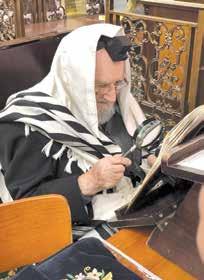
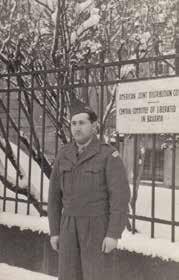

uniforms with the Jewish inmates. However, when the American army landed, they were not duped by this scheme. The Jewish prisoners were skeletons, walking cadavers, and the German officers were fat and robust.
Brigadier General Henning Linden handed my grandfather a pistol. “Rabbi,” he said, “take my gun and take revenge against the enemy.”
My grandfather responded, “Revenge? I leave revenge to the Ribbono Shel Olam. It has been five years since I have been able to look into my Gemara. I was in the middle of Masechta Bava Basra, and I will now be reunited with my Gemara. This is my freedom. I leave revenge to the Ribbono Shel Olam.”
In addition to being a great talmid chacham, a student and ben bayis of Rav Menachem Ziemba, and a musmach of Rav Shlomo Dovid Kahane, the rav of Warsaw, my grandfather had also studied English. It was his command of the English language that prompted his appointment, after liberation, as the head of the religious department of the Joint Distribution Committee for the American Army. He was given a Jeep and an American army uniform, and he functioned as liaison between the army and the she’eiris hapleitah
When General Eisenhower visited Feldafing, my grandfather served as Eisenhower’s translator to the survivors. When Eisenhower consented to ship Arba Minim to the DP camps, those lulavim, esrogim, hadassim, and aravos arrived at my grandfather’s desk. I am proud to say that my zeidy was the shalucha d’Rachmana, the heavenly messenger, who personally distributed hundreds of Daled Minim to the survivors in time for the very first Succos after the war.
What I am conveying here is not only documented in writing, but I am in possession of the original photographs of my grandfather distributing Arba Minim in advance of the survivors’ very first Succos. In addition, he was able to distribute matzos before Pesach.
When Noach exited the Teivah after the Mabul, the whole world had been destroyed. Mankind had perished. The plants, the animals, the birds — all gone. Noach emerged from the Teivah, and the Torah then
reported the first thing he did: “Noach, the man of the earth, debased himself and planted a vineyard” (Bereishis 9:20). Rashi directs us to the words of the Midrash: “He profaned himself, for he should have occupied himself first with planting something different.” The Midrash criticizes Noach because a vineyard should not have been the very first thing he planted. He ought to have engaged in growing another crop first.
This is a curious statement on the part of the Midrash. What was wrong with planting a vineyard? He saw destruction all around him, a decimated and desolate world. He was mourning the entirety of the world’s population. He needed nechama, consolation, and the pasuk tells us, “Give strong drink to the woebegone, and wine to those of embittered soul” (Mishlei 31:6). By producing wine, Noach was merely comforting himself over the depressing world he found after the Mabul
What did Noach do wrong? Rav Simcha Wasserman explains that the Torah is teaching us the identity of our mission in the aftermath of tragedy.
Noach left the Ark, and he saw utter devastation. The world had been completely destroyed. But he should not have afforded himself the luxury of sipping wine, of comforting himself, of feeling sorry for himself. It was not a time to wallow in misery. It was the time to roll up his sleeves, get to work, and build for the future. There was a world to rebuild. Rather than planting a vineyard, plant grain, which can be a source of sustenance for the future.
Noach was criticized for his attitude. The message is: Don’t wallow in tragedy. Instead, build for the future. The framework for how we should react to tragedy, for how to recover after devastating losses, is provided by this rebuke that the Torah directed toward Noach.
We are still reeling from the horrors and devastation that was the Holocaust. Certainly, it is critical for us to remember what happened, and to memorialize the individuals, communities, and kehillos that were destroyed. But we cannot allow ourselves to become completely absorbed in memorialization and commemoration. We cannot wallow in self-pity.
Our focus and energy must be directed toward building the future of the Jewish people.
My grandfather exemplified this idea. He did not feel sorry for himself due to the losses he suffered. He would say that he was infused with a great “ruach miMarom,” tremendous spiritual energy from Hashem, which the Al-mighty was investing in him to help rebuild the Jewish people. My grandfather devoted every fiber of his being to help strengthen, revitalize, energize, and rebuild the she’eiris hapleitah, those who, with Hashem’s kindness, had survived the horrors of the war.
In his capacity as head of the Religious Department of the Joint, and through his connections with General Eisenhower, he had many kinds of tashmishei mitzvah and tashmishei kedushah shipped to the DP camps. He distributed talleisim, tefillin, tzitzis, shofaros, and Daled Minim. There were no sefarim to be found, and my zeidy published the first sefarim in the DP camps. I have original copies of the sefer Lev David and the sefer Even Shlomo that were published with army green covers — in the DP camp.
I have a letter from HaRav Chananya Yom Tov Lipa Goldman, the Av Beis Din of Neupest-Wasserburg, thanking my grandfather for his efforts in restoring all aspects of Jewish life to the survivors.
Rabbi Goldman writes about my grandfather, “And after much effort, sweat, and toil, he successfully constructed mikvaos and established yeshivos.”
This boggles the mind: he built mikvaos in DP camps!
After witnessing the greatest disaster that ever happened to our people, my grandfather could have easily and justifiably folded his arms in despair, planted the proverbial vineyard, and sipped the wine of much-needed consolation. But that is not how a Jew reacts to tragedy! A Jew picks himself up, dusts himself off, rolls up his sleeves, and builds for the future.
What my grandfather considered his most rewarding and sacred task was using his capacity as officer of the Joint to help survivors locate relatives, whether in America, Canada, or Israel. If they were able to locate a relative in Israel or America, my grandfather was able to procure papers and passports for them to move there and rebuild their lives.
Until recently, we were not even aware that my grandfather had been involved in this task. When we learned of it, we asked him how many families he had helped to relocate and rebuild after the war. My grandfather didn’t want to provide the answer, but my grandmother, who was also a survivor with a remarkable story, told us that the people he had helped number in the thousands.
I found an article in an old issue of Dos Yiddishe Vort from which I learned that the Klausenberger Rebbe was one of the great individuals for whom my grandfather was able to find contacts in America. He then helped him relocate to the United States.
Message of the shoah
My grandfather wrote the following2 about the proper way to memorialize the Holocaust, and this is the lesson we are trying to convey:
How can we show respect and honor the memories of those kedoshim?
We follow the path of Rabbi Yochanan ben Zakkai, who, while mourning the imminent destruction of the Beis HaMikdash — which he predicted — clandestinely left Yerushalayim to meet General Vespasian. He attempted to secure the future of the Jewish people by asking him to spare Yavneh and its scholars, Yavneh v’chachameha
This is how we survivors honor the memory of the kedoshim. We, too, dedicate ourselves to build the mikdash me’at, the yeshivos, the batei midrashim, and the Bais Yaakovs.
When describing the years of horror and gloom, the years of suffering and pain, one of the most important messages to give over is that of mesiras nefesh for mitzvos.
I had heard this as a child, but I confirmed it more recently when I read The Iron Furnace: A Holocaust Survivor’s Story, by George Topas.3 Mr. Topas relates how my grandfather secretly made daily minyanim in the forced labor camps, writing, “While most of us were interested mainly in food, we had with us a young rabbi named Mordechai Glatstein, who, every morning, with a friendly manner, looked for the tenth man so that the required minyan, or quorum, could pray together. With his brother present, he always managed.”
I have served as rav in shuls where, at times, it was a struggle to put together a daily minyan. My grandfather’s mesiras nefesh is my inspiration to appreciate the zechus it is to gather Yidden together for minyan
Throughout the war, in each of the camps in which my grandfather was interned, he was with his brother Chanoch Henoch. Together, they were moser nefesh to perform as many mitzvos as possible. In one particular death camp, which was under the direction of the most brutal Lagerführer, a rasha by the name of Feikus, yemach shemo v’zichro, my grandfather and his brother were successful in smuggling in a pair of tefillin. Each
morning, they would awaken at the crack of dawn to put on these tefillin. With the threat of death looming over their heads, first my grandfather would don the tefillin, and then his brother. Had an SS officer spotted them, especially the notorious Feikus, they would have been shot instantly.
One morning, my grandfather put on the tefillin, first the shel yad, and then the shel rosh. He davened, removed the tefillin, and handed them to my great-uncle Henoch. Uncle Henoch put on the tefillin shel yad and then placed the tefillin shel rosh. Just then, Feikus barged in.
Seeing the tefillin, he immediately drew his pistol, ready to shoot. But then he looked at the tefillin shel rosh on the head of this tzaddik. Suddenly, a look of dread and fear overcame Feikus. He lowered his gun and ran out in awe.

Then he looked at the tefillin shel rosh on the head of this tzaddik.
Suddenly, a look of dread and fear overcame Feikus. He lowered his gun and ran out in awe.
I heard this episode not only from my grandfather; as a child, I heard it from Uncle Henoch as well.
My grandfather explained this was a fulfillment of the Gemara in Maseches Brachos. The pasuk states: “Then all the peoples of the earth will see that the Name of Hashem is proclaimed over you, and they will revere you” (Devarim 28:10). The Gemara states, “The nations of the world will see the tefillin worn on the head, and they will fear you.” My grandfather would say that this was an open miracle.
One Pesach, I met a Gerrer chassid who told me an incident he had heard from his father. In one of the labor camps, there was a pair of tefillin hidden in a bunker. There was a rav in the camp, and he was in a bunker on the opposite end of the camp. Whenever possible, this rav would crawl a considerable distance to the location
of the tefillin. He would raise his arm and place it into the bunker through a hole in the wall, and someone inside the bunker would wrap the tefillin around his arm. He would then place the top of his head near the hole, and the shel rosh would be placed on his head.
This Gerrer chassid related how his father described this Rav’s burning desire to put on the tefillin as often as he could. “Like an extremely thirsty man who is chalishing for a drink of water,” he would pursue the tefillin despite the mortal danger he was putting himself in by doing so. He needed it to survive.
Who was this Rav? Rav Gelernter, with whom my grandfather was together after the war. I have a picture of my grandfather and Rav Gelernter from when they founded the Agudas Yisrael in Europe after the War.
In this day and age, we are challenged with children who are “at risk,” with youth who are disenchanted with Yiddishkeit. There is no simple solution to this difficult challenge, but perhaps we can find a way to better convey the message of the mesiras nefesh of Yidden who had to perform mitzvos in the most trying circumstances. How Yidden literally risked their lives to daven with a minyan or to don a pair of tefillin. An opportunity to put on a pair of tefillin was a great treasure; it provided the greatest happiness.
After the war ended and the Holocaust was over, my grandfather was interviewed by the secular media.
My grandfather was asked, “After being an eyewitness to the brutality of the Germans, after seeing with your own eyes the devastation of your people, the mass murder of your brothers and sisters, did you, at any point, lose faith in your G-d or in the promises of the Torah?”
“Did I lose faith?” My grandfather replied, “Yes, I lost faith … I lost faith in mankind. I lost faith in humanity. How could human beings become animals and barbarians? How could a civilized society like Germany shed their conscience? How could the United States of America and other democratic countries look the other way, stick their heads in the sand, and ignore what was happening to the Jewish people in Europe? So yes, I lost faith … in man. But never for a moment did I lose faith in my G-d, or in the Torah. My faith in Hashem only became stronger. A Jew never loses faith!”
Who can fathom the deep-seated, soaring emunah of these giants of spirit? There are no words that can begin to capture the towering faith of these Yidden.
And so, we try our utmost to relay to our children and grandchildren what it means to truly have emunah: that a Jew never loses faith, a Jew never gives up hope. In any situation, a Jew is never meya’esh
1 SUNY Press, August 1, 1999.
2 Dos Yiddishe Vort, Adar 5757, “ She’eiris Hapleitah.”
3The Iron Furnace, p. 99. The University Press of Kentucky, August 28, 2014.
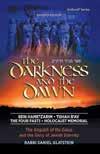

Tisha B’Av is a day when we often find ourselves at a loss for words. Those who struggle to connect with Churban HaBayis find themselves spiritually detached from the pain we are taught to feel, and those who are able to connect with the pain and despair just do not know what to say or how to express it, other than crying out in pain. Our Kinnos, all our feelings, and all our spoken or silent screams seem to ask G-d, “Isn’t it enough already?”
But this year, for many of us, we have for the first time truly felt a Churban. On Shemini Atzeret, we awoke to the news that Eretz Yisroel was under attack, that families were being murdered and taken hostage by terrorists, and before long we all felt the burning pain felt last across the Jewish world during the Holocaust.
The book, “A Bus on Jaffa Road,” describes a horrific suicide bombing on a bus in Yerushalayim in 1996. A young woman from Teaneck who was studying in Eretz Yisroel was among those killed. The book highlights the worst sound after a terrorist attack – the silence. This silence signifies death; those close to the blast cannot even scream in pain or for help. On February 5, 1996, Dovid Sofer, an emergency medic, heard the blast and then the nauseating feeling of silence. Smoke rose, and he ran toward it. He described the scene as eerily silent, like a cemetery.
That silence, the same felt during the Holocaust, during every terror attack and on October 7, is the same silence. It is encapsulated in the first Kinnah we recite on Tisha B’Av, “Shavaas,” which describes how everything came to a standstill. It signifies a profound silence that envelops Klal Yisroel. We struggle to find the words, but the feeling of “Shavaas” persists – there is nothing to say, no words to offer comfort, and no actions to recover what was lost.
By Rabbi Benny Berlin

Chazal offers advice in the Gemara in Berachos on Daf Vav. Rav Papa explains that the main reward one receives for fulfilling the mitzvah of visiting a house of mourning is a reward for the silence one has there. The Maharsha notes that at a
Rav Pam once visited a family that lost a young child. There was nothing to say, so he sat with the family and started crying. He didn’t speak for twenty minutes, only speaking to say, “HaMakom ye’nachem eschem” at the end. The
There is nothing to say, no words to offer comfort, and no actions to recover what was lost.
shiva visit, one should sit quietly. If the mourner speaks, it is their prerogative, but the responsibility of those in attendance is to maintain the silence. On Tisha B’Av, all of Klal Yisroel is in one big beis avel, a house of mourning, which is why It is so apropos that we start the day with Shavaas, marking the silence.
parents later said that Rav Pam’s silent presence was the greatest comfort they received.
Rabbi Blech describes a shiva visit he witnessed, where Rabbi Moshe Feinstein visited a widow who lost her husband. Rabbi Moshe, choked with grief, remained silent for twenty minutes be -
fore saying, “HaMakom ye’nachem.” The widow later expressed how much comfort she gained from his visit. Rav Papa, Rav Pam, and Rav Moshe understood that, sometimes, there are no words.
The Taz was married to the daughter of the Bach. Unfortunately, the daughter of the Bach passed away at a young age. The Taz got up to be maspid for his young wife, and in the hesped, the Taz delivered beautiful words filled with maamarei Chazal , halacha, and drush. Everyone was so taken by the words of the Taz.
The Bach, however, gave his son-inlaw some mussar: “Crying is an integral part of the hesped. If you were really crying the way you were supposed to, you would not have been able to speak so eloquently.”
This Tisha B’Av, may Hashem give us the strength to find the right words and say the words of the Kinnos. But keep in mind the words of the Bach – if we were crying the way we were supposed to, we would not be so eloquent. We also need primal pain to process that horrible sense of Shavaas.
Silence has its deep place on Tisha B’Av as well. There is a halacha in Shulchan Aruch in the Orach Chayim 554:20, and expanded by the commentators that one should try to minimize talking, especially refraining from sha’las shalom (greeting one’s friend), until midday of Tisha B’Av. Many people even take on a Taanis Dibbur (refraining from speaking at all) on Tisha B’Av as well.
This Tisha B’Av, whether it be through silence, tear-filled cries or Kinnos, may we feel the import and weight of Tisha B’Av in a way that brings Moshiach.
Rabbi Benny Berlin is the rabbi of BACH Jewish Center located in Long Baeach, New York. For more information, visit: https://www. bachlongbeach.com/.

by Rabbi Moshe Hauer

300 days.
300 days of innocent people, men and women, babies and the elderly, held hostage by a monstrous enemy. 300 days during which loving mothers and fathers, brothers and sisters, sons and daughters, spouses, close friends, and relatives live every moment with unimaginable questions: is my loved one alive or dead, whole or wounded, healthy or ill? When was the last time they saw sunlight, inhaled fresh air, had a meal? Will they return? Will they ever recover from the trauma of captivity?
300 days of soldiers on the front lines, fighting a monstrous enemy. 300 days during which they have placed their own lives on hold to fight for their nation, for us. 300 days away from home and family, from education and career, from calm and income. 300 days during which loving mothers and fathers, brothers and sisters, sons and daughters, spouses, close friends, and relatives live every moment with unimaginable questions: is my loved one alive or dead, whole or wounded? Will they return? Will they ever recover from the trauma of this horrible war?
300 days of tens of thousands of families forced from their homes, compelled to abandon their communities by the terrorizing attacks and rocket fire from north and south. 300 days of disrupted income and education, of life suspended, removed from the privacy and intimacy of the family home and from the connection and support of neighborhood and community. 300 days during which parents and children constantly ask themselves if they will ever be able to return to those homes and communities, if they will ever feel safe there again.
This Shabbos, we will read the words Moshe leveled accusatorily at the tribes of Reuven and Gad: “Are your brothers to go to war while you stay here?” Moshe could not accept that part of the Jewish people would watch passively from the sidelines as their brothers fought and struggled. “V’heyitem n’kiyim mei’Hashem umi’Yisrael! It is insufficient to discharge your personal religious duties; you must be there for your fellow Jews, for your nation.” That expectation must haunt each of us and demands both practical and emotional responses. No Jew anywhere can live life normally, “par -
ticipating” by checking the news and saying a quick Psalm. In what way are we joining this fight? In what way are we deeply and constantly mindful that life is nowhere near normal for so many of our beloved brothers and sisters? In what way are we making our lives different?
This has been an astounding week, as with G-d’s help and with the dedicated efforts of great people, vicious and murderous enemies of the Jewish people were eliminated and Evan Gershkovich is on his way home. Yet, even as we celebrate these small victories and revel in their intriguing details, the displaced remain displaced, additional soldiers are called to the front lines, the “deal” remains elusive, and the State of Israel is in danger of facing an all-out war on multiple fronts. May G-d help us. 300 days. We must not just take note and move on.
I had the privilege to spend a recent Shabbat in a Sefardic community and noticed a striking insertion in their version of the Shabbat Birkat Hamazon, where they apologize to G-d for having a Shabbat meal. “Even though we ate and drank, the destruction of the of
your great and holy house – we did not forget.” Indeed, how can our lives go on as usual while G-d’s home lies in ruins? While those who say this line each week may not recognize the power of that statement, to the visitor it was deeply impactful.
Perhaps during this time we ought to insert a line like that into various junctures in our day. Even though we slept, the sleepless mothers and children of the hostages we did not forget. Even though we ate, the lost appetite of the soldiers’ families we did not forget. Even though we came back to home and community, the displaced we did not forget. Even though we are sitting here, our brothers who are fighting for their nation, for us, we did not forget.
Are our brothers to go to war while we stay here?
300 days. We must not forget – because our dearest brothers and sisters certainly haven’t.
By Larry Domnitch

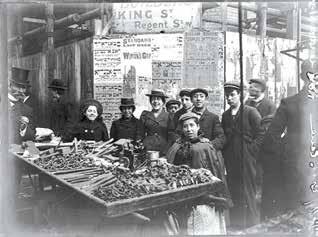
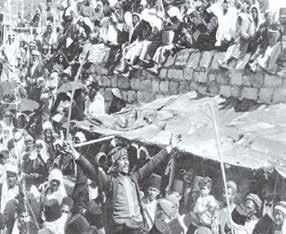
The fires that consumed the first Beis Hamikdash on Tisha B’Av, 3338, in 586 BCE, continued to burn until the middle of the following day. The Talmudic sage Rabbi Yochanan stated, “Had I been alive in that generation, I would have fixed [the day of mourning] for the tenth (of Av), because the greater part of the Temple was burnt on that day.”
As Tisha B’Av has been a day of Jewish misfortune throughout Jewish history, so, too, has been the tenth of Av.
On July 22, 1306, the tenth of Av, the Jews of France were arrested and ordered to leave the country. Approximately one hundred thousand Jews were forced to wander in search of new homes; many perished along the way.
The Jewish community was not aware of the planned expulsion. France’s king, Phillip the Fair, did not want them to flee in advance with their assets. One of the monarch’s motives was to plunder the wealth of the exiles as a way to shore up France’s economic woes. No
doubt, frustration at centuries of failed attempts to force the Jews into apostasy was also a contributing factor.
Jewish communities faced expulsion in some local European provinces in prior years, but until that time, there was no expulsion of Jews in medieval Europe on such a wide scale.
The expulsion had significant consequences beyond the immense human suffering it had caused. It ended the great era of Jewish scholarship of the Tosfos of France, whose commentaries illuminated Talmudic texts. The expulsion also set a precedent for other mass expulsions, which plagued the Jews of Europe for hundreds of years. The existence of Jewish communities within a European country had become precarious. Jews never knew for sure if they might be compelled by law to pack their bags.
Ten years later, Louis the X invited the Jews back to France, and some did return. However, they would eventually be expelled again in 1396 by Charles VI.
Barred from England While
decrees were enact-
ed, others nations had denied Jews entry, especially in the late 19th and early 20th centuries.
England was a haven for tens of thousands of Jews fleeing oppression in Russia. Many of the immigrants made their way to the East End of London. Their continuous flow had slowly aroused the opposition of some British lawmakers, who, by the 1880s, had dubbed the immigration wave “the alien invasion.” They viewed the Eastern European Jewish immigrants as a pariah, or a “state within a state.” With the increase of xenophobia, laws were proposed to limit the flow of “aliens” into Great Britain.
On August 11, 1905, the tenth of Av, the Aliens Act was passed which entitled an immigration officer to deny entry to an “undesirable immigrant.” Such an individual was defined by the bill as one who had no means of earning a living, or one who was judged to be a lunatic, or one who was convicted of a nonpolitical crime. The bill also allowed for the expulsion of those who had already immigrated and were deemed undesirable.
With the passage of the Aliens Act,
immigration restriction had become law, and stricter anti-immigration measures would follow over time. The Aliens Act also impacted American policy. Americans who opposed the levels of Eastern European immigration looked towards the bill as an example of immigration limitation. The Immigration Restriction Acts of 1921 and 1924, which were passed by the U.S. Congress, severely restricted the flow of immigrants from Eastern and Southern Europe. These restrictions remained in force throughout the era of Nazism and the Holocaust, denying European Jewry desperately needed sanctuary.
The Arabs Riot
On the tenth of Av in the year 1929, Arab hatred of Zionism once again boiled over into full-scale riots. The Arabs of Jerusalem were well aware of the significance of the Western Wall to the Jews and used this holy site to incite against Zionism. On Yom Kippur 1928, the British conceded to Arab demands to remove the mechitzah, the divider separating men from women when in prayer, at the
Western Wall. In the middle of Yom Kippur services, British soldiers entered the premises and removed the mechitzah.
As the debate over Jewish rights to pray at the Western wall continued, the Mufti of Jerusalem, Haj Amin Al-Husseini, whipped Arab masses into a rage by leveling the absurd charge that is still frequently heard that the Jews were attacking the Muslim holy places.1 A few days later, on August 16, 1929, as a newly constructed door near the Wall was opened, Jewish worshippers were attacked despite British assurances that the door would never be permitted to be used for such purposes. 2 Two Jews were injured, and many religious articles were destroyed.
On the following day, August 17, thousands of Arabs armed with clubs, swords and daggers converged upon the Mosque of Omar to hear impassioned speeches by their leaders calling for violence. 3 Soon the cry “slaughter the Jews” was echoed by masses of Arabs in the streets of Jerusalem. Over the next few days, there were attacks throughout Jerusalem.
Over the next ten days, rioting would take the lives of 133 Jews and leave 339 others wounded. Among the victims were those massacred in Hebron, whose Jewish community was ravaged by Arab mobs. When the British police, who were slow to act, finally restored order, it once again became clear that solutions to the conflict between Arab and Jew were not forthcoming.
sion,” referring to the Arab rioters, who were killed by British troops during their efforts to finally restore order. Such displays further pressured the British to yield to Arab terms, which demanded severe restrictions on Jewish immigration into the Land of Israel and denial
On the following day, August 17, thousands of Arabs armed with clubs, swords and daggers converged upon the Mosque of Omar to hear impassioned speeches by their leaders calling for violence
Throughout the Arab world, the conflict and the issue of Jewish settlement was highlighted as a result of the riots. Massive demonstrations were held throughout Arab countries in sympathy with the Arabs in “Palestine.” In Iraq, ten thousand assembled in memory of the victims of “British Zionist aggres -
of the Jews right to any statehood. The British did respond with the Passfield White Paper of 1929 and the eventual catastrophic MacDonald White Paper of 1939 which called for only seventy-five thousand Jewish immigrants over the next five years, while negating the very idea of Jewish statehood.
The 1929 riots began on August 16, 1929 – the tenth of Av. The events of the day also contributed to the closure of the West and the Land of Israel to Jewish immigrants.
On the tenth of Av in 2005, the Israeli government began the Gaza disengagement. Nine thousand Jews from twenty-one communities in Gaza were forced from their homes. Despite massive protests and opposition, the plan was implemented. Soon after, the synagogues and green houses that were left were destroyed by Arab mobs. Assurances by world leaders and some Israeli leaders that the evictions were in Israel’s security interest were to no avail, as the evictions from Gaza resulted in more war, destruction, and terrorism, including the horrors of October 7.
1 Jewish Daily Bulletin 8/19/29 No. 1444, pg.1
2 JDB 8/20/29 Vol. 1445 pg.
3 Jewish Tribune 8/30/29, Volume 95 no. 9, Pg.1
Larry Domnitch is the author of The Impact of World War One on the Jewish People , by Urim Publications. He lives in Efrat.



By Gedaliah Borvick
On July 29, 2024, the Knesset Finance Committee approved an amendment to the real estate regulations which changed the real estate benefits for new immigrants (Olim). We will first explain the new amendment and then analyze whether it is beneficial or detrimental for Olim. (All numbers discussed below are approximate.)
The Finance Committee approved the following amendment: Olim will be exempt from paying a purchase tax on the first 2 million NIS. On the next 4 million NIS, they will pay a purchase tax of 0.5%. Above 6 million NIS, they will pay a rate of 8%, and above 20 million NIS, they will pay 10%. When buying on paper, an overseas buyer can take advantage of this discounted rate by making Aliyah within three years of signing a contract of sale. If an Oleh wants to buy a second property, they will have to pay an 8% purchase tax up to 6 million NIS and then 10% above (the same rate that foreign buyers pay).
In comparison, Israeli residents buying a primary residence are also exempt from purchase tax on the first 2 million NIS. They then pay 3.5% for the next 370,000 NIS, 5% for the next portion up to 6 million NIS, 8% above 6 million until 20m NIS, and then 10% above. If an Israeli wants to buy a second property, they have to pay an 8% purchase tax up to 6 million NIS and then 10% above.
At first glance, the new immigrant tax rate looks like a benefit for Olim, compared to the rate paid by Israelis. In fact, numerous government ministers lauded the new law as a means of embracing new immigrants and encouraging Aliyah, and – also as expected – some members of the media have protested that this benefit will result in the loss to the government of millions of shekels.
Are the government ministers and media correct? The reality is that this

new amendment is a compromise that was created to close tax loopholes, which will hurt some new immigrants and benefit many others.
Upon scrutiny, one notices that there are situations where the new law obligates Olim to pay more taxes than under the
have paid .5% on the first 2 million NIS and 5% on the next 28 million NIS, or a total of 1,410,000 NIS in purchase taxes.
In contrast, the new amendment is 0% on the first 2 million NIS, 0.5% on the next 4 million NIS, 8% on the next 14 million NIS and 10% on the final 10 million NIS,
The reality is that this new amendment is a compromise that was created to close tax loopholes, which will hurt some new immigrants and benefit many others.
previous law – and, perhaps unsurprisingly, those are the situations where the tax office stands to gain the most money. To explain this phenomenon in real numbers, if one made Aliyah and bought an extremely expensive property of 30 million NIS, based on the old law they would
or a total of 2,140,000 NIS. Thus, the new immigrants rate will hurt Olim buying very expensive homes.
Parenthetically, under the old law, if an Oleh bought only one residence, they were able to choose either the Oleh tax rate (more favorable rate when buying
expensive homes) or the Israeli primary residence rate (more favorable when buying moderately priced homes).
In addition, the new amendment limits new immigrants’ tax breaks to only one property, which is the same number permitted for Israelis who are not Olim. Previously, Olim were able to receive tax breaks on two properties: the first property was calculated at the Israeli primary home buyers’ tax rate (detailed above) and the second property was calculated at the former Oleh tax rate (provided that the immigrants would live in the home bought with the Oleh tax benefit).
In summation, the new amendment has the following effect: For the majority of deals, which range from 2 million to 6 million NIS, the new Olim rates are beneficial to new immigrants. For very expensive properties, the new rate is detrimental to Olim. Finally, for Olim buying two properties, the new law – which limits tax breaks to one property – is disadvantageous.
The effective date of this new amendment is August 15, 2024. People who immigrated prior to that date but did not yet buy homes will have the option to apply either the new tax rates or the previous rates, provided they buy a home within 7 years of making Aliyah.
I am grateful to attorney Gad Dishi for his astute initial analysis of this new amendment. To discuss details and tax implications, one can reach Gad at dishi@netvision.net.il or via WhatsApp at +972-52-393-9389.
Gedaliah Borvick is the founder of My Israel Home (www.myisraelhome.com), a real estate agency focused on helping people from abroad buy and sell homes in Israel. To sign up for his monthly market updates, contact him at gborvick@gmail.com.

By Barbara Deutsch
We started our day with a walk to the money changer we trust in Rechavia; it’s a grocery store with a bank (kind of) in the back. We have been going to this lovely store/bank, which offers a large variety of American products, for the many years that we have vacationed or visited Israel.
We pulled out our “Rolls Royce,” a veygala (granny wagon), and we were off. We live about a 10 minute walk from anywhere we want to go in Jerusalem, and as we are carless and plan to remain so, it works for us.
Just outside the money exchange place, located right next door to about fivfe different shuls, lined up to be allowed entry were about 10 tzedakah collectors waiting at the various minyanim doors As we approached, my husband and partner in adventure, Bob, spied a favorite of his: a portly gentleman in a frock coat and hat.
“It’s the Chicken Man,” exclaimed Bob. “Hello, how are you? I have not seen you in a while!”
The man is identified by his bestowal of brachot and for collecting money to buy chickens for Shabbat. We assume he has a proper name but don’t know it.
The Chicken Man reached out his hand for a handshake into which Bob placed 20 shekel. With a huge grin the man shared that his daughter who had a child and an ex-husband who did not want children was getting remarried. Did Bob want to pay for the wedding? This father of the bride was willing to give him any kibbud he desired including reading of the ketubah in exchange for the money. Bob was tempted and tickled by the offer – he is an American Tzioni in a kippah serugah, albeit a black one and not blue and white, for which he was told is the thing to do on Shabbat in Israel (not so much in Rechavia) and reading a ketuba at a chassidusha wedding would be a
first and quite an honor.
Still, he figured he would stick with the 20 and said, “Thank you, no!”
Every early morning when Bob goes to minyan, he gives a small guy with hygiene that could use an upgrade an American dollar. Last week, this particular tzedakah friend asked if he would exchange some money for him. “Sure,” Bob said. Out of the man’s grungy pocket came a neat stack of singles wrapped neatly in a rubber band.
The exchange was made.
I asked Bob what he was planning to do with his new although less crisp pack of dollar bills.
“I will give it back to him every day we meet before minyan,” he told me.
We do not know this man’s name either.
It has not been easy to wrap my head

portunities: Torah study groups, chessed in support of the needy, leisure – we went to the new National Library (a must see) and I have joined a paper cut art circle. It consists of an amazing group of women who create masterpieces and bond over projects.
I have no expectation to be able to create that special three-dimensional and filled with color piece of art, but I en-
Being in Israel allows you to expand your mindset to include people from around the world who are different from and the same as you.
around the idea that I no longer have to be anywhere I don’t have or want to be. There is no clock that is ticking and counting down the minutes, hours and days till September. When I wake up in the morning – no more 5:00 a.m. for me – the day stretches out as a blank slate waiting for me to fill the time with anything that meets my fancy.
That is, if I don’t have a municipal appointment.
Friends and family remind me how lucky I am to be in this magical country with the ability to pick from so many op -
joyed my time there with the wonderful, welcoming women. I especially liked the leader, Grace. She is the heart and soul of the group, a skilled teacher and an encouraging mentor.
Being in Israel allows you to expand your mindset to include people from around the world who are different from and the same as you. Our new dentist is from Los Angeles, and his assistant/receptionist is from Holland.
We are all proud-to-the-core Yehudim and strongly believe that Israel is our special home.
The threat of war looms large. This summer, two of our mostly grown (a sports counselor in Camp Sternberg) and a sort of grown up one living the life before responsibilities become real granddaughters are in America. Their gracious aunt and uncle have hosted them as needed. Even some Israeli friends passing through have found a place at their table. When news of Delta and United flight cancellations changed everyone’s ability to get home to Israel, loved ones went into action to find new flights on El Al. The intensity of the planning to ensure that the girls get “home” impressed both of us. Aren’t they safe and comfortable in their aunt and uncle’s big, roomy house in America? Does coming back to Israel to more sirens and escalating conflict make sense?
Yet, it does! Home is Israel. It is the one place where our people are unconditionally accepted; it is where we all belong. In good and hard times, this land of Jews from all over the world, no matter the hashkafa, life’s status, the rich, poor, old or young – we belong.
Barbara Deutsch is the former associate principal at HANC, middle school principal at Kushner, and Dean of Students at Yeshiva of Flatbush. A not-retired educator, she is trying to figure out life in Israel through reflections on navigating the dream of aliyah as a wife, mother, grandmother, great-grandmother and friend.
By MAlkie ScHulMAn
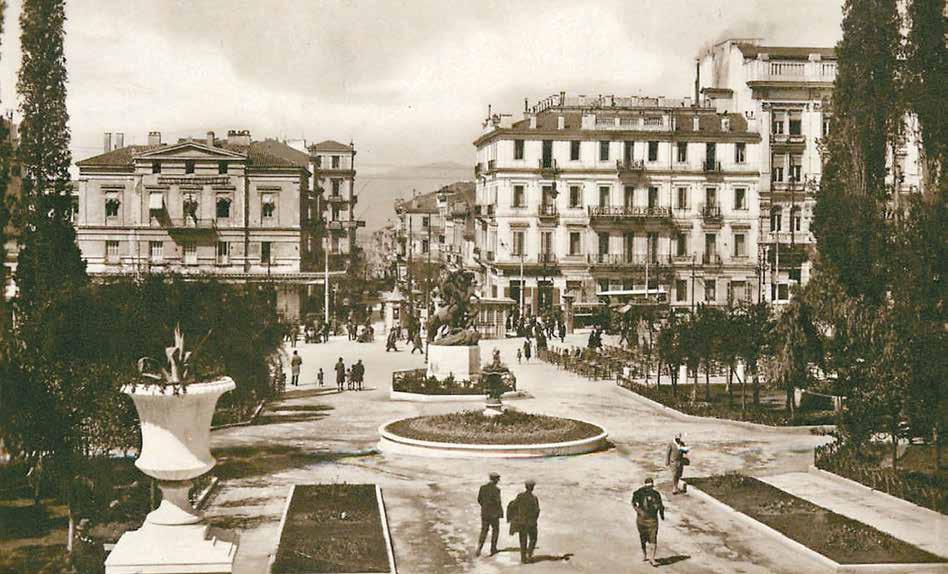
not by accident that I am called by the sobriquet ‘the singing professor.’ My name, Asher, literally meaning ‘happy’ and ‘blessed with fortune,’” states Prof. Asher J. Matathias, Professor Emeritus of American government studies at St. John’s University in New York. For despite the hardships he has endured, from his family’s harrowing beginnings during the Holocaust through his early youth growing up in the virulently antisemitic country of Greece, Prof. Matathias remains, now in his 80th year, as upbeat and optimistic as ever.
Prof. Matathias’s resilience and optimism stand in stark contrast to the backdrop of Greece’s tumultuous history, particularly regarding its record of discrimination towards the Jewish population.
Greece’s modern history, Prof. Matathias explains, dating from its 1821 revolution against the Ottoman Turks, is replete with civil strife, dictatorships, assassinations, and foreign power interventions. The longest period of peace and democracy Greeks have enjoyed is the past 50 years, beginning in 1974 with the overthrow of a military junta. Among the victims in the upheavals of the last 203
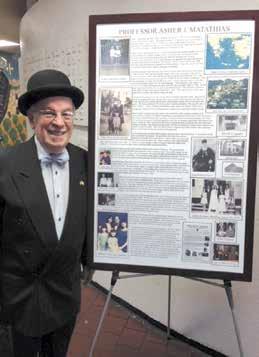
years were Greek Jews. Though their presence in the country precedes the arrival of Christianity, Jews were always considered “the other” and were never truly trusted. In the 1821 Greek uprising, the Jews were seen as not sufficiently enthusiastic and were subjected to violent attacks.
This perception likely stemmed from the fact that Turkey was one of the few countries that welcomed Jews after the expulsion from Spain in 1492. Many Sephardic, Ladino-speaking Jews were invited to settle in Salonica (belonging at that time to Turkey), which eventually became a major Jewish city. As the native Greeks never shared Turkey’s positive sentiments towards the Jewish people, when Salonica reverted to Greek control in 1912, the government passed Hellenization laws forcing Jews to become fluent in Greek and to keep their businesses open on Shabbat – a law that’s still upheld today!
Another group, Romaniote Jews, trace their origins farther back to the Hellenistic period, around the 4th century BCE, following Alexander the Great’s conquests. From 146 BCE under Roman rule (from which they derive their name) and later during the Byzantine period starting around 330 CE, the Romaniote community flourished. Distinct from Sephardic Jews, who arrived much later, Romaniote Jews have a unique, longstanding history in Greece. Nevertheless, despite their established history, they
are still viewed as outsiders to Greek gentiles. Prof. Matatshias, a proud Jewish Greek American citizen, is determined to change that perception. How successful he will ultimately be is anyone’s guess, as, in his own words, “Greek antisemitism, the world’s oldest disease, is deeply embedded.”
According to Professor Matathias, the relationship between Greek Christians and Greek Jews has always been fraught with tension. This is due to both religious and commercial reasons. Jews of Greece have generally been more financially successful, which historically has led to jealousy among their Christian counterparts.
“Believe it or not,” Prof. Matathias says, “‘The Protocols of the Elders of Zion,’ a notorious and fraudulent document first published in Russia in 1903 that purports to record a secret Jewish conspiracy to achieve world domination, is still a bestseller in Greece today.”
Additionally, the Greek Orthodox Church is one of the few branches of Christianity that has never formally retracted the belief that Jews were responsible for the death of their god.
With all the above information, it will not come as a surprise that most of the Greek Christians were
more than happy to hand over Jews to the Nazis when they invaded in 1940. In Prof. Matathias’s words, “In no time, and with the cooperation and collaboration of Greek Christians, Jewish properties were confiscated and huge ransoms collected. But nothing could forever forestall the inevitable roundup and transport to the Jews’ doomed final destination, Auschwitz.”
According to Prof. Matathias, Greece had the highest deportation rate of any country – 87%, though, of course, number-wise, countries like Poland lost more. The biggest deportation in Greece took place in Salonica since that was the main hub of the Jewish population. In total, almost 70,000 Greek Jews – out of 80,000 – were murdered in the Holocaust.
According to family lore, Prof. Matathias’s father saved his mother (and her sister), and little Asher (Prof. Matathias) saved them all. Prof. Matathias explains that his father was born in the city of Trikala to Romaniote parents. Although the Romaniote Jews adopted many customs of the Sephardic Jews, they weren’t considered scholars or cultured like the Sephardim. Consequently, the Romaniotes were often looked down upon by the Sephardic community. His mother, who spoke French, Greek, and Ladino and was a graduate of the French-inspired Alliance Israelite Universelle, was born in Salonica. Nevertheless, despite his less exotic background, at the age of 21, his father managed to woo his mother. They were married in 1942 and together with her younger sister, Mendi, they moved to the city of Volos. Their relocation from Salonica saved their lives since the first Jews to be deported were the Jews of Salonica, among them Professor Matathias’s maternal grandparents and their two young sons who were ultimately murdered in Auschwitz.
In Volos, they heard what was happening in Salonica. Business associates of Asher’s father, Phroso and Yiorgos Stamos, approached the newlyweds to warn of the impending disaster that would also befall Volos Jews. They urged them to follow them to a cave outside a nearby village where they would be hidden.
“This was in 1943, and by then, my mother was pregnant. Six months later, on December 3, 1943, in the primitive cave, I came into the world. Because it was dangerous to circumcise a baby while living in a cave under those conditions, I did not have a brit until I was eight months old after we were liberated. Being born during this time makes me among the youngest of the still 245,000 worldwide survivors.”
A little bit of background about Phroso and Yiorgos Stamos. They were a childless couple who were eager to have a child, and they came up with a novel idea. During the roundup of Jews by the Germans, the gentile couple approached Prof Matathias’s parents with an astounding proposition: “If you don’t survive the Shoah, but your baby does, we’d like to raise him as our own. We’ll baptize him and give him a new name, Apostolos (Apostle, for they believed they would be offering a soul to their ‘savior’).”
To sweeten the offer, they said little Asher would eventually become the heir to their fabulous fortune as well.
“My parents agreed,” shares Prof. Matathias, “for saving me was paramount to their calculation. But, alas for them and happily for us, our family was intact at war’s end.”
Still, the Stamos couple were not ready to give up. They came back with another proposition: believing that ,as a young couple, Prof. Matathias’s parents would have other children, would they, nevertheless, give their first-born over to them?
Of course, little Asher’s parents had no desire to hand their beloved child over but the couples’ relations remained strained until they agreed to have the matter resolved by the head bishop in Volos, Metropolitan Ioakim, who thankfully “ruled” that the Jewish parents keep their baby.
The Stamos couple eventually bought a teenager from an impoverished family, Thanasis, who in time became their heir.
“They were present at our wedding, on August 29, 1970, to my wife, Anna,” shares Prof Matathias. It was the last time I saw this amazing couple who saved our family. I am still trying to get them recognized by Jerusalem’s Yad Vashem.”
In Asher’s mother’s latter years, she’d say to him, “Asher, you are my hero. You saved our family. I’d say, ‘Mom, how can that be? I was just a baby.’ She’d answer, ‘You saved us by being quiet!’”
This silence proved crucial when, upon learning of Germany’s plan for Greek Jews, righteous gentile Consul Helmut Scheffel, the Reich’s representative in Volos, urged Metropolitan Ioakim to encourage his parishioners to help Jews. Thus, when the Germans arrived, only the elderly and infirm were at the town square. Everybody had been forewarned and all those who were able had run away. The Nazis, together with Greek collaborators, combed the countryside. Many Jews were found, betrayed by the cries of their children. Baby Asher was quiet, so his family remained safe.
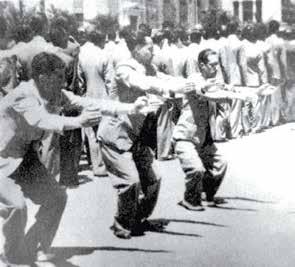
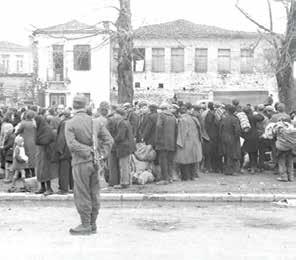
March 1944
“Because it was dangerous to circumcise a baby while living in a cave under those conditions, I did not have a bris until I was eight months old after we were liberated.”
There was a time, however, when a German patrol passed and discovered them.
“My father was away helping the resistance when a German officer entered our cave,” says Prof. Matathias. “He saw my makeshift crib and said, ‘I left a baby like this in Hamburg, and then, turning to his men, he said ‘Raus!’ and they all left. Because of that action of one German, I cannot hate all Germans and I cannot boycott German products.”
Nevertheless, that doesn’t stop Prof. Matathias
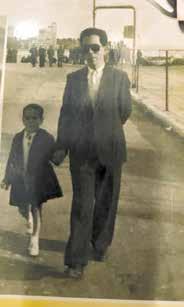
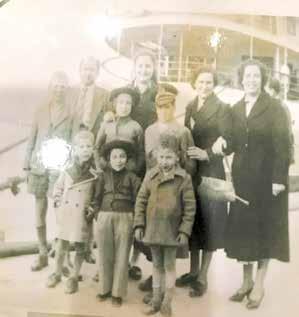
from asking Germans of a certain age that he meets, “Where were you and what were you doing during World War II?”
There were other cases of non-Jews helping Greek Jews, although not enough, he laments. For example, Police Chief Evangelos Averoff issued false identity and baptismal certificates in Athens. On the island of Zakinthos, Mayo Karer and Metropolitan Chrysostomos presented only their names upon given the command to provide a list of the island’s Jews. The resistance movements were also instrumental in saving lives of Jews.
As for the rest of the Greek population, the following story sums it up. After the war, about 1,200 Auschwitz inmates returned to Greece to attempt to pick up their shattered lives. Upon their return, they were told, “Why are you back? Why didn’t Hitler finish the job?”
After the war, Prof. Matathias’s family, consisting of Asher followed by sister Mary (1945), and sister Rachelle (1952), were eager to leave Greece. Assimilation and intermarriage were rampant, and it had been clearly demonstrated over and over that the Greek gentile population was no friend to the Jews. In fact, in the 1947 United Nations General Assembly vote on Resolution 181, which proposed the partition of Palestine to establish a Jewish state and an Arab state, Greece voted against the Jewish state.
“I took that as a personal affront,” shares Prof. Matathias. “To me, it was another slap in the face from the Greek government. To vote no, only two years after the Holocaust!”
Today, Prof. Matathias has put together what he calls “A Petition of Conscience: An Appeal to Correct History and Heal Hearts” that he has circulated in 10 countries, so far, demanding a repudiation of this vote on Resolution 181 and issuing an overdue apology to Israel and the entire Jewish People.
Meanwhile, shortly after the war, says Prof. Matathias, “Pop’s younger brother Moshe had braved the British embargo on Jewish immigration to Mandate Palestine and settled in Holon. His intention was to give us the signal to join the new nation when things
“If you don’t survive the Shoah, but your baby does, we’d like to raise him as our own. We’ll baptize him and give him a new name, Apostolos.”
Immediately after World War II, from 1945-1949, Greece, who it seems was never very good at getting its act together, was plunged into a civil war.
“Pop was called to serve.” Prof. Matathias recalls. “However, he insisted upon the condition that his young family live with him on the base, to better assure a modicum of food during a time of famine, where people daily were picked up dead on the street. Because of his literacy, Pop became a major’s aide. One day, the major called my father barking, ‘Jew, come into my office!’ Pretending not to hear, my father heard the same order given more emphatically. Walking into the major’s office, my father declared, ‘If I hear you call me again in this manner, I will report you!’”
The major apologetically explained that “there was no disrespect intended, it’s just the expression of a social construct commonly in use.”
Unfortunately for the Matathiases, after the war, most of the surviving Jews, especially the Judaically learned ones, left Greece for Israel, the United States, Canada and friendlier European countries. Consequently, Prof. Matathias grew up with very little Jewish knowledge. He knew he was a Jew, though, because his non-Jewish counterparts never let him forget it.
“My memories,” he shares, “include being called Jew boy and other unprintable epithets.”
Asher was the only Jewish child in his class.
“I would walk to synagogue and sit next to my father in synagogue every Saturday, but then after services at 8:00 am, we’d go to his place of business to open it up.”
This was the law, Prof. Matathias notes.
“If my father was one minute late, he’d receive a citation from the policeman who was standing outside his store waiting for him.”
Nevertheless, Mr. Matathias had a non-Jew do all the necessary writing for his business on Shabbat.
“I would say, in Greece, we practiced Orthodox style Judaism, not American style Judaism. It wasn’t until moving to America that we learned about the different strands of Judaism, Reform, Conservative and Orthodox. Our synagogue in Volos was Orthodox; the men were on the main floor and the women sat separately up in the balcony, and there was no microphone.”
A particularly trying period of the year for young Asher was Greek Orthodox Holy Week. “Children who passed as my friends would distance themselves upon the indoctrination of parents who taught that we Jews looked for gentile children from whom to extract blood for the baking of our seder matzahs. On the day of what they say is the crucifixion of their deity, they’d stand in front of our home and chant in unison: ‘Simera mavros ouranos, simera mavri mera, t oday is a dark sky, it’s a dark day.’ My Mom would open the shutters and shoo them away saying, ‘There’s nothing wrong with the perfectly blue, sunny sky, go away!’”
calmed down a bit. Unfortunately, that was never to be; the conditions then were as dangerous as they are today.” So, the Matathias family remained for the time being in Volos.
Although all the other rabbis in the country had been exterminated in World War II, Chochom Moshe Pesach, the chief rabbi of their city, had been spared. He was a learned scholar and a significant figure in young Asher’s life. Intimidating yet welcoming, Rabbi Pesach wore a tunic that combined Greek Orthodox
and Magen David symbols, signifying his official recognition by the Greek state as the religious leader of their city.
“Chochom Pesach gave me lessons in aleph-bet and early on indoctrinated us with Zionism. I recall part of my daily routine was putting drachmas (Greek currency) into the Jewish National Fund tzedakah box.”
Greece being a patriarchal society, Prof. Matathias as a first-born male was treated royally.
“In my formative years, I was treated like a pasha, which means prince in Turkish. I would attend all my father’s business meetings, and he’d say to his associates, ‘In London, the prince is Prince Philip. I have a prince named Asher.’ My head expanded at that. However,” he laughs ruefully, “I lost my edge once I moved to America, got married and had three daughters!”
In the mid-1950s, Thessaly, Greece experienced catastrophic earthquakes. The United States felt guilty for not doing enough for Greek Jews during the Holocaust and offered to help ravaged Jews either to rebuild in place or by waiving the still in-place immigration quotas and allow them to emigrate to America.
“I was 12½ years old at the time,” says Prof. Matathias, “and I remember my parents discussing whether we should travel by plane or ship. My father said, ‘We’ll be in America for the rest of our lives. Let’s go slowly by boat so we can see the different countries.”
Because the Greek port was not deep enough to accommodate the monster of an oceanliner (a 35,000ton ship) they were to sail on, they first traveled via train, crossing mountains until they reached Naples, Italy, where they were to pick up the USS Constitution.
“Europe was one side and Africa was on another,” recalls Prof. Matathias, “We sailed to Genoa, a port city in Northern Italy; we picked up immigrants in Algiers, the capital city of Algeria in North Africa. Then we sailed around the Strait of Gibraltar which separates Europe from Africa.”
The Matathias family arrived in America in 1956. Their arrival was noted by the congregants of the Sephardic Temple of New Lots, Brooklyn, a Sephardic shul made up of Balkan, Greek and Turkish Jews. Consequently, they were invited to settle in New Lots. The spiritual leader and founding rabbi was Rabbi Arnold B. Marans who worked hard to maintain the cultural heritage of his constituents. In 1962, the shul relocated to Cedarhurst, NY, and the Matathias family eventually moved there as well. Later, when Prof. Matathias married, he and his wife settled in Astoria. In 1976, they bought a house in Woodmere, where they have resided ever since.
“As soon as we moved to the U.S., I became a fiend for Jewish knowledge ,” shares Prof. Matathias. “I went to Talmud Torah, soaking up everything I learned.”
Asher had a beautiful voice, and when he turned bar mitzvah, he became assistant cantor. Unfortunately, his bar mitzvah celebration was marred by the
tragic death of his sister from childhood leukemia.
“I put on my tefillin that morning, had pound cake to celebrate and that night my father returned from the hospital with the news that my younger sister, Mary, had died.”
There was no Shabbat bar mitzvah kiddush for Asher that year. Fifty years later, however, Prof. Matathias relates, “My mother called me and said, ‘This year we’re going to celebrate the bar mitzvah you never had.’ So, at 63 years old, I leined the haftarah in the Sons of Israel in Woodmere followed by a catered kiddush. It was a very emotional day for all of us.”
“When I began to study further, I became an intense reader and opinion presenter on the Holocaust. In fact, I learned the awful truths of Greek antisemitism even in America, for nothing was ever written or said in public and parochial schools then, or now!”
Today, there are fewer than 5,000 Jews left in Greece. This number, according to Prof. Matathias, will be reduced even further through intermarriage and assimilation.
“In our extended family in Greece,” he shares, “there is not one family that doesn’t have a Christian member. Anybody who wants to have a religious wedding ceremony must be baptized, otherwise they can only have a civil marriage.
“I call Greece a 4th world country. My students argue with me and tell me, there’s no such thing. But in my opinion,” says Prof. Matathias, “Greece occupies a perch all by itself. It’s a backward, patriarchal and intolerant country.”
Of course, it’s no surprise that Chabad has a presence in Athens today. But there is only one kosher restaurant under its auspices. Shechita is not allowed. All kosher meat is imported. Performing circumcision is not permitted either.
Prof. Matathias leaves us with timeless yet powerful truths: be empathetic, compassionate, and ever so humble. Never scapegoat immigrants or refugees – remember, the Jewish people were once strangers in a strange land. Give generously; nobody has ever become poor from giving. If you can’t give materially, give kindness!
Get involved in service; Prof. Matathias continues to lead the Five Towns B’nai B’rith Lodge. Stand up to bullies. Remember, there is nothing new under the sun, and while progress is often slow, the Pirkei Avot instructs us that although the task is enormous, we cannot escape the responsibility of undertaking it.
“Vamos a empezar, let’s begin!”

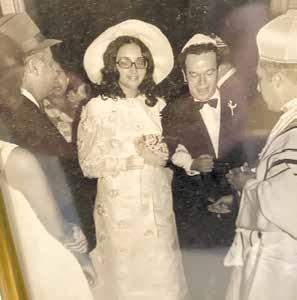
Professor Emeritus Asher J. Matathias has instructed children and adults for over 55 years, with over 20 years as a popular American Government instructor at St. John’s University’s Queens Campus. He remains active on the lecture circuit, participates in Zoom sessions and contributes to the Names Not Numbers project, where middle school students interview and film Holocaust survivors for posterity.


By Hershel Lieber

New York, where we lived for about seventy years, and neighboring New Jersey, where we live for the past seven years, represent “home” to us. Traveling usually conjures up an image of distant places or exotic destinations far away from home. Nevertheless, I will focus my attention on two states that are closer to home: Delaware and Maryland.
The second smallest of the fifty states has been part of many journeys that we

took by car over the past sixty years. Wilmington, Newark and New Castle, which we pass by during our usual travel route on I-95, are cities we never took time to explore. We did make a day’s stopover in Dover, the state’s capital, and took in the historical sights of the first of the original Thirteen Colonies that ratified the U.S. Constitution.
On another occasion, Chol Hamoed Sukkos of 1987, we joined our friends and their families for an outing to Nemours Estate, the Dupont mansion in Wilmington. The Estate has seventy-seven decorated rooms with antique furniture, paintings, sculptures, and tapestries. The estate also has 200 acres of formal gardens. The nearby Winterthur Museum has a treasure trove (90,000) of decorative items as well as sixty acres of gardens. We followed our visit with a stop at Adas Kodesh Shel Emeth Synagogue, where our group used the sukkah to eat dinner. We also had the opportunity to meet and shmuz with the shul’s rabbi, Rabbi Leonard Gewirtz. Since we were a large group and there were many

children, we did not have sufficient time to explore the Nemours Estate nor the Winterthur Museum. We actually came back the following year with our children and took a comprehensive tour of this beautiful mansion.
Over the years, we were in Baltimore quite a few times. On Chol Hamoed Pesach of 1988, we went with our friends and their families for an overnight trip, staying at a hotel near the waterfront. The kids went paddle boating on the Inner Harbor, and we all went to the nearby aquarium and to the Science Center.
During another trip, we stopped at Fort McHenry and were exposed to the history of the War of 1812 between Great Britain and the fledgling United States. The bombardment of this fort and the subsequent raising of the American flag inspired Francis Scott Key to write the poem called The Star-Spangled Banner. The tune was adopted from a popular English melody. It took almost one hundred years until this song was declared
as the official national anthem of the United States.
Our most recent trip to Baltimore was during Chol Hamoed Pesach of 2022. We went with our son Mechel, his wife Leah, and their six children. Our trip was for two full days with a two-night stay-over
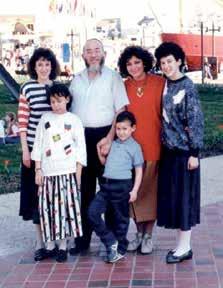



at a Hampton Inn. During the course of our trip, we had the opportunity to daven in three different shuls, including Agudath Israel, where we met and heard a shiur from Rav Moshe Heinemann. Our activities included a lengthy visit to the National Aquarium, the Maryland Science Center, and the American Visionary Museum. The children also went to the Get Air Trampoline Park, and we all watched IMAX films at both museums.
Having been involved with the Yeshiva of Kishinev from 1996 through 2006, I worked very closely with my copartner, Rabbi Moshe Eisemann, the former mashgiach of Yeshiva Ner Yisroel. He lived near the Yeshiva and traveled often to New York for meetings with other Vaad members and me. A number of times we all traveled to his home to discuss and organize Yeshiva matters. During these trips, I had the opportunity to meet with Rabbis Aharon Feldman, Sheftel Neuberger, z”l, and Yissocher Frand. We also traveled to Baltimore for two weddings of students who came to the States from our Girls School in Kishinev to attend the Bais Yakov of Baltimore.
Being involved with Jews from Poland from 1979 to the present, I brought over four teenagers and enrolled them at the Talmudical Academy (Chofetz Chaim)
of Baltimore. This took place during the years 2005-2010. I traveled there on a few occasions including for a graduation and a siyum celebration.
We also are friends with Mati and Libby Powojsky, who reside in Baltimore. I knew Mati from Warsaw. I kept up with them and their daughter Laila over the years. We visited them twice and spoke on the phone from time to time. Unfortunately, Mati, a”h, passed away a few months ago.
usual background.
At present, I cannot recall the exact year when we drove from Baltimore for a day trip to Annapolis, the state’s capital. It was definitely about fifty years ago. We went to visit the U.S. Naval Academy, and I remember seeing the midshipmen (students) in their navy-blue suits, gold buttons and collar insignia. Their heads were covered with crisp white caps above blue visors. We saw them marching while being led by cadets playing musical in-
them about eight years ago, here in the States. Over the years, Eliyahu and I developed a very special relationship, and we study together over Zoom every week. When we were there, we went to the local beach and boardwalk, which was practically devoid of people as it was long after the summer season. Eliyahu also took us to Assateague Island State Park, which is on an island in the Atlantic Ocean. It is best known for its herd of feral horses and pristine beaches, marshes, bays and coves. The Parypas have a very interesting personal history which I hope to share with my readers in a future article.
I remember seeing the midshipmen (students) in their navy-blue suits, gold buttons and collar insignia.
In August 1981, we took a trip with our three girls to Williamsburg, Virginia, and Busch Gardens. We made various stops along the way. Our Shabbos was spent in Silver Springs, Maryland. We davened in the Woodside Shul and were invited for the Shabbos lunch seudah at my friend Asher Urbach’s sister and husband. I remember they had a guest, Oscar Perez from Puerto Rico, who told us of his un-

struments with parade music.
Another place which we visited was the resort town of Ocean City in the fall of 2021. There, we visited Eliyahu Parypa, his wife Chaya, and their five lovely children. We went on an overnight trip to them, and though we stayed at a local hotel, we enjoyed all our meals at the Parypa home. Both parents are originally from Poland, but we only got to know
Hershel Lieber has been involved in kiruv activities for over 30 years. As a founding member of the Vaad L’Hatzolas Nidchei Yisroel he has traveled with his wife, Pesi, to the Soviet Union during the harsh years of the Communist regimes to advance Yiddishkeit. He has spearheaded a yeshiva in the city of Kishinev that had 12 successful years with many students making Torah their way of life. In Poland, he lectured in the summers at the Ronald S. Lauder Foundation camp for nearly 30 years. He still travels to Warsaw every year – since 1979 – to be the chazzan for Rosh Hashana and Yom Kippur for the Jews there. Together with Pesi, he organized and led trips to Europe on behalf of Gateways and Aish Hatorah for college students finding their paths to Jewish identity. His passion for travel has taken them to many interesting places and afforded them unique experiences. Their open home gave them opportunities to meet and develop relationships with a variety of people. Hershel’s column will appear in The Jewish Home on a bi-weekly basis.
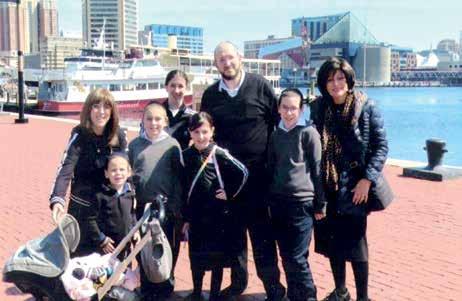

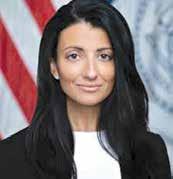
By Eliyahu RosEnBERg
Inna Vernikov has never been the type of person to look the other way in the face of injustice. Even as a young girl, growing up in Brooklyn, New York, she always possessed the courage to speak out against the mis -
treatment of others. In her mind, standing up for what’s right wasn’t just the right thing to do; it was her G-d-given duty, a mission that would later lead her to a life of public service.
“I wanted to be a lawyer from a very
My favorite mitzvah is lighting shabbos candles because it’s a time when everything stops. a nd the crazy life – especially that i have now and that i’ve had in the last couple years – just stops, and you go into a different mode of self-reflection and rest.
When you work hard, do what’s right, and stand up for the things that matter to you, at the end of the day, you’ll end up on the right side of things.
The way i fight antisemitism is by not being afraid of these [antisemitic] people. i’ll stand up, speak out, and write letters… i didn’t step into this because i needed a job. i stepped into this because i needed to stand up for my community.
young age,” the New York City councilwoman recalled. “It was all about the concept of searching for justice. Whenever I saw something that I thought was unfair or unjust, I always wanted to fix it – especially when I saw antisemitism.”
Born in Chernivtsi, Ukraine, Inna Vernikov and her family immigrated to the United States in 1996 in the wake of the Soviet Union’s collapse. She was twelve years old at the time, just as excited about her family’s journey to a new land as she was sad to leave all her Ukrainian friends behind. Upon arriving in Brooklyn, her family – herself, her parents, grandparents, and two younger siblings – all moved into a tiny, one-bedroom apartment on Avenue K and Ocean Avenue, where they would live for several years. Eventually, they moved to a slightly bigger apartment in Flatbush. It was a sacrifice for everyone, but Inna’s parents fervently believed that living in America would give their children a better future and a happier life.
“It was a real immigrant experience. We didn’t have much, and we accepted public benefits. I spoke zero English when we came,” Inna explained. “It was hard, but my parents always taught me about the concept of the American dream – that if you study hard and work hard, you can accomplish anything.”
Although Inna’s secular Jewish parents didn’t want her to become religious, they chose to send her to a frum
yeshiva for Soviet immigrants rather than to public school, which they feared would promote drug use and rebelliousness. But Inna’s parents quickly regretted that decision, as the yeshiva, little by little, began influencing the young girl to become frum. It was at the age of sixteen that Inna, at the encouragement of one of her teachers, began to partially keep Shabbos. It started with her just lighting Shabbos candles and making kiddush Friday night, but soon enough, she began observing the entire day.
“My parents are pretty anti-religious. So, in my family, it was not taken so well,” she recalled. “I think it was the impact of communism, which was very anti-G-d. You couldn’t have a religion or a G-d that you believed in because your god was communism. So, communism really created this gap, this hole when it came to Soviet Jewry... It was like, ‘Oh my G-d! My child is getting brainwashed!’”
After graduating from college, Inna went on to attend law school in Jacksonville, Florida, in hopes of fulfilling her lifelong dream of becoming an attorney. Unlike many lawyers, she was driven to pursue a law career not because of the “salary” but because she was genuinely interested in the field. But most importantly, in her eyes, being a lawyer was a means of helping others and promoting justice in this unfair world. Alas, even before completing her legal studies, Inna was already engaged
in a battle to help her fellow Orthodox Jewish students.
“When I was in law school, they set the graduation date for a Saturday, and I was not going to let that go,” Inna recounted. “There were around six Orthodox Jews in my law school. So, I decided to embark on a journey to make sure that I don’t graduate on Saturday. And I wanted to kind of pave the way for any other Orthodox Jews in that law school or in that area in Florida to not have to deal with that – because everyone wants to see their kids graduate.”
But the school was unwilling to accommodate Inna and her Jewish classmates’ religious practices, leading her to take matters into her own hands. Determined to ensure that the law school’s Orthodox Jews would be able to graduate without violating the sanctity of Shabbos, Inna began rallying support from others, including a professor, and advocated endlessly for the school to accommodate her religious request. Although the law school kept denying her request, she refused to capitulate and continued to fight for her values. In the end, Inna won the battle and graduated on a Sunday. And incredibly enough, in the years that would follow, the law school never scheduled graduation for a Saturday again.
Soon after her graduation, Inna became an immigration and divorce lawyer and started her own Manhattan law firm on Broadway.
“A lot of people complain about being lawyers. I think a lot of people go into it thinking they’re going to make a lot of money, and then, many people don’t. But I wasn’t that lawyer; I really enjoyed what I was doing,” Inna explained. “It was a lot of fun. It was great to have my own firm. I had a nice, small firm, and I had a nice office with a

couple of employees. I had it for around eight years, and I really enjoyed it.”
All the while, Inna had begun actively campaigning against antisemitism, becoming an active voice against Jew-hatred in New York and beyond. Inna’s family ultimately fled from Ukraine to New York City to save themselves from antisemitism. But unfortunately, in recent times, it seemed to Inna as though New York City and the country began to rapidly deteriorate, normalizing antisemitic sentiment and embracing toxic ideologies akin to communism. In her mind, the U.S. was, to some extent, transforming into the country that her family was forced to escape from. And thus, in an effort to fight for her people and her city, Inna left her firm, campaigned to become a member of the New York City Council, and was endorsed by Assemblyman Dov Hikind, whom she had worked with in the past. In 2021, Inna became a councilwoman and has been serving the city’s 48th District since.
Since Inna was elected to the City Council, two major wars have erupted, both of which she is personally connected to. In 2022, Russia launched a full-scale invasion of Ukraine, the councilwoman’s country of origin. And on October 7, 2023, the Hamas terror group invaded southern Israel, murdering 1,200 people and kidnapping over 250 others, triggering an all-out war between Israel and several terrorist organizations.
Immediately after news of the invasion of Ukraine broke, Inna became the city council’s first member to speak out against Russia and went on to unanimously pass a resolution in support of the embattled country. She then embarked on a mission to help those suffering from the war in her home country.
“We set up a center in Chabad in the neighborhood. We sent 300 boxes of aid to Ukraine,” she shared. “We had refugees that came here and needed help, and we connected them with services. You know, we try to do our best. We don’t hear that much about Ukraine anymore in the news. I think people have a little bit of fatigue hearing about what’s happening there. Now, the main focus, at least for us, is on Israel and what’s happening here.”
While it was painful for Inna to see the people of her home country, Ukraine, under attack, she was horrified to see her Jewish brothers and sisters massacred in Eretz Yisrael, the eternal homeland of her people. Since the tragic day of October 7, the councilwoman has doubled down on her commitment to speaking out against antisemitism and has been encouraging others to join her in the fight. She has been a particularly strong voice
against Jew-hatred on college campuses and the streets of New York City and has used her platform to urge victims of antisemitic hate crimes to stand up and speak out.
“I’ll be honest. What shocks me is how afraid people are to speak out. I’ve been doing this for a couple years now, and I’ve seen a lot of that. And it’s really bad,” the councilwoman explained.
“It’s not good that Jews are so afraid to make a complaint, to say something, to express something publicly, to post –especially students in school.
“The way I fight antisemitism is by not being afraid of these people. I’ll go out, stand up, and write letters. And a lot of times, people see me as controversial or aggressive. I don’t really care. I didn’t step into this because I needed a job. I stepped into this because I needed to stand up for my community,” she declared. “My motto is to not be afraid. That’s the way I fight antisemitism.”
This article is based on a podcast, “Inspiration For the Nation,” hosted by Yaakov Langer. To catch more of this conversation, you can watch it on LivingLchaim.com or YouTube.com/LivingLchaim or listen wherever you listen to podcasts (just search for “Inspiration For The Nation”) or call our free hotline: 605-477-2100.

Moderated by Jennifer Mann, LCSW of The Navidaters

Dear Navidaters,
I read your column every week and decided to submit a question of my own.
I’m 25, in good physical shape, and have been dating a girl for two months. I come from a religious background and learn b’chavrusa every morning. She also comes from a religious background and grew up in Brooklyn. She’s 25 and is everything I’m looking for in a shidduch. She’s kind, intelligent and does a lot of chesed. Things are serious. However, a close family friend recently mentioned to me that she had once told her that she actually finds my own brother more attractive than I am. For reference, my brother is 22, super athletic, and has a great job. This information has left me feeling quite shocked and uncertain about our future. I am unsure if I should propose to her due to this information.
Please advise, Dovid*


Rebbetzin Faigie Horowitz, M.S.
Do a few things. Consider when this was said. Was it a recent comment or an older comment that dated back to before you were dating? Second, look at yourself in the mirror. Third, discuss attraction in general at an appropriate time if you feel the chemistry is moving and developing further. If not, reconsider. Fourth, don’t commit until you are clear that she is attracted to you.
Michelle Mond
Wow, Dovid, thank you for bringing this question to the panel. What is puzzling to me is why your close family
friend would say such a thing. It is very hard to tell you what to do because there is no way to be sure about the accuracy of what was actually said. I also do not know you, this family friend, or the dynamic.
Unfortunately, jealousy runs rampant, and when jealousy is present, untrue things are said. I have heard story after story of situations where miscommunications ruin a shidduch. We also don’t know what the circumstances were surrounding her comment. It could be she had seen your brother somewhere and mentioned that he was attractive, and she misconstrued it. Who knows?! Do not end the shidduch because of this. She is dating YOU, not your brother, and you can work through your own confidence to recognize that your brother is not a threat.
At the same time, I do understand your need to gain clarity. For this, you need to communicate directly with the

girl you’re dating. Talk to her openly and give her a chance to open up about the comment, without being defensive about it. I have a feeling you will find out there is another side to the story!
Tzipora Grodko
Oh, boy. Gossip in all its glory. Yikes. If I was in your shoes, I would feel extremely confused and insulted if this information was relayed to me. Regardless of the fact that you don’t know if it’s true, I’m so sorry you had to hear that. There are two options. Option 1: You disregard the comment knowing that if she wants to marry you, she must really love you. The comment is irrelevant and frankly has no value if she’s choosing to spend the rest of her life with you. Her decision reflects her admiration and affection.
There are all too many cases of “helpful” friends who sabotage potentially wonderful relationships.
If that knowledge isn’t enough for you, then communicate how you feel. You don’t want to harbor or let any idea haunt you and express itself in a passive aggressive or subconscious way.

Dr. Jeffrey Galler
Wow, there’s a lot to unpack here.
Let’s address three issues.
Issue #1 – “Helpful” friends
This column has often emphasized the importance of keeping your personal dating information private. There are all too many cases of “helpful” friends who sabotage potentially wonderful relationships.
Dovid, it might be hard for a nice person like you to believe it, but there are some folks who seem to get perverse gratification when they get a chance to ruin someone else’s happiness. All too many times we hear of “friends” who enjoy voicing opinions like, “Oh, that’s who you’re dating? I heard all about him. He is not for you. You can do much better.”
I honestly don’t know why some people act like that. But, ask yourself the following question: Why in the world
would a “close family friend” take a harmless, offhand remark that your girlfriend may or may not have said, take it out of context, blow it out of proportion, and maliciously report it to you?
Is this family friend actually an evil person? Or is she simply a fool? It doesn’t matter. Ignore this gossiping witch and trust what your G-d given common sense, instincts, and intuition tell you about your wonderful girlfriend.
My father, a”h, always told us that when we say something, it is like shooting an arrow into the sky. After we shoot it off, we have absolutely no control over where it will go, where it will land, and what harm it can cause.
Stay away from people like this socalled “good family friend.”
It’s a story as old as time. Sefer Bereishis is a series of stories about the negative effects of sibling rivalry.
Note the unhappy tales featuring Cain and Hevel. Avraham
Hi Dovid,
I can certainly understand your feelings of shock and general uncertainty about your future together. Finding this out is upsetting, indeed. My response is going to be short and sweet. The first, and less importance piece worth mentioning is that it is entirely possible that this statement that landed at your doorstep is nothing more than the end result of a broken game of telephone. I have a raised eyebrow at anyone who would pass along something like that to
you, unless this person said it as a warning to you because the woman you are seeing has some red flags.
In my humble opinion, if this is something that bothers you, you have to talk to your girlfriend about it. I know it will be deeply uncomfortable, but relationships require hard conversations and communication.
So many people jump into serious relationships and/or marriages without
and his brother’s son, Lot. Yitzchok and Yishmael. Yaakov and Eisav. Yosef and his brothers.
By contrast, note how, subsequently, brothers Moshe and Aharon had very important and very different roles in our history and loved, supported, and admired each other without a scintilla of jealousy.
When I grew up, it was clear that my older brother was taller, more athletic, and possessed incredible leadership skills. I looked up to him and admired him. (Well, perhaps I was just a little bit envious.) But I grew to realize that I was the much better looking, smarter, funnier (and humbler) brother.
What am I trying to convey to you, Dovid? Yes, your brother has admirable qualities, but so do you. You devote yourself to Torah study every morning, you have tremendous middos and hashkafa, and it is clear from your letter that you are a very intelligent, warm, and sensitive person. And, most importantly, note how this amazing girlfriend has fallen in love with you, is anxiously waiting for you to propose to her, and wants to spend the rest of her life with you.
It’s normal to retain residual, painful, memories of childhood rivalries and animosities. But, you’re a grown up now. Move on with your life.
You can work through your own confidence to recognize that your brother is not a threat.
Issue #3 – “Attractive” but not “attracted to”
Thinking that someone is “attractive” does not mean being “attracted to” that person.
Many years ago, when I began dating, I clearly found Marilyn Monroe and Elizbeth Taylor more “attractive” than any of the girls that I was dating.
However, that certainly didn’t mean that I was “attracted to” them and wanted to spend my life with them! You are blessed with a girlfriend who sounds perfect for you and is clearly “attracted to” you more than anyone else in the world.
Should you propose to this wonderful young lady and pray that she accepts your proposal? YES!
Should you ever again trust or respect that gossiping “good family friend”? NO!
having the difficult conversations. And it’s really not a good idea. Resentment builds, anger bubbles, distance creeps in.
At the same time, let’s not jump to any conclusions or throw out the baby with the bath water. To me, at this very moment, it’s not about whether or not you should propose. It’s much more simple: it’s about having the conversation.
This is definitely a troubling comment. I think you owe it to yourself and this relationship (seems like a good one) to get talking.
A little message to everyone, if I may. Please have all the hard conversations before you take that walk down the
aisle to the person who you will be G-d willing conversing with for the rest of your life. You should be met with kindness, open ears, sensitivity, honesty and compassion.
Potential script: “I have something that’s been on my mind, and I don’t know how to bring it up. It’s been bothering me. I want to always be honest with you…. Someone recently shared with me that you said you found my brother more attractive than me. I couldn’t not say something….” See what she has to say.
Sincerely, Jennifer
By Sara Rayvych, MSEd
Afew weeks ago, we discussed teaching children to respect the space around them. More than learning to respect objects and locations, we need to maintain the dignity of others. Teaching children to respect adults, teachers and other children is an important middah and one that deserves its own topic. But, when teaching how to respect others, we often forget that children are people, too, and they also deserve to be treated as a tzelem Elokim.
Despite being smaller people, children are not simply mini adults but a category all their own. They think and act differently, and this is how Hashem set up the world. Unfortunately, along with this comes the tendency to not recognize that younger people have feelings, a variety of emotions and deserve the same dignity that we would give to any other person.
Maintaining a child’s dignity will look very different than the kavod we


would give a respected adult. A child’s needs are different from an adult, and those needs will differ as the child grows. The emotional needs of a baby have few similarities to the needs of a teen, but they will both differ from that of an adult.
Additionally, we have the unique task of educating our children and ensuring they grow to be the dignified individuals they are intended to be. This special role necessitates that we correct them, something we wouldn’t so readily do to another adult. Many erroneously think there is a contradiction between chinuch and dignity. Nothing could be further from the truth, and treating a child as a mensch can only enhance their chinuch.
Dignity and respect for a child will look very unlike that of an adult. Especially in a culture that appreciates and stresses kavod towards particular individuals (such as parents, rabbanim, older siblings, the elderly and kohanim), it would be absurd to expect an adult to stand for a child or act like their servant.
Part of a child’s chinuch includes teaching them to respect others and recognize the special role different people will play in their lives. It’s only when we know to respect others that we can fully gain from them. Sadly, we can see from the society around us what happens
when there is a breakdown in respect towards authority. For example, children (of all ages) are required to perform kibbud av v’aim. A loving parent provides for their child and guides them through life. Giving kavod is one of the mediums that assists a child in absorbing their parents’ lessons. Additionally, it’s the honor that we give to our rebbeim and moros that makes their teachings so prominent in our mind. With this in mind, it’s hard to imagine what “kavod” we would give a child. But, let’s expand our definition slightly. There is the active honor we give someone, such as standing for them and not contradicting them. But, there is another aspect of giving someone dignity, and this includes not shaming them or speaking derogatorily to them. It’s this part that adults often forget when it comes to the younger people in their life. Often, it’s not even intentional, and a loving parent can inadvertently say something they shouldn’t.
Youngsters develop a sense of shame from an early age. Adults tend to forget and may do things that will embarrass their children. Kids need to be guided and educated; whenever possible, this correction shouldn’t be done in front of others. Even if we think their latest escapade is hilarious, we need to avoid sharing it in their presence – or at all. Parents should avoid laughing at their
children if it will cause the child embarrassment. I know this can be hard since kids are so cute and do the funniest things, but we need to take into account their feelings, too.
We should not call them cutesy names if it will embarrass them. Certainly, adults shouldn’t call children negative or offensive names. There is no need to “talk down” to them or speak derogatorily. Clear – but concise –speech is often all that’s needed. “Place your plate in the sink.” “Clothes belong in your hamper, not the floor.” “Homework needs to be completed before playtime.” “Don’t hit your brother.” We can add “please” to a request, too.
Chinuch is meant to be k’darko, and so is dignity. We need to ensure we match their developmental level. For example, an infant won’t mind if their diaper is changed with others present, a slightly older child will be horrified to have been partially unclothed in public. Teenagers – in particular – are very sensitive and shame easily. We don’t need to hide every time our teen walks by with their friends, but we should be careful to not embarrass them, even as “a joke.”
It’s our responsibility to ensure the next generation is prepared to pass on our divine tradition. Many might say this article conflicts with the sacred task of chinuch. They could argue, how can we guide our youth if we can’t say or do anything negative.
Children are born unaware of our
times, we may need to give a consequence or some form of punishment. All of this can still be done in a way that maintains dignity.
Parenting is a balance. We can still maintain the leadership of a parent, while treating our children as the dignified b’nei melachim they are. As an example, a store manager can speak to his
We have the unique task of educating our children and ensuring they grow to be the dignified individuals they are intended to be.
values and proper behavior. They are inherently selfish and self-centered. It’s our duty as parents to shape our diamonds into their full potential. It would be contradictory to that goal to deny our children our guidance and love.
There is no need to speak derogatorily to children. Yes, we need to correct them. Yes, we need to guide them. At

employee in a gentle or harsh manner. In both scenarios, he’s still the boss, but his employees will respond very differently, and a degrading tone is generally not necessary to make a point. We can imagine the gently corrected employee will be far more compliant than the degraded one.
“Please pick up your coat and place it
on its hook” said in a firm voice is more effective than “What’s wrong with you, why can’t you hang up your coat when you walk in?” The first phrasing maintains the child’s dignity and is also better at teaching a child what is expected of them.
If we degrade a child, they will degrade others, because that’s what they know. Speaking to a child as a human being is one way to ensure they will do the same to others. We can start to set our children on the path for a future of positive communication and relationship building.
When we educate and guide our children with love, we are doing our utmost to pass on the torch of Torah. Our children are the future of our nation, despite their smaller size. Taking the time to think before we speak can make our communications more effective and befitting Hashem’s holy nation.
Sara Rayvych, MSEd, has her master’s in general and special education. She has been homeschooling for over 10 years in Far Rockaway. She can be contacted at RayvychHomeschool@gmail.com.


By Aliza Beer MS, RD, CDN
Aquestion many of my clients frequently ask is, “How can I eliminate bloating?” Bloating is a common condition characterized by a feeling of fullness or tightness in the abdomen. This sensation is often accompanied by visible swelling of the abdominal area. Bloating can be uncomfortable and sometimes even painful, affecting people of all ages. Not only does bloating cause physical discomfort, it can also impact our self-esteem, particularly when we need to attend school, work, or social events. The effects of bloating on both our physical comfort and emotional well-being makes finding effective solutions a priority for many.
Let us explore the science behind bloating, identify foods that can cause or alleviate it, and examine other factors that contribute to or help eliminate/reduce bloating.
The Science Behind Bloating
Bloating occurs when the gastrointestinal (GI) tract is filled with air or gas, leading to a feeling of fullness and abdominal distension. There are a few physiological processes that can contribute to bloating:
1. Gas Production: During digestion, bacteria in the large intestine break down undigested food, producing gas as a byproduct. Foods high in certain carbohydrates, such as fibers, fructose, lactose, and sorbitol, can increase gas production. The bacteria ferment these carbohydrates, leading to the release of gasses like hydrogen, methane, and carbon dioxide, which can accumulate and cause bloating. Examples of these foods are nuts, seeds, beans, legumes, cruciferous vegetables (broccoli, cabbage), whole grains, milk, sugar-free products, and fruits.
2. Swallowed Air: Air swallowing can contribute to bloating. This can happen when we eat or drink too quickly, talk while eating, chew gum, smoke, or drink carbonated beverages. The swallowed air

can accumulate in the stomach and intestines, leading to bloating and discomfort.
3. Digestive Issues: Several digestive disorders can lead to bloating. Conditions such as irritable bowel syndrome (IBS), small intestinal bacterial overgrowth (SIBO), and food intolerances (like lactose or gluten intolerance) can disrupt normal digestion and cause excessive gas production or impaired gas transit, leading to bloating.
4. Constipation: When stool builds up in the colon, it can cause bloating. Constipation slows down the movement of waste through the digestive tract, which can result in the fermentation of undigested food and subsequent gas production.
5. Hormonal Changes: Hormonal fluctuations, particularly in women, can affect digestion and lead to bloating. For example, during the menstrual cycle, hormonal changes can cause the body to retain water and slow down GI motility, leading to bloating.
6. Gut Microbiota: Gut microbiota is a group of microorganisms that include bacteria, viruses, fungi, and other microbes that reside in the digestive tract. These microorganisms play a role
in maintaining the health and function of the digestive system. The balance of bacteria in the gut plays a crucial role in digestion and gas production. An imbalance in gut microbiota, often due to factors like diet, antibiotics, or illness, can lead to increased gas production and bloating.
Certain foods are more likely to cause bloating due to their composition and the way they interact with the digestive system.
1. High-Fiber Foods: Fiber is essential for a healthy diet, aiding in digestion and preventing constipation. However, foods rich in fiber, such as beans, lentils, broccoli, Brussels sprouts, cabbage, and whole grains, can increase gas production during digestion. The fiber in these foods is broken down by bacteria in the large intestine, resulting in the production of gasses like hydrogen, methane, and carbon dioxide. While this process is normal, it can lead to bloating and discomfort if too much gas is produced.
2. Carbonated Drinks: Beverages like soda, sparkling water, and beer contain dissolved carbon dioxide. When consumed, this carbon dioxide is released
into the digestive system, which can lead to an accumulation of gas in the stomach and intestines. This trapped gas can cause bloating and a feeling of fullness.
3. Dairy Products: Dairy products, such as milk, cheese, and yogurt, can cause bloating in people who are lactose intolerant. Lactose intolerance occurs when the body lacks sufficient amounts of the enzyme lactase, which is necessary for breaking down lactose, the sugar found in dairy. Without enough lactase, lactose remains undigested in the gut, where it is fermented by bacteria, producing gas and leading to bloating, diarrhea, and abdominal pain.
4. Artificial Sweeteners: Sugar alcohols like sorbitol, mannitol, and xylitol found in sugar-free products are mainly found in low-calorie foods. These sweeteners are not fully absorbed and reach the large intestine, where bacteria ferment them, producing gas that can cause bloating and gastrointestinal discomfort.
5. Fried and Fatty Foods: Highfat foods, such as fried foods, fatty meats, and creamy sauces, can slow digestion, delay stomach emptying, and lead to fullness and bloating. They also stimulate bile release, potentially causing further discomfort and bloating.
How to Reduce Bloating Based on Common Causes
1. High-Fiber Foods:
a) Gradual Increase: If you’re increasing your fiber intake, do so gradually. This allows your digestive system to adjust and reduces the risk of excessive gas production. Begin with a small amount of fiber and increase it over time. For example, if you currently eat 10 grams of fiber per day, you might increase your intake by 2-3 grams per week until you reach your target.
b) Hydrate: Drink plenty of water to help fiber move through your digestive system and prevent constipation.
c) Diversify Fiber Sources:
Choose a variety of fiber sources, including soluble fiber (found in oats, apples, and carrots) that is less likely to cause bloating compared to insoluble fiber (found in whole grains and nuts). Only eating cruciferous vegetables like broccoli, cabbage, and cauliflower can increase your chances of being bloated if you don’t balance it with soluble fiber. For example, if you are eating a salad with tomatoes, cucumbers, and peppers (insoluble fiber), pair it with red onions and cooked quinoa (soluble fiber).
d) Cooked vs. Raw : Cooking high-fiber vegetables like broccoli and Brussels sprouts can make them easier to digest and reduce gas production
2. Carbonated Drinks
a) Limit Intake: Reduce or avoid beverages like soda, sparkling water, and beer that contain dissolved carbon dioxide. If you drink a glass of sparkling water every day, start by trying to decrease that amount by every other day for one week.
b) Switch to Flat Drinks: Opt for non-carbonated alternatives, such as still water or herbal teas, to minimize gas accumulation
3. Dairy Products
a) Lactose-Free Alternatives : Choose lactose-free dairy products or plant-based alternatives like almond milk, soy milk, or lactose-free yogurt.
b) Enzyme Supplements: Use lactase supplements to aid digestion of lactose-containing foods if you have lactose intolerance.
c) Monitor Portions: If you consume dairy, start with smaller portions to gauge tolerance and gradually adjust based on your comfort level. For example, if you usually have ½ cup of Greek yogurt, start with ¼ cup and see if it makes a difference in your bloating.
4. Artificial Sweeteners
a) Check Ingredients: Read labels of sugar-free products to avoid sweeteners like sorbitol, mannitol, and xylitol. Try using stevia or monk fruit sweetener, which are more tolerated.
5. Fried and Fatty Foods
a) Choose Lean Options: Opt for lean proteins and avoid fried and excessively fatty foods. Grilled, baked, or steamed options are better alternatives.
b) Eat Smaller Portions: Reducing portion sizes of high-fat foods can help lessen their impact on digestion and minimize bloating.
c) Monitor Fat Intake: The fat in your diet should primarily consist of healthy sources, such as avocados and nuts. You can indulge in fatty foods, like fries and burgers, a couple of times a month.
Certain foods can aid in alleviating bloating by supporting healthy digestion and reducing gas production.
1. Ginger: Ginger is known for its anti-inflammatory and digestive benefits by soothing the digestive tract and alleviating bloating. It helps reduce inflammation and promotes efficient digestion,
more frequent meals can prevent overloading the digestive system, which helps reduce bloating. Chewing food thoroughly and eating slowly can also minimize swallowed air, which contributes to bloating. Try one of these mindful eating practices and see if it makes a difference!
2. Hydration: Adequate water intake is crucial for preventing constipation and reducing bloating. Drinking plenty of water helps flush out excess sodium from the body and supports overall digestive health. Staying hydrated ensures that the digestive system functions optimally.
3. Physical Activity: Regular exercise promotes healthy digestion and helps move gas through the digestive tract more
Eating smaller, more frequent meals can prevent overloading the digestive system, which helps reduce bloating.
which can minimize the feeling of fullness and discomfort.
2. Peppermint: Peppermint, available in tea or supplement form, contains menthol, which has relaxing effects on the muscles of the gastrointestinal tract. This relaxation helps release trapped gas and reduces bloating. Peppermint also aids in soothing the stomach and improving digestion.
3. Yogurt: Yogurt that contains probiotics, beneficial bacteria, can help balance gut flora and improve digestion. By promoting a healthy balance of gut bacteria, yogurt can reduce gas production and ease bloating. Look for yogurt with live active cultures for the best results.
4. Fennel: Fennel seeds or fennel tea can help relax the muscles in the GI tract and reduce gas buildup. Fennel has carminative properties, which help in relieving bloating and abdominal discomfort by facilitating the passage of gas.
5. Pineapple and Papaya: These tropical fruits are rich in digestive enzymes, such as bromelain in pineapple and papain in papaya. These enzymes help break down proteins more efficiently, which can reduce gas production and alleviate bloating.
In addition to dietary choices, several lifestyle factors can influence bloating.
1. Eating Habits: Eating smaller,
tive tract, resulting in bloating, gas, and abdominal pain. IBS is characterized by a sensitive gut and abnormal bowel habits, causing bloating and cramping. If you suspect you have a food allergy, intolerances, or digestive issues, it’s wise to visit a healthcare provider for a proper diagnosis. Managing bloating in these conditions often requires dietary adjustments, medication, and lifestyle changes.
Here are a few meal ideas that promote healthy digestion and reduce bloating.
1. Breakfast
a) Oatmeal with mixed berries and chia seeds
b) Scrambled eggs whole wheat wrap with spinach and tomatoes
2. Lunch
a) Grilled chicken salad with quinoa
b) Turkey breast sandwich with whole grain bread and mixed greens
3. Dinner
a) Turkey meatballs with zoodles
b) Baked flounder with sweet potatoes and green beans
efficiently. Activities such as walking, jogging, or yoga can aid in reducing bloating by encouraging normal digestive motility and gas expulsion.
4. Stress Management: Stress and anxiety can affect gut motility and contribute to bloating. Practices such as yoga, meditation, and deep-breathing exercises can help manage stress levels and improve digestive function. Reducing stress supports a balanced digestive system and decreases bloating.
5. Avoiding Chewing Gum and Smoking: Chewing gum and smoking increase the amount of air swallowed, which can lead to bloating. Avoiding these habits helps minimize the intake of air into the digestive system, reducing the likelihood of bloating and discomfort.
Food allergies and intolerances can significantly impact bloating. When the body reacts negatively to certain foods, it can lead to digestive distress, including gas and bloating. Common culprits include lactose and gluten. For instance, gluten intolerance or celiac disease can cause inflammation and bloating when gluten-containing foods are consumed. Inflammatory Bowel Disease (IBD) and Irritable Bowel Syndrome (IBS) are chronic conditions that cause significant bloating and digestive discomfort. IBD, including Crohn’s disease and ulcerative colitis, leads to inflammation in the diges-
Managing bloating involves understanding its causes and implementing practical strategies to alleviate discomfort. By recognizing the factors that contribute to bloating, such as certain foods, swallowed air, digestive issues, and hormonal changes, you can make informed dietary and lifestyle adjustments. Incorporating fiber gradually, opting for non-carbonated beverages, and choosing lactose-free or low-fat alternatives can help reduce bloating. Focusing on foods that help with digestion, such as ginger, peppermint, and probiotics, can offer relief. Adopting mindful eating habits, staying hydrated, and managing stress are also crucial in reducing bloating. For those with food allergies, intolerances, or chronic digestive conditions like IBD or IBS, seeking professional advice is essential for proper management and relief. By taking a comprehensive approach, you can address bloating effectively and enhance both physical comfort and overall well-being.
Aliza Beer is a registered dietitian with a master’s degree in nutrition. She has a private practice in Cedarhurst, NY. Patients’ success has been featured on the Dr. Oz show. Aliza can be reached at alizabeer@gmail.com, and you can follow her on Instagram at @alizabeer
By Malka Klaver
We need to talk about being uncomfortable.
Unfortunately, in less than a week, we will be sitting on the floor mourning the destruction of the Bais Hamikdash and the reality that it still has not been rebuilt. We long for a world of peace and clarity, an end to the dissemination of falsity, hate, and division amongst Klal Yisroel and the whole world against us.
How do we sit this year and come out stronger, more whole, and more resolute to be a light and illuminate the penetrating darkness that seems to be all around us?
It starts within.
It’s simple, yet it requires courage and inner strength to execute. It all starts with you. Your strengths, your weaknesses, and your commitment to one of the greatest gifts life can offer: self-growth.
Growth takes focus, honesty, and self-discipline. The mental and emotional strength to own your character flaws and continuously work on them. To hold yourself accountable and follow through in making real changes. There is only one way you can achieve this: by being comfortable with being uncomfortable.
And not just one time but over and over again. We have to ask ourselves where we are bruised – and perhaps broken – to the point that we have hidden away a part of ourselves that we and the world are missing so badly. Compassion. Kindness. Forgiveness. Love. Trust. We can’t exemplify these traits and values to others unless we have them firmly planted within ourselves. We can’t give what we don’t have. We need to first unlock the wellsprings of unadulterated goodness that is in every one of us. How do we know we have it? Because we know when Hakodesh Baruch Hu created us, He gave everyone a piece of Himself. And that pure neshama He imbued in us carries within it a combination of the qualities and character of Hashem Himself. Sometimes, they can get pushed away and covered up as we cope with pain, sor-

row, and doubt. And without realizing it, we move far away from the greatness that lives inside of us. A microcosmic depiction of the macro galus of our people.
Tisha B’Av is a day to mourn our nation’s demise and our own. Through loss, sadness and loneliness can come the greatest manifestation of rebirth, joy, and connection. But you can only rebuild something more whole and complete once you are keenly aware and accept that which is broken.
This Tisha B’Av, look honestly at your flaws and notice how they hurt and distance those that are close to you – specifically your spouse. Marriage is a unique relationship. It is the closest relationship that you can have in this world. We are not born into our marriage, which creates a unique opportunity to accept another on a whole different level. Marriage can provide a tremendous amount of comfort and joy. Because it has this incredible potential for closeness and love, it also carries an enormous potential for hurt, sadness, and loneliness.
Everyone experiences highs and lows in their marriage. There will always be moments of greater connection than others. But a good marriage is one where the less connected times pass with minimal dam-
age and even facilitate greater connection. What can we do to help move our marriage into a more connected and less distant state?
Change yourself.
Can you internalize the growth and make actual changes to those crucial difficult moments in your marriage? On Tisha BAv, think to yourself in a quiet moment: When I look back and think about the spouse that I want to be and the spouse that I am, does it match up? Why not? It’s OK to be uncomfortable and continue down that train of thought anyway. And it’s worth the discomfort, because a great marriage can make the most difficult challenges manageable and provide a bedrock of support when the world is shaking around us.
Having a close marriage is indescribably powerful. And we need a lot of power today to combat the pain and the struggles all around us.
We are living in dark times. We have a tremendous amount of light, individually and as a community. And yes, we are flourishing in many ways, but our people are deeply wounded and so many families are broken. On the surface, they may look whole, but there is so much lack of connection, of love, of belonging inside the homes of our very own.
How can we repair this?
Attach yourself to the most meaningful task of self-growth. Look in the mirror and ask yourself: how can I do better? I want to do better. I know I can be better. Start small – but start. And if you’re brave, share with your spouse and ask for their honest feedback. I’m not saying that the burden of marital repair is all on you. Someone who’s being hurtful or absent in a marriage should not be given a free pass, but that’s another conversation. Tisha B’Av is a day where we are mandated to self-reflect and be sad and uncomfortable with falling short individually, and as a people. How powerful would it be if we could sit in our uncomfortable state and think deeply and sincerely about how we can change our interactions with our spouse to be a little bit more thoughtful, sensitive, and kind? Our relationship with Hashem and with others starts within ourselves. If we don’t have it, we can’t give it. We have to trust and believe in our value and our unconditional worth. Then we’ll have the confidence and inner strength to make changes in our life and share those beautiful godly traits buried within us with others. In the merit of our devotion to peace and renewed connection in our marriage, we will iy”H be zocheh to the ultimate source of peace and connection, the third and final Bais Hamikdash!
Malka Klaver is a certified marriage coach and inspirational speaker. She is passionate about empowering, guiding and inspiring Jewish women to have happy and harmonious marriages. She also hosts a podcast titled, “Best Friends for Life,” where she discusses relatable challenges and practical tools to enhance your marriage. Go to malkaklaver.com to learn more and receive “The Four Strategies You Wish You Learned Before You Got Married.” For questions or comments, please email her at Malkaklaver@gmail.com. She would love to hear your feedback!


By Naomi Nachman
This dish is a no-fail winner fish dinner that is super simple and kid-friendly to boot.
Perfect for the Nine Days!
Salmon
◦ 2 eggs, lightly beaten
◦ 2 tablespoons vinegar
◦ 1 cup flour
◦ 2 (6-ounce) bags snack of choice (tortilla, potato chips, Bissli), crushed
◦ 2 pounds fresh salmon, cut into strips
Potato Wedges
◦ 6 medium Yukon Gold potatoes, cut into 1-inch cubes
◦ 1 teaspoon garlic powder
◦ 1 teaspoon paprika
◦ 1 teaspoon onion powder
◦ Salt, to taste
◦ Pepper, to taste
◦ ¼ cup canola oil
Tartar Sauce
◦ 4 tablespoons mayonnaise
◦ 2 tablespoons sweet relish
◦ 2 teaspoons Dijon mustard
◦ 2 teaspoons white wine or apple cider vinegar

Prepare the Salmon
1. Preheat oven to 400°F.
2. Place eggs and vinegar into a bowl; whisk to combine. Place flour into a second bowl and snack crumbs into a third.
3. Dip each piece of fish into flour, then into egg mixture, and then into crushed snacks, making sure the entire strip is fully coated.
4. Place on a baking sheet lined with parchment paper. Bake for 20 minutes. Prepare the Potato Wedges
1. Toss ingredients together in a bowl, then lay on a baking sheet.
2. Bake 40 minutes on 400°F.
Prepare the Tartar Sauce
1. In a small bowl, mix the mayo, relish, mustard, and vinegar. Stir to combine.
2. Serve fish with tartar sauce.
Naomi Nachman, the owner of The Aussie Gourmet, caters weekly and Shabbat/ Yom Tov meals for families and individuals within The Five Towns and neighboring communities, with a specialty in Pesach catering. Naomi is a contributing editor to this paper and also produces and hosts her own weekly radio show on the Nachum Segal Network stream called “A Table for Two with Naomi Nachman.” Naomi gives cooking presentations for organizations and private groups throughout the New York/New Jersey Metropolitan area. In addition, Naomi has been a guest host on the QVC TV network and has been featured in cookbooks, magazines as well as other media covering topics related to cuisine preparation and personal chefs. To obtain additional recipes, join The Aussie Gourmet on Facebook or visit Naomi’s blog. Naomi can be reached through her website, www.theaussiegourmet.com or at (516) 295-9669.



By Nati Burnside
Most restaurants in the kosher world lean one way…or the other. If you go to a place with counter service, you will usually get fairly unfancy food. If you go to eateries that have waiter service, the food is likely to be a little bit more high-end.
Capri, a new dairy restaurant in Woodmere, is trying to change that. Rather, it might not be actively trying to change anything at all, but instead, it just seems to put out good, elegant food at an affordable price point. The dishes are plated nicely, and it certainly has a nicer vibe than other places it might be competing with.
While working off of their brunch menu, Capri is counter service, yet serving a quality product. Everything still seems like an upscale dairy cafe in presentation, only without the high prices and waiter service. And even though there are waiters, once they switch to the dinner menu later in the day, the prices remain extremely reasonable for the type of fare you’ll find when you sit down.
When I was invited to Capri, I was able to taste dishes off both of their menus. If you go before 4 p.m., your meal will be guided by the brunch menu, whereas, after that point, the dinner menu takes over.
Starting with the brunch menu, I would recommend the Italian Grilled Cheese. Everybody loves a grilled cheese, but Capri takes the sandwich up a notch in a couple of ways. The first is that the sourdough and mozzarella sandwich is dipped in batter and fried to give it an added crunch on the outside while sealing in the cheesy goodness. The second step is the addition of a marinara caper sauce to dip the sandwich in. The result is like a more upscale version of the best mozzarella sticks you’ve ever had in your life. Sticking with the brunch menu, my favorite of the pizzas is the Capri Slice. This invention has a tomato sauce base
topped with slices of fresh mozzarella, cherry tomatoes, and fresh basil with a drizzle of balsamic reduction. The crust is a crisp base that provides a good crunch and supports the toppings nicely, the sauce and cherry tomatoes contribute a rich acidity, the cheese reminds you that it’s pizza, the basil brings an herby twist, and the balsamic finishes the bite with a touch of sweetness.
Both of those items are great on the earlier menu, but my two favorite things are thankfully available on both menus so you don’t have to worry about what time you sit down. My top pick is the Dirty Fries. This large portion of fries is the best dairy version I’ve ever had. The fries are loaded with black beans and pico de gallo with a duo of melted cheeses (cheddar and mozzarella) and topped with a dollop of spicy mayo. The only downside here is that you may not be able to stop eating them once you take your first bite. The portion is easily enough for people to share – just be cognizant that you are risking a race to finish them amongst the members of your party.
Less conducive to sharing but also addictive is the Homemade Pappardelle Mushroom Truffle. There’s nothing like pasta that’s made in-house and I’m a sucker for a good white sauce, so this really hit the spot for me. The combination of mushrooms (cremini and shiitake) and truffle oil was a smash hit as the rich flavors of the parmesan and truffle oil balanced well with the meatiness of the mushrooms and the thickness of the house noodles. I could easily eat this dish every day for a week and not get tired of it.
As we move on to the dinner menu there start to be more fish options to choose from. Anybody looking for a salad that is both more than just an appetizer and something out of the ordinary should check out the Kani Salad. The ingredients might sound familiar. There’s



kani, vegetables (red and yellow peppers, cucumber, carrot, and red onion), and crispy wontons with an Asian dressing. But with everything cut julienne (matchstick) style, the finished product kind of looks like a more colorful slaw than anything else. The flavors are great, and you don’t have to worry about getting some of everything onto your fork at the same time as everything pretty much blends together. The result is a crunchy, tangy, refreshing salad that can be either shared or selected as a healthy main.
Going the opposite direction, the Fish and Chips Burger isn’t really healthy or shareable. But it is absolutely delicious, so you still might want to order it. The pretzel bun makes for a good vehicle to support the pieces of tempura-battered mahi mahi, house slaw, and tartar sauce.



As indicated in the name, the sandwich comes with fries which are really crispy and fill out the plate. The tempura is both light and crunchy and the mahi mahi is a step up from your average fish, so that part of the sandwich is a big win. The slaw isn’t too wet and the classic addition of the tartar sauce makes this something that any fried fish connoisseur will appreciate.
Overall, Capri is a great place for many kinds of outings. You could be meeting a friend for brunch, hanging out with a big group and sharing many dishes over lunch, or even having a romantic dinner. With affordable prices, nice ambiance, and good food…go there for whatever reason you like.
Dairy - Counter Service (Lunch), Waiter Service (Dinner) (516)-218-2848
1047 Broadway, Woodmere, NY CapriNY.com
Vaad Hakashrus of the Five Towns & Far Rockaway
This column features business insights from a recent “Mind Your Business with Yitzchok Saftlas” radio show. The weekly “Mind Your Business” show – broadcasting since 2015 – features interviews with Fortune 500 executives, business leaders and marketing gurus. Prominent guests include John Sculley, former CEO of Apple and Pepsi; Dick Schulze, founder and Chairman Emeritus of Best Buy; and Beth Comstock, former Vice Chair of GE; among over 400+ senior-level executives and business celebrities. Yitzchok Saftlas, president of Bottom Line Marketing Group, hosts the weekly “Mind Your Business”
show, which airs at 10pm every Sunday night on 710 WOR and throughout America on the iHeartRadio Network.
Since 2015, Yitzchok Saftlas has been speaking with leading industry experts on the “Mind Your Business” show, sharing insightful business and marketing strategies.
In this article, we’ve gathered tips from five experts within the world of politics on how to navigate this complicated landscape.

James rosebush, Former Senior Advisor to President ronald reagan
I have a clear memory of President Ronald Reagan’s last speech when he was wrapping up his eight years in the White House. He was sitting in the Oval Office and said to the American people and to the world, “For many years, I’ve spoken of that glowing city on a hill.” Then he said, “I don’t think I’ve ever explained what I meant when I said it.” So, what was he doing? First, he gave this inspirational quote, but then he immediately pulled the audience in by confessing that he never explained what that meant. Everyone wanted to hear the answer. Reagan was a master at asking a question of his audience and then answering it. This is a powerful tactic for commanding an audience. Think about your audience and what they might already be asking themselves. “Should I invest in this person or company? Do they have any new ideas?” This is where you start your speech. Think about your audience. I once said to Nancy Reagan, “Whenever the heart speaks, no matter how simple the words, they’re always acceptable to people who have hearts.” You don’t have to be polished to be an effective public speaker, but you have to be more interested in your audience than you are in yourself. The time Nancy Reagan really broke out of her shell communicating was when we went to a drug abuse center. All these kids were pouring out their life stories. Even the Secret Service agents were crying. She threw away her notes. What did that act communicate to her audience? “I love you. You have a life ahead of you.” This is exactly what they wanted to hear! Do you know why she could say what they wanted to hear? Because she heard them.

u nder S tA nding FAK e n ewS
Jake t urx, Senior w hite House c orrespondent for Ami Magazine
Fake news doesn’t really exist in the way that most people imagine it. It’s more of a concept than a tangible thing. The way this concept is applied is usually in one of two ways. One, it’s used to disseminate a viewpoint from beyond your own bubble. Two, it’s used to help those within your bubble identify which talking points to stay away from. But, either way, it’s a groupthink terminology. This isn’t to say that there is never news that is fake or false. Unfortunately, that will always be the case. But, at this point, people have begun to use this term as a be-all and end-all way to try to end and win an argument. It’s an ace card that you can just slap on the table at any point, because the other person will either agree with you that the news is fake and is worthy of being dismissed, or the other side will accuse you of delivering fake news in return, resulting in a kind of stalemate where you each just keep going your own way. At the end of the day, it’s most often used as a meaningless buzzword.
Think about your audience and what they might already be asking themselves.

John Mcl aughlin, Pollster and Political Strategist
A common issue with collecting political polling data is that a lot of the time, people will tell you what they want you to think about them. You need to be able to compare the data you receive with actual behavior. You need to be able to analyze every response to determine if they really mean what they say. This is where online surveys provide a huge advantage, firstly, because when someone is taking an online survey, they will have a much easier time being honest, since they are not talking directly to another person. Another advantage is the ability to track their actions online, to see if it matches up with what they told you. You can compare that data with their stats on social media platforms like Facebook, Instagram, or Twitter, to see what their regular online behavior is like. You can collect so much data from online research alone.

Build r el AtionSH i PS eA rlY
Maury l itwack, Founder and ceo of te AcH c oalition
If you have something that you’re trying to advocate for, you need a relationship with an elected official. You need to build a giveand-take trust, like in any other relationship that you’re going to have in life. When it comes to elected officials, it’s kind of like going to a Triple-A ballgame. In Rockland County, there’s a team called the Boulders, which is in a separate baseball league. When I went to a game with my kids, every single player waited, signed autographs, took pictures, and everything. Now similarly, when you go to your local city council, local state senator, or local assembly member, you have very high odds that you can reach them. They may even pick up the phone themselves. Yet, more often than not, people will wait until a player is in the major leagues and wins a Golden Glove before trying to get their autograph. Similarly, people will wait until someone becomes a congressman or a senator before placing a call to champion their cause. Richard Nixon failed in his presidential election against Kennedy. He also failed against Governor Jerry Brown in 1962. But he won re-election six years later. So, from 1962-1968, anybody could have gotten a hold of Richard Nixon, who would later become President. You have opportunities to build relationships with elected officials, you just have to do it early.

Mark t rencher, Founder of nishma research
There are a couple of major challenges with political polling today. Number one, the former gold standard of surveys, telephone surveys, is gone. People don’t answer their phones anymore. People don’t have landlines. People screen their messages. So, it’s vital to pivot the way we conduct political polling. Number two, bigger is worse. What does that mean? Since we have 12 swing states, if you’re inaccurate within plus or minus 2% in Arizona, Florida, or Georgia, for example, you could easily blow the entire election just from those three states. The nature of the electoral college makes it more difficult. I learned an interesting thing back in 2016, when everyone talked about the “shy Trump voter.” This referred to a person who got a phone call and was asked, “Who will you vote for?” The theory was that people wanted to vote for Donald Trump, but they didn’t want to say it, because he wasn’t the typical candidate. In my view, and we’ve now learned this is true, there was really no such thing as a shy Trump voter. It’s just that many voters simply don’t want to be bothered. There are people in this country – whether you’re talking about soap, deodorant, technology, or who you’re going to vote for – that don’t want to be bothered, so they don’t answer the phone. The challenges around representativeness are, when you have your survey of 1,500 people, you can talk about plus or minus 2% accuracy all you want. But, if those 1,500 are not representative of the group you’re surveying, that’s a problem.



Here’s the challenge you’ve got in this party. People don’t want to talk about it, we’ve got to talk about it. On the one hand, you have a lot of young people who are concerned about Gaza. You have a lot of Muslims and Arabs and others. They have not felt seen by the Biden administration. You started hearing that “Genocide Joe.” That was building. That was building. And so, those folks needed to have a candidate they could feel comfortable with. This helps it in that regard. But you also have antisemitism that’s gotten marbled into this party.
- CNN commentator Van Jones talking about Pennsylvania Governor Josh Shapiro not being picked as Kamala Harris’s running mate because he is Jewish
Gov. Walz is not Minnesota nice; he’s Minnesota nuts – sanctuary cities; driver’s licenses for illegals; [other policies that cannot be printed in this newspaper as they are not age appropriate]; he wants Critical Race Theory taught; he had the Minnesota flag changed so it looks more like Somalia; in Covid he had a snitch line so your neighbors can rat you out if you broke his lockdown rules. This man is out of his mind! He actually went and joined the army and right before their deployment to Iraq, he quit, and his unit was like, “Wow, bro, where did you go?” They can’t stand this guy. He tried to get out of a DUI by saying he was deaf from the army.
- Jesse Watters, Fox News
If you care about your paycheck, you go with Trump. That is what you do. He wants to cut your taxes.
- CNBC host of “Mad Money” Jim Cramer

It’s absolutely disgusting. These are the people that want to be our moral vetters. Who are constantly lecturing us about bigotry and inclusion. It’s a lie! They are all for inclusion when it’s men in women’s sports – like this Kerin Atia, laughing at the pain of the Italian boxer –but when the inclusion looks like a man who happens to be Jewish, it’s [out the window]!
- Megyn Kelly talking about Kamala Harris passing over on the obvious choice of Pennsylvania Governor Josh Shapiro as her running mate because he is Jewish
It’s beautiful when [Kamala Harris] laughs because she’s a real person... She’s also a historic candidate. It’s going to be the first woman president and that’s incredibly exciting. She’s Indian, she’s black, she’s everything. You can be more than one thing, it’s incredible. You know, I’m Jewish and Irish. I wish I was black. Every white Jewish guy wishes he was black.
- Actor Ben Stiller
The worst of them was a bad back injury.
– Matteo Pavone, of Italy, who pulled three small planes while walking on his hands to break a Guinness World Record, explaining why he was forced to stop playing rugby, resulting in him getting into the sport of pulling planes while walking on his hands
My advice to parents is you’re not supposed to be friends with your children.
- Judge Judy Sheindlin, of “Judy Justice,” in an interview with Fox Digital
Parents sometimes run into trouble when they say, we just want to be our kids’ buddy, but children require rules, just as the adults do. I mean, the country is in the state it’s in now because the rules get blurred.
- Ibid.
RFK Jr. told a story about the time he abandoned a dead bear cub in Central Park. Abandoning a bear in a park? For a Kennedy, I suppose it can be worse.
– Greg Gutfeld

This is just an extraordinary testament to the importance of having a president who understands the power of diplomacy and understands the strength that rests in understanding the significance of diplomacy and strengthening alliances.
- Kamala Harris, in her first unscripted statement as presidential candidate, serving a healthy portion of word salad while talking about the prisoner swap with Russia

No, I have not.
- Rep. Nancy Pelosi (D-CA), who led the political coup against Pres. Biden, when asked on CNN if she has spoken to the President since he agreed to drop out of the race
You’d have to ask him, but I hope so.
- Ibid., when asked if they still have a good relationship
[Pres. Biden] was in a good place to make whatever decision, top of his game. Such a consequential president of the United States, a Mount Rushmore kind of president of the United States.
– Ibid.
Nancy Pelosi said that Joe Biden belongs on Mount Rushmore. Well, hey, if anyone knows about building a face from scratch, it’s Nancy Pelosi.
- Greg Gutfeld
I just tried to grab her name and all the heartland governors I could think of.
- Jeremy Green Eche, who purchased the domain name HarrisWalz.com for $8.99 in 2020, when then-Sen. Kamala Harris of California was seeking the Democratic nomination for president, in an interview with the AP after Harris picked Walz as her running mate
As someone who wants Kamala to lose, picking Walz is wonderful! It’s political malpractice! Why?
1. Not from a swing state.
2. Radical, underscoring her radicalism.
3. She rejected (((Shapiro))) to please the proHamas caucus.
She’s not competent. And this pick shows it.
- Tweet by Ben Shapiro after Kamala Harris picked Gov. Walz of Minnesota as her running mate

This is unjust.
- Italy’s Angela Carini upon quitting for safety reasons 46 seconds into an Olympic boxing match after being punched twice by her Algerian opponent who is a man but chose to fight in the female boxing event
Local man’s 401K is Being Unburdened By What Has been.
– Babylon Bee headline
Hamas Leader Ismail Haniyeh Falls Down After Loud Popping Noises.
- Ibid.
Suspicions Rise As New Footage Shows Secret Service Helping Adjust Trump Shooter’s Scope.
– Ibid.
Democrats Worried Choosing Jewish Vice President May Cost Them The All-Important “Death To America” Vote.
- Ibid.
Hillary Clinton Meets With Kamala To Help Her Improve Her Black Accent
- Ibid.
So, what are your coordinates?
- Ben Shapiro, tweeting in response to Hezbollah leader Nasrallah saying, “I’m ready to be a martyr”
I got to tell you, I can’t wait to debate the guy... that is if he’s willing to get off the couch and show up. See what I did there?
- Gov. Tim Walz, in his first speech as Harris’s running mate, humoring himself while talking about J.D. Vance
By M. Gessen
Afew days ago, Russian political prisoners started vanishing from their prison colonies: Their lawyers would come to see them only to be told their clients were no longer there. The disappearance of an inmate is often bad news — it can mean a move to a more remote colony, illness or death. But as the number of “missing” prisoners grew, in the Russian dissident community a mounting sense of anticipation replaced the concern. “A trade,” a prominent Russian in exile posted on his Facebook page, without bothering to explain the reference. “Definitely a trade,” posted a young Russian activist in exile, a day later. “I am hopeful and I’m afraid to say the word,” posted another.
Last week, Russia released Wall Street Journal reporter Evan Gershkovich, along with 15 other inmates. In exchange, Germany, the United States, Slovenia, Norway and Poland together released a total of eight prisoners, including Russian assassin Vadim Krasikov. It was the largest and most complicated prisoner swap in U.S. history. It was also the largest such bargain the West has ever struck with Russia, a country whose legal system is designed to punish opponents of the regime and to generate hostages.
The story of this exchange began a year before Gershkovich’s arrest, in late January 2022. Christo Grozev, an investigative journalist living in Vienna, was strolling along Silver Lake Reservoir in Los Angeles with Maria Pevchikh, a leading figure in the anti-corruption movement started by Russian opposition leader Alexei Navalny.
Grozev, tall and lanky, moves with
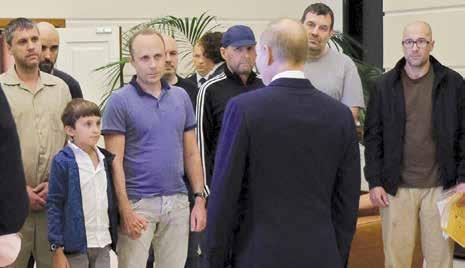
an awkwardness that suggests a boy who grew too fast. He sometimes forgets his backpack in cafes, and he is peculiarly open for someone in his line of work. Pevchikh, who is a good two heads shorter, is organized, relentlessly logical, suspicious of strangers and careful with her words. The two had first connected after Grozev reached out to Navalny on Twitter. Navalny had survived a poisoning attempt that very nearly took his life.
Grozev thought he might have identified the people who had done it.
Along with producer Odessa Rae and director Daniel Roher, Grozev had recently left Ukraine after offending too many powerful people. Together, the three wanted to travel to Germany, where Navalny was recuperating, to make a movie about him and his failed assassins.
The resulting collaboration, called simply “Navalny,” contained the single
greatest scene in the history of documentary filmmaking, an eight-minute sequence in which Navalny, pretending to be an assistant to the head of the Russian secret police, dials one of his failed assassins and gets an unwitting confession out of him. Grozev and Pevchikh are sitting to either side of Navalny, stifling screams of horror mixed with delight.
Weeks after that phone call, Navalny flew back to Moscow and was immediately arrested. A year after that, “Navalny” was winning major awards and heading for an Oscar, and Grozev and Pevchikh were discussing how to leverage that success to secure Navalny’s release.
On that stroll around the reservoir, they came up with a crazy scheme they decided to call Secret Project Silver Lake. They wanted to organize a swap of Russian spies held in Western prisons for Navalny and other Russian political pris-
oners. When Pevchikh got back to where the team was staying, she searched online for “Glienicke Bridge,” a crossing between what used to be East and West Berlin, the site of several prior prisoner swaps, including one that involved four countries and almost 30 people.
It was around this time that Grozev learned that Russia had sent a squad, or squads, of assassins to kill him. Austrian and American authorities warned him not to return to Vienna, where his wife and two children were. I met Grozev around the same time and played a minor role in helping him get situated. Soon, we started meeting every couple of weeks for what I thought would eventually be a profile of him.
James P. Rubin, who was leading a State Department project on Russian disinformation (and who had recently watched “Navalny”), heard about Grozev’s situation and offered a room in his own house.
Grozev moved in and spent the next couple of months explaining Secret Project Silver Lake, which Rubin would eventually take to his boss, Secretary of State Antony Blinken.
On Feb. 24, 2022, Russia launched a full-scale invasion of Ukraine. Pevchikh and her colleagues were alarmed for Navalny: The FSB had already tried to kill him at least once. Whatever was preventing the Kremlin from having him killed in prison — some remnant of concern for Russia’s standing in the world, some semblance of regard for legitimacy — would be gone now.
“If they were bombing Kyiv,” she told me, recounting her thoughts at the time,
“if they were killing tens of thousands of civilians, then murdering Alexei had gone from being a very big thing to being a very small thing.” Secret Project Silver Lake was more urgent than ever.
In the summer of 2022, Pevchikh landed a meeting with Hillary Clinton. Grozev and Pevchikh were impressed — Clinton was, they thought, the first person who really got it. She warned that a plan like this would take years to pull off, but she took the idea to the White House.
President Joe Biden, Blinken and the White House national security adviser, Jake Sullivan, eventually came on board.
They weren’t primarily in it for Navalny, however. They were in it for a former Marine named Paul Whelan, who had gone to Moscow in search of adventure and business opportunities and ended up arrested and sentenced to 16 years for what the Russians called espionage.
In April 2022, Russia had swapped another former Marine, Trevor Reed (sentenced to nine years for supposedly attacking Moscow police officers), for a Russian pilot the United States had convicted of drug smuggling. In December 2022, Russia traded WNBA player Brittney Griner (sentenced to nine years for bringing a vaping pen with marijuana into the country) for arms dealer Viktor Bout. Whelan, who had been in custody longer than Reed or Griner, fell by the wayside both times.
To give up someone accused of espionage, the Russians would need a bigger reward. Someone like Krasikov, a Russian who was serving a life sentence in Germany for carrying out a political assassination in the middle of the day in a Berlin park.
Americans had previously gauged German interest in releasing Krasikov in exchange for Whelan. Germany had said no — a rare and painful rejection for the White House, and one that made it all that more unlikely that Secret Project Silver Lake could succeed.
But in March 2023, the terrain shifted again.
Russian authorities arrested Evan Gershkovich, a reporter for The Wall Street Journal, and charged him with espionage.
The last time Russia had arrested an American journalist was in 1986, when it accused U.S. News & World Report correspondent Nicholas Daniloff of espionage. It was an obvious response to the U.S. arrest of a Russian employee of the United Nations a few days earlier, and it took only a few more weeks for the two of them to be exchanged, with two Soviet
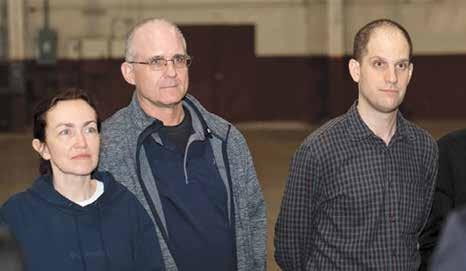
dissidents thrown in.
For Secret Project Silver Lake, Gershkovich’s arrest presented an opportunity of sorts — for the White House to approach Germany again. Grozev kept telling any official who would listen that Germany would be more receptive if Navalny, a hero in that country, were also part of the package. Grozev had another card to play: His own investigative work had played a crucial role in identifying Krasikov as the man who conducted that
ly makes all important decisions, but no one knows who has enough access to him to pose the questions. So Grozev tried to find his own ways in, through Russian intelligence contacts he had developed while attempting to find his would-be assassins.
In the summer of 2023, Grozev reached out to a spy — someone whom he says was trained from childhood for a career in espionage. Grozev suspected the man of being one of his potential
To give up someone accused of espionage, the Russians would need a bigger reward.
assassination in the Berlin park. Grozev’s own testimony had helped put him behind bars. If Grozev signaled that he was in favor of the swap — despite the possibility that Krasikov, once released, might retaliate — the Germans might be more willing to consider it.
Rubin summed up the German dilemma as “moral imperative versus moral hazard.” The moral imperative was to save hostages. The moral hazard was the danger of establishing precedent by releasing an assassin, one who had acted brazenly on German soil. Even inside the German Cabinet, there was no agreement.
Then there was the question of how to conduct the negotiations. Standard diplomatic channels are too inflexible for such a complicated deal. The Russian government is a black box. Everyone knows that President Vladimir Putin personal-
campaign of her own. As her son’s colleagues at the Journal have written, she was shuttling all over the world, finding ways to meet with top U.S. and German officials, with the goal of convincing them to broker her son’s release.
By February 2024, the White House was finally, fully behind the idea of negotiating a deal. An existing channel — already used to execute the Reed and Griner transfers — “on the intelligence side of the house,” in Washington-speak, was activated. It appeared that the Kremlin had agreed to a trade that would involve Gershkovich, Navalny and several other Russian dissidents. Grozev and Pevchikh, in Munich for an annual security conference, were ecstatic. On the evening of Feb. 15, they debated whether to buy Champagne or hold off until the trade had happened. Out of superstition, they decided to hold off.
Late that night, Pevchikh suddenly blurted out a terrifying question: “But what if they kill him?”
That’s silly, Grozev told her. There is a protocol, a way these things are done. Pevchikh later told me that she had no idea why she even asked what she asked: It wasn’t a fear she was aware of experiencing. The next day, the world learned that Navalny had died in a Russian prison.
Millions of Russians lost their hope for the future. Grozev and Pevchikh lost their friend.
assassins but also of being able to help negotiate a swap.
Pevchikh wouldn’t hear of Grozev meeting with the spy directly. So they dispatched Rae, the producer of “Navalny,” an American former actress who has never met an adventure that scares her.
I was having lunch with Grozev when Rae was off in a European country meeting with the spy. Grozev was fretting because he hadn’t heard from her in hours. Then she called. She’d been dining with the spy. He was charming, she said, and didn’t seem like an assassin at all. “She has been Stockholm-ed,” Grozev said, referring to the fictional syndrome that supposedly makes hostages love their captors. The spy promised to take the proposed prisoner-exchange proposal to Putin. It’s not clear whether he did.
At the same time, Gershkovich’s mother, Ella Milman, was mounting a
A week earlier, in an interview with Tucker Carlson, Putin had made his first reference to a possible swap, suggesting that Gershkovich could be traded for “a person who, out of patriotic sentiments, liquidated a bandit in one of the European capitals” — meaning Krasikov. Now, Grozev and Pevchikh wondered: By making Navalny’s release a condition of the swap, had they hastened his death? And did this mean that naming any other Russian dissidents would hasten their death, too? But Navalny was in a class by himself. No one else scared Putin as much. And anyway, by now the process was out of Grozev’s and Pevchikh’s hands. The government negotiators had taken over.
In October 2023, Russia took hostage another American journalist, Alsu Kurmasheva, who worked for Radio Free Europe/Radio Liberty in Prague. Kurmasheva, who is also a Russian national, had been visiting her ailing mother. The journalist was sentenced to 6 1/2 years for spreading false information about the Russian armed forces.
Russia was also taking German hostages, including Kevin Lik, an 18-year-old
high-school student who also holds Russian citizenship and was sentenced to four years in prison for high treason. Late last year, Belarus, Russia’s closest ally, arrested Rico Krieger, a former employee of the German Red Cross, and sentenced him to death for what the government called terrorism. In the face of a death sentence, the moral-hazard argument could no longer hold up.
On Thursday, a Russian plane carrying 16 people, among them Americans, Germans and Russians, landed in Ankara, Turkey. In exchange, Russia got Krasikov, along with a Russian hacker and a Russian businessperson convicted of insider trading, both of whom had been serving time in the United States, and five convicted or suspected spies, released by the United States, Norway, Poland and Slovenia. Grozev’s investigative work had played a key role in identifying several of the spies.
The three Americans posed for a photo with an American flag. They looked as one would expect: happy and emaciated. A neat stack of sandwiches was waiting on what appeared to be a conference table behind them. Then they and Vladimir Kara-Murza, a journalist and political activist who had survived two assassination attempts before being sentenced to 25 years for high treason, flew to the United States.
The freed dissidents are Ilya Yashin, an opposition politician sentenced to 8 1/2 years for “spreading false information about the Russian armed forces”; Oleg Orlov, a 71-year-old human-rights activist sentenced to 2 1/2 years for “discrediting the Russian armed forces”; Aleksandra Skochilenko, an artist sentenced to seven years for “spreading false information”; Andrei Pivovarov, an activist sentenced to four years for being a member of what Russia calls an “undesirable organization”; and three former heads of regional chapters of Navalny’s organization, all of them sentenced for “extremist activities” — Ksenia Fadeyeva and Vadim Ostanin, who were serving nine years each, and Lilia Chanysheva, who had been sentenced to 9 1/2 years. These charges, like the espionage charges against Gershkovich, are often described as “trumped up.” This is wrong: It implies that the former inmates didn’t commit the acts of which they were accused.
In fact, they did. They organized politically. They practiced journalism.
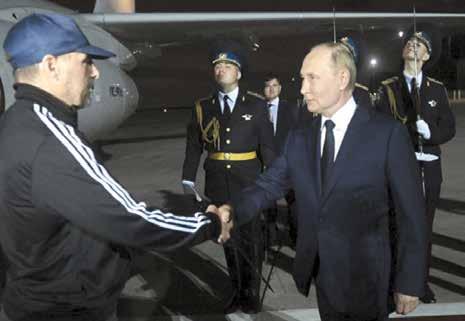
ing of those held hostage,” he messaged me. “A good deal is the best outcome one can hope for in a really bad situation.” Grozev is less sanguine. In the long run, he is convinced, the risk to Russian dissidents, those the Kremlin perceives as enemies of the state, and random Westerners who may be within reach of Russia or Belarus is greater now than it was before the swap. “The ability to instrumentalize each arrest in Russia or Belarus” raises the risk of the next round of arrests, he said. The apparent rescue of a Russian assassin and several spies, he explained, delivers on Moscow’s promise to its agents that they can always come home — and that raises the risk of future assassinations.
They called the war in Ukraine a war, rather than a “special military operation.” Skochilenko replaced price tags in a St. Petersburg store with miniature notes containing information on the number of civilian casualties in Mariupol, a Ukrainian city then under siege by Russian forces. All of this is illegal under Russian law. Espionage or high treason,
claim publicly to have policies, of not engaging with these kinds of systems for fear of encouraging further hostage-taking. “A lot of red lines have been crossed,” Grozev acknowledged when I talked with him on the morning of the swap. The Germans, in particular, violated long-standing policies. The British government did not take part in the ex-
The people released Thursday were arrested under laws specifically created to make it possible to arrest almost anyone — to build a legalistic framework for hostage-taking.
for example, is defined as the gathering of any information — classified or not — for distribution to any foreigners, regardless of whether they work for a government. Any foreign correspondent working in Russia is, by Russia’s definition, engaged in espionage. Any journalist covering the war in Ukraine could be charged with “spreading false information about the Russian armed forces.”
I am one of those journalists. I was recently convicted of this crime in absentia and sentenced to eight years in prison.
The people released Thursday were arrested under laws specifically created to make it possible to arrest almost anyone — to build a legalistic framework for hostage-taking.
Many states have policies, or at least
change, even though one of the hostages has a British passport. But as far as the Kremlin is concerned, Washington’s position represents all of the West. Does this mean that all Western countries — their citizens and the hundreds of thousands of Russians living in exile — are now at greater risk?
I asked Joel Simon, director of the Journalism Protection Initiative at the Craig Newmark Graduate School of Journalism at the City University of New York, where I also teach, how to think about this. Simon spent 16 years at the helm of the Committee to Protect Journalists and wrote a book called “We Want to Negotiate.” “Refusing to negotiate or ‘make concessions’ will not cause hostage-taking to disappear and will only lead to the suffer-
For Grozev himself, the risk is more specific. The man he had helped put behind bars had been welcomed back to Moscow by Putin himself, with a warm embrace at the bottom of aircraft steps. “I don’t know how I feel about Krasikov being free,” Grozev said. “He stared at me in court.” The moral hazard of this swap may translate into mortal danger for the people who made it possible.
One of the people who made it possible was Alexei Navalny. If he had not been arrested, Grozev and Pevchikh wouldn’t have concocted Secret Project Silver Lake. If he had not died, the swap would most likely have never happened. Putin would probably never have let him go free. “This should have been such a happy day,” Pevchikh said to me. “But,” she paused. “This ‘but’ is as big as Earth itself.” Compounding Pevchikh’s sense of loss is the fact that three of Navalny’s lawyers and one of his fellow activists who stood trial alongside him — “the only people who had access to Navalny for the last three years of his life,” she said — remain in prison, as do hundreds of others sentenced for journalism, activism and truth-telling. Now that Russia has extracted its agents, the West has less to offer it in exchange for these hostages. Nor is it likely to try, if my conversations with Washington officials involved in this swap are any indication. For them the Russian dissidents were something of an afterthought, an addition forced by Grozev and Pevchikh — and, eventually, by Navalny’s death.
And yet, 16 people have joined the rest of us on this side of the Russian border. Unlike Russia’s spies and assassins, they will never be able to go home again. But at least they can live and speak freely despite the targets on their backs.

By Avi Heiligman
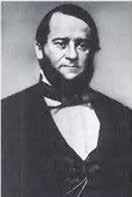


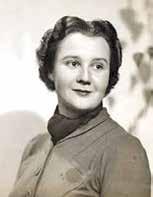
War is unpredictable. From surprise attacks to outnumbered, outgunned troops gaining a strategic victory, the battlefield can be full of mysteries. Soldiers from wars of the past have come back with tales of strange events. These range from usage of animals in warfare to eccentric individuals in battle to peculiar battlefield engagements. Here are some strange but true stories from military history.
Ancient battles were often recorded by historians years after the battle ended. The details surrounding the peace agreement between the Medes and the Lydians at the Battle of Halys were written down by the Greek historian Herodotus. The engagement took place in the 6th century BCE and became known as the Battle of Eclipse. Herodotus describes the battle, “As, however, the balance had not inclined in favor of either nation, another combat took place in the sixth year, in the course of which, just as the battle was growing warm, day was on a sudden changed into night.” This changing into night has been described as a solar eclipse although some modern scholars think it may have been a dusk-time lunar eclipse. In either case, the eclipse caused both sides to stop the battle and agree to a peace deal.
The first major battle of the American Civil War took on July 21, 1861, just north of Manassas, Virginia. Called the First Battle of Bull Run – the South named it the Battle of First Manassas – the Con-
federate Army under General Beauregard defeated the Union Army under General Irvin McDowell. This was the engagement in which Confederate General Thomas J. Jackson earned fame and the nickname “Stonewall” because he stood his ground as his men were being pushed back. Beauregard’s headquarters were in the house of Wilmer McLean, who was a local wholesale grocer. A cannonball went through the kitchen fireplace, and McLean after the battle decided to move to a safer location. The area that he chose was none other than Appomattox Court House, Virginia.
In early April 1865, Charles Marshall, an aide to Confederate General Robert E. Lee, knocked on McLean’s door. Marshall was looking for place for Lee and another general to meet. The first place McLean showed the aide was falling apart so he reluctantly agreed to have his own house to be used for the meeting. Lee showed up first and waited for the other general, who was none other than Union commander Ulysses S. Grant. It was during this meeting that Lee surrendered to Grant. McLean was to have said, “The war began in my front yard and ended in my front parlor.” He was right to have been concerned about having the meeting in his house, as generals and soldiers took souvenirs away from the meeting (although some paid for the relics).
All types of animals have been companions of soldiers both on and off the battlefield. Many have saved their han-
dlers or other soldiers from attacks from the enemy, including the indomitable Sergeant Stubby. Stubby was a Boston terrier that was adopted by the 102nd Infantry Regiment, 26th Division during World War I. He was found on the grounds of Yale University and became close to Corporal Robert Conroy. Stubby was hidden underneath Conroy’s overcoat when the outfit shipped out, and the commanding officer let the dog stay with the unit after Stubby saluted his superior officer. He was with the regiment for 18 months and seventeen battles.
Stubby was wounded by German hand grenades and injured during a gas attack. After recovering, he was fitted with a special gas mask and became adept at learning when the Germans were to launch gas attacks. Hearing the whine of an incoming shell before humans could hear it, Stubby warned his unit of an attack and to take precautions. Several of the soldiers were sleeping and Stubby was credited with saving many lives. Stubby was given a battlefield promotion after capturing a German spy himself by biting him until American soldiers came and took him prisoner. Wounded soldiers were often comforted by Stubby’s presence, and he led soldiers back to American trenches when they became disoriented.
Spies and saboteurs during World War II came from all backgrounds. Ursula Graham Bower was a British anthropologist studying an ethnic group in
the Naga Hills on the border of India and Burma. After the Japanese invaded Burma in 1942 and were threatening to attack Allied positions in India, the British military asked Bower to help them report on Japanese troop movements and to rescue downed pilots. Bower then went on to organize a group of 150 Nagas into a guerilla force. She led the Nagas into ambushing Japanese troops using her Sten gun. The guerillas developed a warning system where if one of them saw something, then the others would be warned of the danger as soon as possible. In this way, they avoided Japanese detection while rescuing downed pilots and helping thousands of evacuees and escaped prisoners from Burma reach friendly Allied lines in India. Intelligence from the Nagas, also called the Bower Force, helped defeat the Japanese in India in 1944. Bower went on to teach other soldiers jungle survivor skills. Bower was an unusual but effective guerilla leader, and the British rewarded her by making her a Member of the Oder of the British Empire.
These unusual incidents and participants are just some of the myriad of strange but true stories from military history.
Avi Heiligman is a weekly contributor to The Jewish Home. He welcomes your comments and suggestions for future columns and can be reached at aviheiligman@gmail.com.
MAJOR APPLIANCE REPAIR
Servicing Washers , Dryers , Refrigerators , Dishwasher, stoves
All work guaranteed. Call 718 3762288
VACUUM SALES AND REPAIR
All areas call Max Flam 718-444-4904
THE LEATHER SHOPPE
The spot for all your custom leather Judaica. Tallis/tefillin bags, lulav and esrog bags, havdallah sets, challah covers, shtenders, pesach sets, matzah/afikomen bags. WhatsApp: (732) 523-0007 or email: theleathershoppe732@gmail.com for a full catalog. We ship.
MY MOTTO IS DON’T WAIT TO buy real estate
Buy real estate and wait
Your realtor for life 516-784-0856 Alexandra at Realty Connect USA
PEACEFUL PRESENCE STUDIO
Men’s private yoga, Licensed Massage & Holistic Health Guidance 436 Central Ave, Cedarhurst Info. & free video training www.peacefulpresence.com 516-371-3715
READING SPECIALIST
Trained in Orton Gillingham and many multisensory reading programs. Specializes in dyslexia and auditory processing disorder and other reading difficulties.
Rhess.education@gmail.com
Call or Text (516) 220-2059
GERBER MOVING
FULL SERVICE MOVING
Packing Moving Supplies
Local Long Distance. Licensed Insured
1000’S Of Happy Customers
Call Shalom 347-276-7422
HANDYMAN AVAILABLE
For big or small jobs, Sheetrock, carpentry, painting, electrical, plumbing, install & repair appliances
Call Ephraim at 347-593-4691
MANAGEMENT STAFF WILL ASSIST you with: * Obtaining Medicaid and Pooled Income Trust
* In-home Assessments, Individual and Family Counseling
* Securing reliable home care assistance
* Case and Care Management services
Dr. S. Sasson, DSW, LCSW (718) 544- 0870 or (646) 284-6242

HAIR COURSE: Learn how to wash & style hair & wigs. Hair and wig cutting, wedding styling Private lessons or in a group Call Chaya 718-715-9009
ZEVIZZ WOODTURNING JUDAICA Challah knifes, batei mezuzah, besamim holder, kiddish cups, havdalah candle holders, yad for sefer torah, pens, stenders, bowls and more 952-356-2228
DON’T GET STUCK WITH A TWO STORY HOUSE YA KNOW, IT’S ONE STORY BEFORE YOU BUY IT BUT A SECOND STORY AFTER YOU OWN IT!
Call Dov Herman For An Accurate Unbiased Home Inspection
Infrared - Termite Inspection Full Report All Included NYC 718-INSPECT Long Island 516-INSPECT www.nyinspect.com
WOODMERE Beautiful, brick, colonial boasting 5 bdr 3.5 Bth in pristine condition. Excellent location, near all! Move right in! RCUSA 516-512-9626
WOODMERE Introducing a stunning 14-side hall colonial home in the Hewlett Woodmere School District. Formal living room, formal dining room, den with a skylight. Eat in Kitchen, two sinks, a double oven, a warming draw and a microwave. First floor bedroom, a full bathroom and laundry room. Two-car garage. Upper level has four bedrooms, two full bathrooms. Finished basement with playroom, storage and utilities. Well-groomed exterior with porch adjoining the master bedroom. Hardwood floors and back patio. Central air conditioning, inground sprinkler system, alarm system. Close proximity to schools, shopping centers, restaurants, and transportation options. Mark Lipner Associate Broker Berkshire Hathaway Laffey International 516-298-8457 mlipner@bhhslaffey.com












CAN’T AFFORD YOUR PROPERTY TAXES?
MORTGAGE?
Must sell for any reason? Call for FREE Consultation. Call now 212-470-3856 Cash buyers available!
Spacious home within school district 14 with exquisite upgrades and central air conditioning, splendid kitchen with dual sinks, five bedrooms. Main level encompasses a spacious great room, office space, complementing the formal living and dining areas. Unfinished basement, detached garage. Expansive lot, measuring 80 x 100. Conveniently located near shopping, railroad, restaurants and places of worship.
Mark Lipner Associate Broker Berkshire Hathaway Laffey International 516-298-8457 mlipner@bhhslaffey.com
CEDARHURST
Don’t miss this opportunity!
4 Bedroom 21/2 Bathroom House Perfectly located in Cedar Bay Park, walking distance to all. Oversized property for expansion, A Must See. LOCATION, LOCATION. For More Info call (516) 881-7727 Leave Message
Entrance off gourmet glatt lot, second floor, shared bath, ideal for therapist/ office work, includes utilities, $600. Call 516-371-3715
5 TOWNS — OFFICES FOR LEASE Attractive Pricing! 1500sf loft office (formerly SDF Architect) Cedarhurst 2&3 Office Suites Store/office; ~600sf Cedarhurst office ~100sf Also… Large Parking Lot & Storage available Utilities, Internet & Parking incl. with some Kosher kitchen — Minyan Next to LIRR — No broker fee Call/text/Whatsapp: 516-206-1100
BIG FULLY RENOVATED, Woodmere, spacious 4bedroom 2 full bath split level.2 car garage +driveway. Backyard on water SD#14. W&D. Tons of storage space. 347-517-3552
Teaching Position Zareinu is hiring for the 24-25 school year. Looking for a qualified teacher to teach a modified English curriculum! for a small group of 3rd grade girls in Far Rockaway. Great Pay! Warm environment! Great administrative support! Email resume: jlepolstat@zareinu.org or call 516-993-2142
SEEKING ELA TEACHER
Teaching position for Gr. 6. Mon.-Thurs., afternoon hours. Far Rockaway/5T area. Great salary, warm, supportive environment. Training in our curriculum is provided. Teachersearch11@gmail.com
FULL TIME ADMINISTRATIVE
Assistant Join the Zareinu team! Seeking a detail-oriented individual Will provide support to our administration, staff and parent body. Responsibilities: managing office tasks, setting up appointments, maintaining records, and assisting with communication between our staff and with the different schools that host Zareinu. Strong communication and computer skills. Competitive salary!! RSVP: jlepolstat@zareinu.org

Assistant Teachers Needed in Lawrence for Fall, 2024
The Gural JCC Early Childhood Center is hiring Assistant Teachers for the 2024-2025 school year.
Please send resumes to JCC.Nursery@guraljcc.org or call (516) 239-1354
Tutoring regents in Algebra and Geometry A Darchei Torah instructor. Guaranteed results
Text 347-491-8045
WhatsApp 347-767-1755
SEEKING ASSISTANT teachers for elementary General Studies classes for ‘24-’25 school year. Candidates should have skills to take over for teachers if needed. M-Th, PM hours, strong support. Far Rockaway area. Send resume to teachersearch11@gmail.com
Excellent growth potential, Frum environment, Excellent salary & benefits. Email resume to: resumetfs1@gmail.com
DELIVERY PERSON NEEDED to deliver this Newspaper every Thursday morning to locations in Brooklyn. Must have Mini van or SUVand availability to work Consistently every week. Good pay
Please email gabe@ fivetownsjewishhome.com or call (917) 299-8082
Must know how to use Mac and work on Mac. knowledgeable in Adobe, illustrator, in design, and Photoshop. Part-time job 15 to 20 hours a week. must come into our office and Flatbush for interview. Email résumé to graphicdesigner613@gmail.com. For more info, please call: 9177018012
5 Towns area Nursing Home management office seeking a Regional/Corporate level MDS Nurse to work in our office. Must be an RN. Regional experience preferred. 2-3 years MDS experience with good computer skills required. Position is Full Time but Part Time can be considered. Great Shomer Shabbos environment with some remote options as well. Email: officejob2019@gmail.com
HEAD ENGLISH, AFTERNOON Teaching Position
Zareinu is hiring for the 24-25 school year. Looking for a qualified teacher to teach a modified English curriculum! for a small group of 4th and 5th grade girls in Far Rockaway. Great Pay! Warm environment! Great administrative support! Email resume: jlepolstat@zareinu.org or call 516-993-2142
HEAD MORAH, MORNING POSITION Zareinu is hiring for the 24-25 school year. Looking for a qualified head Morah afternoon position! Looking for a qualified teacher to teach a modified Limudie Kodesh curriculum. for a small group of 4th and 5th grade girls. Great Pay! Warm environment! Great administrative support! Email resume: jlepolstat@zareinu.org or call 516-993-2142

SHEVACH HIGH SCHOOL
The Bais Yaakov High School of Queens, seeks experienced Ivrit teacher. Please send resume to cabramchik@shevachhs.org
TEACHER, MORNING and Afternoon Positions
Join our Specialized team at Zareinu. Looking for a warm and caring teacher assistant to work with an experienced teacher in a small 3rd and 4th grade girls’ class in a Beis Yaakov in Far Rockaway. Great Pay! Great Opportunity! Warm environment with administrative support! Email resume: jlepolstat@zareinu.org or call 516-993-2142
SPECIAL ED TEACHER
HASC seeks Special Ed Teachers for our Early Learning Program. Warm, supportive and enjoyable working environment. Great Pay and Benefits! Sign on Bonus! Referral Bonus! Please email resume to jobswd@hasc.net
A multi-tasker needed for general office work. The ideal candidate is someone who is detail-oriented, responsible, and can take ownership. Looking for someone who is eager to learn, and expand his/her skill set while possessing the ability to work independently and as part of a team. Experience with Excel required. Five Towns location. In-office position only, not remote. Please send resume to 5tpart.timecareer@gmail.com

CONSTRUCTION COMPANY
Located in Far Rockaway is looking to hire a female to be project manager in office. Email resume zrilly@hireexteam.com
A YESHIVA IN QUEENS
is looking for an experienced part/ full time secretary, 2-year-old morah, kindergarten morah, kindergarten morah assistant and Pre-1A English teacher for the 2022-2023 school year. Nice and timely pay. Please email resume to mshelt613@gmail.com or call/text 718-971-9799.
5 TOWNS BOYS YESHIVA
Seeking Elem Gen Ed Teachers Excellent working environment and pay. Only lic/exp need apply. Email resume to yeshivalooking@gmail.com
YESHIVAT KOL YAAKOV
In Great Neck, NY, is seeking general studies teachers for both the elementary and middle schools, for the upcoming academic year. Mon-Thur afternoons. Competitive salary, warm and supportive environment. Send resume to m.kalati@kolyaakov.org
NEFESH MATCHMAKING (Chesed) Free Shadchan service for the special needs community. We help those with Medical, Physical, Emotional or Intellectual challenges find their spouse. Strictly confidential. Email for more info. Nefesh.matchmaking@gmail.com
SHMIRAS HALASHON
Text 516-303-3868 with a time slot of your choice to be careful on lashon hara. Be a part of the 1,000 people for klal yisroel!
By Rivki D. Rosenwald Esq., LMFT, CLC, SDS
We usually think in time slots of seven days and four weeks. But this time of the year, that all changes. We are suddenly talking in three weeks and nine days.
Of course, to most people, we sound nuts – then again, don’t we often?!
We say, “Today’s a fast day.”
They are thinking, “What makes it a fast day?” They actually felt it crawled by.
We say, “It’s almost New Years!”
They’re thinking, “What’s going on? Have they moved New Years to Labor Day?”
We say, “Passover is late this year.”
They’re thinking, “Only people can be late, not inanimate objects or experiences.”
They say, “Why’d you need a shotgun to make you commit?”
We happen to have our own times and traditions. It makes sense to us; however, it leaves others completely confused.
We say, “I keep Shabbos.”
They say, “I keep pets.”
We say:
“I wait six hours.”
“I wait five.”
“I wait into the sixth hour.”
“I wait three!”
“I only wait one!”
It all makes sense to us.
And they say, “What in the world are you waiting for?”

So, remember, during this very meaningful nine-day period, we should judge others favorably.
We may not always understand them,
It all makes sense to us. And they say, “What in the world are you waiting for?”
We say to some guys, “Where’s your kippah?”
They say, “I’m not supposed to be my brother’s keepa.”
We say, “I love eating cholent!” They look surprised, and say, “Why would anyone chew lint?!”
We serve gefilte fish.
They say, “We are avid fishermen, and there’s no such thing as a gefilte fish.”
We say, “We met through a shadchan.”
On Saturday nights, we happen to put wine in our ears and on our eyes and in our pockets.
They think: forget osmosis – just drink it!
We cover and refuse to embarrass bread!
They think – wait… Who knows what in the world they are thinking of this one!
We do a lot of interesting things that leave others wondering. Yet, bottom line is these traditions and practices all have meaning and enhance our lives.
the same way others don’t understand us, but they may have their history and reasons for doing what they do that we just don’t understand.

